Here’s our look at the Trump administration and the rest of Washington:
- Anthony Scaramucci is forced out just 10 days after being named incoming White House communications director
- White House says Trump is fully confident in his Cabinet, apparently including Atty. Gen. Jeff Sessions
- Trump swears in retired Gen. John F. Kelly as his new chief of staff
- The most notable firings and resignations in the Trump White House
- Share via
Trump called him “my African-American.” But he has few kind words for the president.

On the day that changed his life, Gregory Cheadle almost stayed in bed.
He was tired — he traveled a lot in his long-shot bid for Congress — but asked himself: How often does a candidate for president come to the far reaches of Northern California? And why pass up a crowd and the chance to hand out more fliers?
So Cheadle roused himself that June 2016 morning and secured a spot up close when Donald Trump swooped in for a rally at Redding’s municipal airport.
It was hot, the atmosphere was loose and Trump’s patter seeming more stand-up comedy than campaign spiel. He went into one of those sidelong digressions, about protesters and an African American — “great fan, great guy” — and, by the way, whatever happened to him?
It was then, Cheadle said, he raised his hand and jokingly shouted, “I’m here.”
Trump looked and pointed, his voice a throaty rumble. “Look at my African-American over here!” he exclaimed. “Are you the greatest?”
In the days and weeks that followed Cheadle was attacked on social media and harassed by people who dug up his phone number and email address. For a time he stayed home, too nervous to venture outside.
All, he said, because the media portrayed him as something he was not and never has been: a Trump sycophant.
- Share via
Trump quietly signs Russia sanctions bill
President Trump quietly signed legislation Wednesday that imposes new sanctions on Russia and limits his ability to remove them, according to two White House aides.
Trump signed the bill without cameras or an immediate press release. He had opposed imposing new sanctions on Moscow but had little choice after a nearly unanimous Congress approved the bill, guaranteeing they would override a veto.
The bill, which also imposes new sanctions on Iran and North Korea, prevents American companies from investing in many energy projects that are funded by Russian government interests.
It also prevents Trump from unilaterally lifting the sanctions. It thus marked an unusual move by Congress to tie the president’s hands on foreign policy.
Trump did not want to give up that leverage.
But the vote in Congress was a strong sign that lawmakers do not trust Trump to stand up to Russian President Vladimir Putin, whom Trump has repeatedly praised, and the widening federal investigation into possible coordination last year between his presidential campaign and Moscow.
Passage of the sanctions bill already has sparked a harsh reaction in Moscow.
Putin announced last week that the United States would need to shed 755 personnel, including U.S. diplomats, from its embassy and consulates in Russia. President Obama expelled 35 Russian diplomats, said to be spies, from the United States last December.
A White House aide said a statement would be issued later Wednesday.
- Share via
Senior GOP senators serve notice: No action on healthcare at this point
Trump administration officials continue to push the Senate to take another run at healthcare legislation, but on Monday senior Republican senators pushed back, making clear that they’re done with the topic for now.
“There’s just too much animosity and we’re too divided on healthcare,” Sen. Orrin G. Hatch (R-Utah), the head of the Senate Finance Committee, said in an interview with Reuters.
“I think we ought to acknowledge that we can come back to healthcare afterward, but we need to move ahead on tax reform,” Hatch said.
His remarks were quickly followed by others in GOP leadership positions.
“I think it’s time to move on to something else,” Sen. Roy Blunt of Missouri told CNN. “If the question is do I think we should stay on healthcare until we get it done, I think it’s time to move on to something else.”
Sen. John Thune of South Dakota also chimed in. “Until someone shows us how to get that elusive 50th vote, I think it’s over,” he told reporters.
The remarks seemed a coordinated effort to respond to administration officials, including budget director Mick Mulvaney and Health and Human Services Secretary Tom Price, who said over the weekend that they wanted the Senate to keep working on healthcare.
Last week, the Senate defeated several different Republican plans to repeal all or part of the Affordable Care Act. The votes made it clear that with unified Democratic opposition to repeal, and divisions among Republicans, the campaign to overturn the law has stalled out, at least for now.
Congress faces several other pressing issues that will be demanding lawmakers’ attention, including deadlines at the end of September to raise the federal debt ceiling and fund government agencies for the coming fiscal year. And the administration is eager to move on tax proposals, with officials rather optimistically saying they hope to see votes by November on a tax package that is not yet written.
- Share via
Good news for Atty. Gen. Sessions: Trump has ‘100% confidence’ in Cabinet
President Trump has called Atty. Gen. Jeff Sessions “beleaguered” and even “VERY weak,” but Sessions seemed to get good news from the White House press secretary, Sarah Huckabee Sanders, on Monday.
Trump has “100% confidence” in all of his Cabinet secretaries, Sanders said in response to a question about Sessions’ job status during the daily White House briefing.
Last week, when speculation about Sessions was rife, Sanders repeatedly declined opportunities to provide assurances that the attorney general enjoyed the president’s full confidence. Trump himself said “time will tell” when he was asked last week about Sessions.
The willingness to tamp down speculation about Sessions may reflect the arrival Monday of retired Gen. John F. Kelly as the new White House chief of staff. He is tasked with restoring order to the administration.
Sanders also batted down reports that the White House was discussing moving Sessions to another post, as secretary of Homeland Security. That job became vacant Monday after Kelly was sworn in as Trump’s new chief of staff.
Sanders said the White House has had “no conversations” about any Cabinet members switching jobs.
Republican senators have publicly opposed firing Sessions, and a couple have objected to shifting him to another post as well, given that it could appear that Trump is trying to affect the investigations of himself and his campaign in the context of Russia’s election interference.
Trump has said publicly that his frustration with Sessions, once among his closest allies, stems from Sessions’ decision to recuse himself from the Russia investigation, an act that led to the appointment of a special counsel.
- Share via
Can Trump really cut health insurance payments for members of Congress and their staff? It would be easy
Reeling from the failure to repeal the Affordable Care Act, President Trump now threatens to block federal funding that lawmakers and their staff rely on to help buy health insurance.
Trump’s threats are not empty. The administration could simply stop the payments -- which are provided to Capitol Hill lawmakers and staff much the way many employers help pay employees’ monthly insurance premiums -- by dashing off new federal regulation.
But the easy attack on lawmakers skims over what many say was a complicated, but fair-minded, compromise made during the Obamacare debates several years ago.
Under Obamacare, if lawmakers want insurance through their employer - the federal government - they are required to buy policies through the ACA exchanges.
There had been great criticism at the time, largely from opponents of the healthcare bill, that lawmakers and congressional staff should not be exempt from the law. The argument was they should have to live under it. So they did.
Usually those buying individual insurance on the exchanges can apply to see if their income and geographic area allow them to qualify for a federal subsidy. For lawmakers, though, that was prohibited. Instead, they get the regular employer contribution they did before, much in the same way other workers do when their companies buy insurance.
For federal workers, the government covers about 70% of the costs, about the same paid by employers in the private sector, according to Kaiser Family Foundation.
The administration affirmed that federal support for lawmakers and their staffs in an Office of Personnel Management regulation issued in 2013.
To cut those funds off, Trump administration could simply reverse course, and issue another regulation changing the rules.
Trump appeared ready to do so in a series of weekend tweets.
“Why should Congress not be paying what public pays,” Trump tweeted over the weekend. “If a new HealthCare Bill is not approved quickly, BAILOUTS for Insurance Companies and BAILOUTS for Members of Congress will end very soon.”
But such a move would likely cause an uproar in Congress. It’s not just members of Congress, but also their staffs, who would have to pay full price for their insurance.
Stopping Trump’s action, though, seems tough. It would require Congress to pass legislation ensuring the federal payments would continue to be made. Few lawmakers would likely take up that cause. And even if Congress were able to pass a bill protecting the payments, it seems doubtful Trump at this point would sign it into law.
- Share via
U.S. hits Venezuelan President Nicolas Maduro with sanctions

The Trump administration has hit Venezuelan President Nicolas Maduro with financial sanctions.
The move comes after Venezuela held a weekend election that will give Maduro’s ruling party virtually unlimited power in the South American country.
The Treasury Department’s Office of Foreign Assets Control announced the sanctions against Maduro in a brief statement on Monday, a day after the Venezuelan vote to elect a constituent assembly that will rewrite the constitution. A longer explanation from the White House was also expected.
The administration imposed sanctions on more than a dozen senior current and former Venezuelan officials last week, warning the socialist government that new penalties would come if Maduro went ahead with Sunday’s election for the assembly.
- Share via
Watch live: Anthony Scaramucci’s removal addressed at White House news briefing
- Share via
Anthony Scaramucci is out as White House communications director
Anthony Scaramucci, the brash New Yorker who was announced little more than a week ago as President Trump’s White House communications director, was ousted Monday before he had even officially taken the job.
John F. Kelly, the newly sworn-in White House chief of staff, told Scaramucci around 9:30 a.m. EDT that he was going to be replaced, according to a person close to White House.
In a statement officially announcing the move, the White House said Scaramucci “felt it was best to give Chief of Staff John Kelly a clean slate and the ability to build his own team.”
While Scaramucci’s time at the center of the president’s circle was short, it was consequential, prompting the resignations of first Sean Spicer as White House press secretary and then Reince Priebus as chief of staff.
The most notable firings and resignations in the Trump administration >>
A former hedge fund executive on Wall Street, Scaramucci, who enjoyed media attention, also had come on strong stylistically, highlighted by a profane tirade against colleagues Priebus and Trump strategist Steve Bannon in an exchange last week with a New Yorker reporter.
The abrupt shift in Scaramucci’s status seemed to reflect Kelly’s mission to bring order to the chain of command within the chaotic administration.
In getting Scaramucci to leave, Kelly was undoing Trump’s own hiring decision. Scaramucci had told reporters when he was hired that he would be reporting directly to the president at Trump’s request, bypassing the normal chain that would have the communications director -- like all staff -- report to the chief of staff.
Scaramucci’s unusually short tenure reflects a moment of extreme turbulence in the White House, which has been embroiled in infighting as it confronts low poll numbers for the president, a floundering legislative agenda and the investigations involving Russian meddling in last year’s presidential election.
After word spread of Scaramucci’s ouster, Spicer, who resigned when Scaramucci took over but was still working in the White House, walked out of his office to a throng of reporters.
“Is this a surprise party?” he asked.
UPDATE
12:15 p.m.: This story has been updated throughout with additional details and background.
This article was originally published at 11:49 a.m.
- Share via
Trump swears in John Kelly, says ex-secretary of Homeland Security will do ‘an even better job as chief of staff’
President Trump swore in his new chief of staff, John F. Kelly, on Monday morning, formalizing a shake-up in his top ranks that was announced Friday evening with word of the resignation of Reince Priebus.
“We look forward to - if it’s possible - an even better job as chief of staff,” Trump said to Kelly, formerly the secretary of homeland security.
“I’ll try, sir,” Kelly replied.
Trump is hoping that Kelly, a retired general, will retool and bring order to a White House that has struggled with low poll numbers, staff infighting, a faltering legislative agenda and an investigation into Russian election meddling and potential collusion and obstruction of justice.
Yet Trump said the administration “has done very well” after a reporter asked what would be different under Kelly. He cited the unemployment rate, the thriving stock market and unnamed polls that, he said, show high business confidence.
“We’re doing very well. We have a tremendous base,” he said.”The country is optimistic. And I think the general will just add to it.”
Trump praised Kelly’s performance at the Department of Homeland Security, where Kelly focused on immigration issues at the southern border, as “record-shattering,” with “very little controversy.”
There was no word on whom the president might name to replace Kelly at the department. Trump reportedly has considered moving Atty. Gen. Jeff Sessions there from the Justice Department, reflecting his unhappiness with the attorney general, but Republican senators preemptively have signaled their opposition to such a move.
- Share via
Risky investigation, stalled agenda — Trump’s in trouble, so here’s his strategy
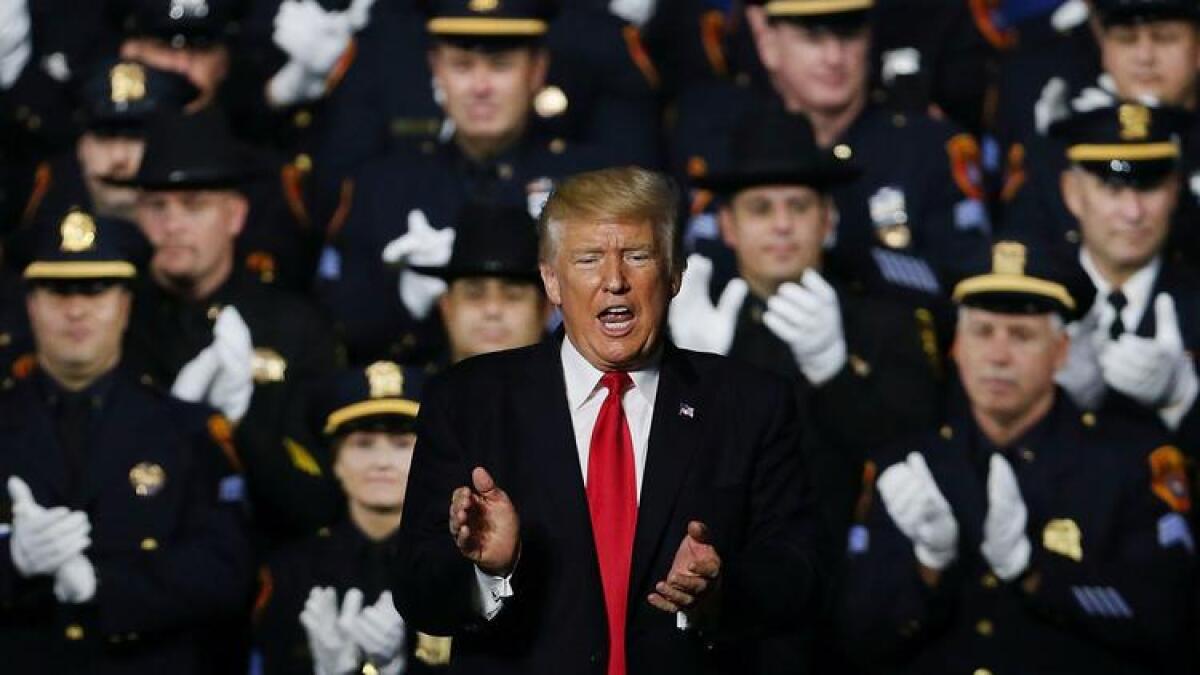
Hosts of Southern California’s “Morning Answer” radio show were wrapping up a two-hour live broadcast from a white tent just outside the West Wing last week and marveling at their access to Cabinet secretaries and prominent administration figures.
“If you’re a Trumpkin,” host Brian Whitman told his listeners on AM 870, “this is like fantasy camp.”
The White House’s daylong hospitality for Salem Radio Network, a nationwide chain of Christian and conservative stations, underscored President Trump’s continued courtship of — and increased dependence on — core supporters as he confronts a stalled agenda and increasingly perilous investigations into whether his campaign colluded with Russia and he subsequently sought to obstruct the inquiries.
- Share via
Obamacare vote isn’t the only sign of GOP resistance to Trump
In the year since Donald Trump won the Republican presidential nomination, party leaders have been reluctant to challenge a man who has formed a tight bond with conservative voters, even when he upset party orthodoxies and norms of presidential behavior.
But that reticence is breaking down. A convergence of contentious issues, as well as embarrassing infighting and shake-ups at the White House, have a number of Republicans suddenly in open resistance to Trump on a number of fronts.
- Share via
Trump ousts Reince Priebus as chief of staff in latest White House shake-up
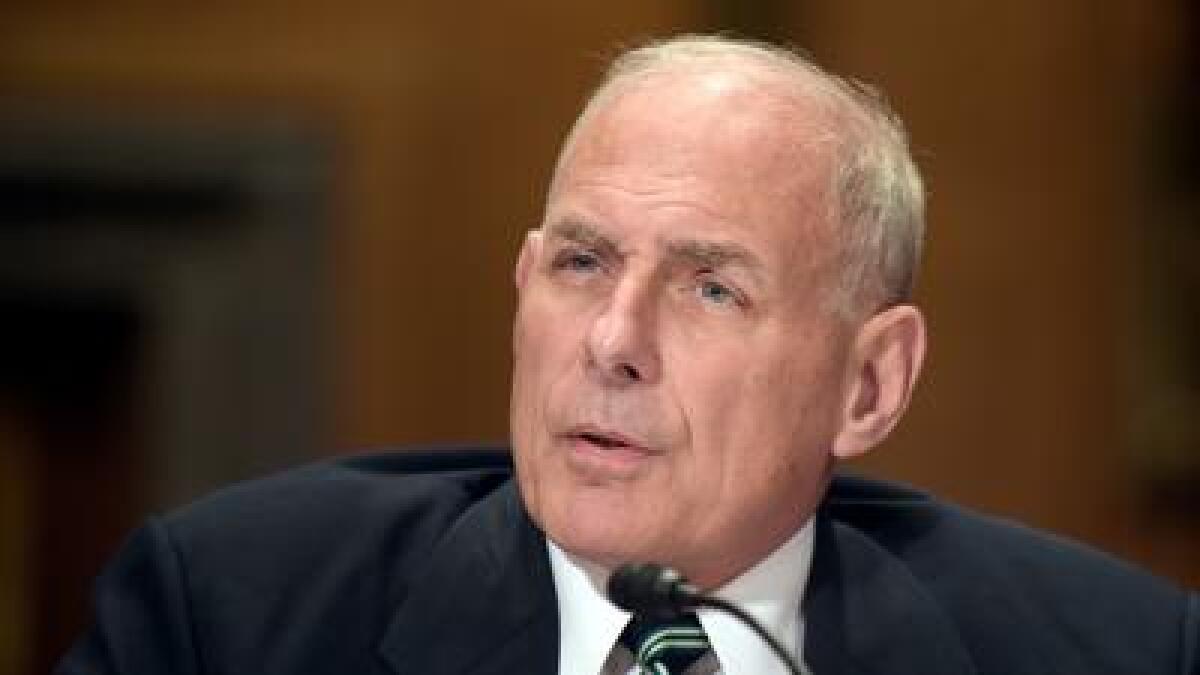
President Trump ousted his beleaguered chief of staff, Reince Priebus, naming Homeland Security Secretary John F. Kelly to replace him Friday in the latest White House shake-up as the administration struggles to emerge from bitter staff infighting and a stalled legislative agenda.
Trump announced the abrupt reshuffle in three posts on Twitter hours after the Senate killed his latest plans to rewrite President Obama’s signature healthcare law, dealing another harsh blow to the White House.
The tweets, sent as Trump was returning on Air Force One with Priebus after a speech on gang violence in New York, caught Capitol Hill and others off guard even though Priebus’ stature in Trump’s inner circle has been in sharp decline for some time.
- Share via
Putin’s spokesman accuses U.S. of ‘political schizophrenia’

Russia urged the United States on Monday to show “political will” to mend ties even as it ordered sweeping cuts of U.S. embassy personnel unseen since Cold War times.
President Vladimir Putin’s spokesman, Dmitry Peskov, said it will take time for the U.S. to recover from what he called “political schizophrenia,” but added that Russia remains interested in constructive cooperation with the U.S.
“We are interested in a steady development of our ties and are sorry to note that we are still far from that,” he said.
Peskov’s statement followed Sunday’s televised comments by Putin, who said the U.S. would have to cut 755 of its embassy and consulate staff in Russia, a massive reduction he described as a response to new U.S. sanctions.
The Russian Foreign Ministry had previously said that the U.S. should cut its embassy and consular employees to 455, the number that Russia has in the United States. Along with the caps on embassy personnel announced Friday, it also declared the closure of a U.S. recreational retreat on the outskirts of Moscow and warehouse facilities.
Moscow’s action is the long-expected tit-for-tat response to former President Obama’s move to expel 35 Russian diplomats and shut down two Russian recreational retreats in the U.S. over reports of Russian meddling in the 2016 presidential election.
- Share via
White House urged to refrain from Obamacare ‘sabotage’ as Trump mulls subsidy cutoff
A pair of prominent lawmakers urged President Trump on Sunday not to sabotage the Affordable Care Act, or Obamacare, in the wake of failed Republican efforts to scrap his predecessor’s signature legislative achievement.
But Trump urged GOP senators to try again to push through some version of repealing and replacing the law, even though Senate Majority Leader Mitch McConnell (R-Ky.) said last week it was time to move on to other matters.
Trump senior advisor Kellyanne Conway said the president would decide in coming days whether to block subsidies that are a crucial component of the existing healthcare law.
“He’s going to make that decision this week, and that’s a decision that only he can make,” Conway said on “Fox News Sunday.”
Two of the lawmakers who blocked the Senate GOP repeal plan last week, however, criticized the administration’s continued efforts to overturn the law.
Sen. Susan Collins, the Maine Republican who steadfastly rejected a series of GOP healthcare measures last week, blamed the Trump administration for encouraging instability in the insurance markets by continuing the uncertainty over whether the subsidies – cost-sharing payments that reduce out-of-pocket healthcare costs for poorer Americans – would continue.
“I’m troubled by the uncertainty that has been created by the administration,” Collins said on NBC’s “Meet the Press.” She contested Trump’s characterization of the payments as an “insurance company bailout.”
“That’s not what it is,” she said, calling the reduction payments “vital assistance” to low-income Americans.
And Sen. Lisa Murkowski of Alaska said further action on healthcare should be done in a bipartisan manner and not rushed.
“You cannot do major entitlement reform singlehandedly, and you wouldn’t do major legislative initiatives singlehandedly,” she told reporters in Alaska.
Sen. Bernie Sanders (I-Vt.) echoed Collins’ criticism of Trump’s threat to stop making the cost-sharing payments.
“You know, I really think it’s incomprehensible that we have a president of the United States who wants to sabotage healthcare in America, make life more difficult for millions of people who are struggling now to get the health insurance they need and to pay for that health insurance,” he said on CNN’s “State of the Union.”
Prior to heading out for a day at his Virginia golf property, Trump tweeted that Republican senators should press ahead with efforts to scrap Obamacare -- a day after he tauntingly exhorted them not to be “quitters” in the quest for a legislative victory for him.
The White House budget director, Mick Mulvaney, on CNN’s “State of the Union,” said it was official Trump administration policy that the Senate should keep working to repeal and replace the Affordable Care Act, eschewing an August recess if necessary.
Senators, he said, “need to stay, they need to work -- they need to pass something.”
Health and Human Services Secretary Tom Price, while acknowledging a responsibility to “follow the law” -- Obamacare -- also signaled that Trump was not accepting defeat in efforts to get rid of the measure.
“Our goal…as well as the president’s goal, is to put in place a law, a system, that actually works for patients,” he said on “Meet the Press,” adding, “You can’t do that under the current structure.”
- Share via
Frustrated in defeat, Trump threatens healthcare of voters — and lawmakers
Frustrated by the failure of the Obamacare repeal in the Senate, President Trump on Saturday threatened to end federal subsidies for healthcare insurance — for Congress as well as the rest of the country.
“If a new HealthCare Bill is not approved quickly, BAILOUTS for Insurance Companies and BAILOUTS for Members of Congress will end very soon!” Trump tweeted, fuming about Congress’ failure to repeal the Affordable Care Act, which he said was “imploding.”
Such a move could cause havoc and much higher premiums in insurance markets, since many low- and moderate-income people depend on those subsidies to help cover the cost of their policies. Through a series of administrative maneuvers by Congress and the Obama administration, members and their staffs also benefit from those subsidies.
Targeting congressional healthcare might score Trump some populist points with his base, but it would likely come at a cost of poisoning his relationship with Congress. Just making the threat on Saturday highlights how far things have eroded between Trump and top GOP lawmakers. And it comes a day after Trump pushed out former Chief of Staff Reince Priebus, an establishment Republican who was the GOP congressional leadership’s trusted liaison in the White House.
Trump’s longstanding threat to let the health insurance plans fail would come with its own political price. The federal government sends about $600 million a month to insurance companies to help cover the cost, and Trump is threatening to cut that off to allow Obamacare markets to collapse.
His goal is to pressure Congress to send him a repeal bill, but so far the strategy has failed. The confidence Trump has expressed that if he followed through with the threat the fallout would land not on him but on Democrats, because they created Obamacare, is not widely shared in Washington.
- Share via
Iran condemns new U.S. sanctions, vows to pursue missile program
Iran defied Washington and condemned new U.S. sanctions over its development of missiles capable of being armed with nuclear warheads.
“We will continue with full power our missile program,” Foreign Ministry spokesman Bahram Ghasemi told state television IRIB on Saturday, dismissing new sanctions passed by Congress last week as, “hostile, reprehensible and unacceptable.”
“It’s ultimately an effort to weaken the nuclear deal,” Ghasemi said, adding, “The military and missile fields … are our domestic policies and others have no right to intervene or comment on them.”
Iran had agreed to limit its nuclear activities under the 2015 agreement with the U.S. and other world powers in exchange for sanctions relief.
Ghasemi argued Saturday that the U.S. had violated that agreement by linking the missile program to the nuclear deal and restricting Iranian banking activities in the U.S. He argued that Iran’s latest missile tests don’t break the agreement because the weapons are defensive.
“The new wave of pressure on missile projects in Iran will push the Islamic theocracy into a corner,” predicted Iran analyst Hojjat Kalashi in Tehran, noting that the government of President Hassan Rouhani, who was reelected in May, is coping with an economic downturn and may step back from the compromise nuclear deal.
The new Iran sanctions bill, which also targets Russia and North Korea, was passed by the House and Senate this week. It would penalize those involved in Iran’s ballistic missile program as well as those who do business with them, impose an arms embargo on Iran and label its Islamic Revolutionary Guards Corps a terrorist group.
White House spokeswoman Sarah Huckabee Sanders has said President Trump will sign the bill.
On Friday, the U.S. was joined by Britain, France and Germany in condemning Iran’s recent launch of a satellite-carrying rocket and warned that it violated a United Nations resolution implementing the 2015 nuclear deal.
In a joint statement, they urged Iran to stop developing missiles and rockets capable of carrying nuclear warheads that have “a destabilizing impact on the region.”
In response to a rocket launch Thursday, the U.S. Treasury Department imposed sanctions on subsidiaries of an Iranian company involved in Tehran’s ballistic missile program.
But Nader Karimi Juni, an analyst close to Rouhani’s government, said Iranian leaders don’t believe the U.N. and European powers will ultimately back the U.S., and so Iran “will not compromise on missile projects and will remain defiant.”
- Share via
Trump jabs U.S. mayors, who push back, calling president ‘out of touch’ with cities

President Trump wants police to know that he – not mayors – has their back.
“I’ve met police that are great police that aren’t allowed to do their job because they have a pathetic mayor or a mayor that doesn’t know what’s going on,” Trump said Friday in a speech before police officers in Brentwood, N.Y.
The comments from Trump, who in his address highlighted crime in cities like Chicago and Los Angeles, drew applause from some in attendance.
In a statement following Trump’s remarks, the United States Conference of Mayors, a bipartisan group, released a statement pushing back against the president.
“The president’s comments today prove how out of touch he is with the realities of life in American cities. Mayors’ number one priority is – and always will be – the safety and protection of their residents,” said New Orleans Mayor Mitch Landrieu, the group’s president. “There is no daylight between the mayors of our cities and the uniformed officers who work tirelessly to keep us safe every single day.”
During the speech Trump called on police and immigration officials to be “rough” with suspected gang members in cities nationwide.
In a recent interview with The Times, former New York Mayor Michael R. Bloomberg, who recently launched a $200-million initiative to empower city governments and mayors, stressed the key to good governing is experience as a manager – something, he said, Trump was not.
Bloomberg added that the mayors are much more in tune with the needs of residents than the federal government.
“You got to remember a mayor and the local city council are much closer to the public than the governor and the state legislature, or the president and the federal legislature. So if the public is in favor of something, the local officials know it and they get held responsible,” he said.
- Share via
Trump unleashes on Twitter after a tough week
President Trump was back on Twitter early Saturday morning, closing out a chaotic and disappointing week with one of his signature online rants.
He took no responsibility for the collapse of the GOP effort to repeal and replace Obamacare, instead suggesting Senate leaders are weak for refusing to change filibuster rules. (Even with the change in rules Trump is calling for, there were still not enough GOP votes in the Senate to repeal the Affordable Care Act.)
It wasn’t long ago that Trump was a fierce defender of those exact rules, attacking politicians who would tinker with them.
And it is not clear how the attack on the GOP leadership will help Trump advance his agenda.
Trump also turned his fire on those who worry he is too cozy with Russia, which seems to be most of Congress.
Trump’s suggestion that the Russians were more fearful of him being in the White House than Hillary Clinton is curious, as it is well documented that Russian President Vladimir Putin despised Clinton. But during the campaign, and into the Trump presidency, Putin and Trump have often had nice things to say about each other.
But that cordial relationship, amid revelations of Russian meddling in U.S. elections and investigations into possible collusion between Russian operatives and the Trump campaign, hasn’t served Trump well of late.
The lack of faith Congress had in Trump to take a tough line with Russia was clear in its overwhelming vote to take the decision on sanctions out of his hand. The White House said Friday Trump would sign the bill, though he didn’t have much of a choice. A veto would have been met with a certain congressional override.
- Share via
Trump will sign Russia sanctions bill, White House says
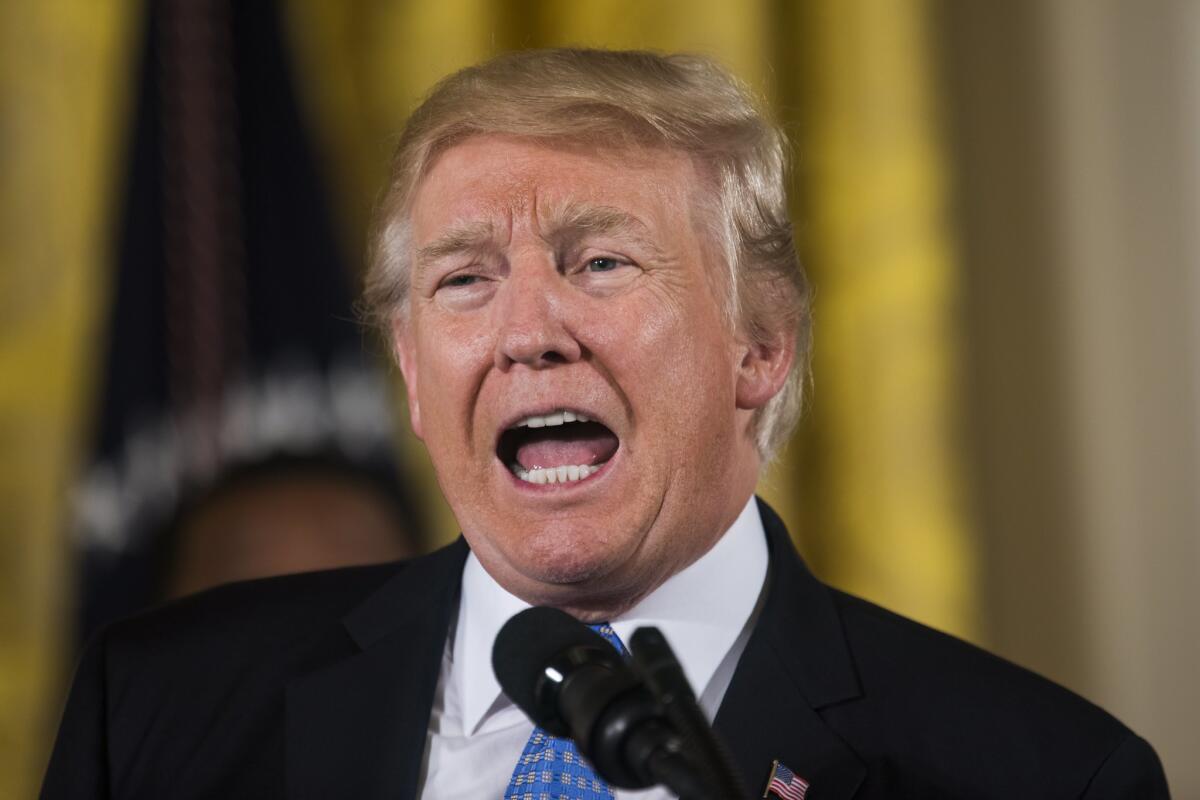
President Trump will sign a package of stiff financial sanctions against Russia that passed Congress with overwhelming support, the White House said Friday.
Moscow has already responded, ordering a reduction in the number of U.S. diplomats in Russia and closing the U.S. Embassy’s recreation retreat.
Trump’s willingness to support the measure is a remarkable acknowledgement that he has yet to sell his party on his hopes of forging a warmer relationship with Moscow. His vow to extend a hand of cooperation to Russian President Vladimir Putin has been met with resistance as skeptical lawmakers look to limit the president’s leeway to go easy on Moscow over its alleged meddling in the 2016 presidential election.
The Senate passed the bill, 98-2, two days after the House pushed the measure through by an overwhelming margin, 419-3. Both were veto-proof numbers.
The White House initially wavered on whether the president would sign the measure into law. But in a statement late Friday, Press Secretary Sarah Huckabee Sanders said Trump had “reviewed the final version and, based on its responsiveness to his negotiations, approves the bill and intends to sign it.”
Russia responds to sanctions bill by cutting U.S. diplomatic staff and seizing properties>>
- Share via
The growing parade of exits under Trump administration
A lot of people have left President Trump’s early administration — Chief of Staff Reince Priebus was replaced Friday.
The White House communications department has been the scene of many of the recent turnovers as it wrestles to craft a message sometimes at odds with Trump’s frequent tweeting.
At the National Security Council, there has been a leadership struggle since Michael Flynn resigned in the face of pressure over undisclosed contacts with Russia. One appointee was fired over comments he made at a private function. Others have been removed as Flynn’s successor, H.R. McMaster, has moved to add loyalists to the council.
Here are the most noteworthy departures:
- Share via
Trump urges officers and immigration officials to be ‘rough’ on ‘animals’ terrorizing U.S. neighborhoods
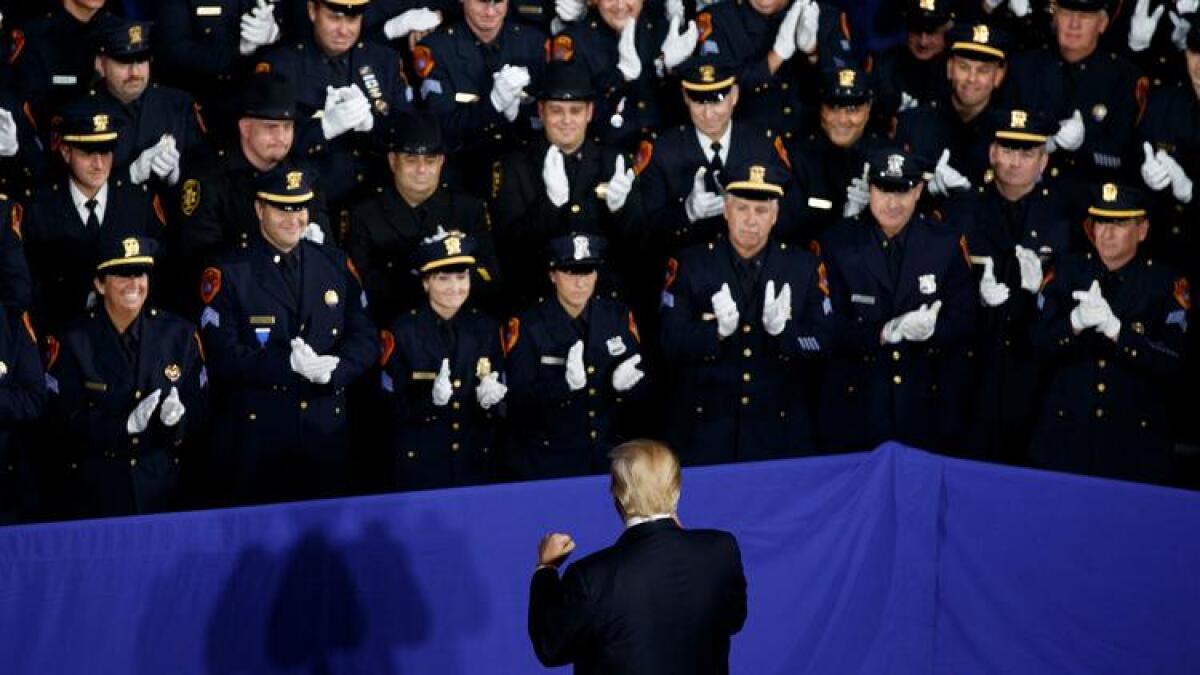
President Trump on Friday called for police and immigration officials to be “rough” with suspected gang members in order to rid the country of “animals” he said are terrorizing communities.
“Please don’t be too nice,” Trump told police recruits at Suffolk County Community College in Brentwood, a heavily Latino suburb of New York City. “Like when you guys put somebody in the car and you’re protecting their head, you know the way you put the hand … like, don’t hit their head, and they’ve just killed somebody? … You can take the hand away.”
He implied that he was satisfied with rough handling of suspects by the police. “When you see these thugs being thrown into the back of a paddy wagon — you just see them thrown in, rough,” he said.
Scoffing at calls for what he describes as political correctness, Trump also renewed his pledges to build a wall along the Mexican border. He accused the Obama administration of admitting criminals into the United States.
- Share via
Analysis: In a Washington run by men, two overshadowed Republican women make their point on healthcare
In a Washington that has grown demonstrably more testosterone-fueled since President Trump’s inauguration, it took two Republican women to secure the end of a long effort to repeal and replace Obamacare.
They were the same two women — Maine Sen. Susan Collins and Alaska Sen. Lisa Murkowski — who had been excluded from the 13-member working group drafting the Republican bills.
“Nobody’s being excluded based upon gender. Everybody’s at the table,” Senate Majority Leader Mitch McConnell had said of his all-white-males group.
In the early hours of Friday, the duo was overshadowed by the more dramatic and unexpected no vote from Sen. John McCain of Arizona.
There was reason for the attention lavished on McCain — a war hero and veteran senator returns to the Capitol days after a dire cancer diagnosis. But without both Collins’ and Murkowski’s steadfast opposition, his vote would have been meaningless.
Also largely overlooked: Hawaii Sen. Mazie Hirono, a Democrat who like McCain made an arduous trip to Washington despite her recent diagnosis of late-stage kidney cancer.
Social media buzzed Friday with praise for the women senators from many fronts, including from men. But from many women, there was also a sense of familiarity at being ignored or taken for granted.
- Share via
Clinton Foundation donor who was denied a visa settles leak case against the U.S.
A billionaire Nigerian businessman and major Clinton Foundation donor banned from entering the U.S. two years ago on terrorism grounds has settled a lawsuit against the U.S. government.
Gilbert Chagoury last year sued the FBI and other government agencies in U.S. District Court in Washington, saying he had been damaged by what he described as improper government leaks to the Los Angeles Times.
The Times reported last year that Chagoury had been denied a visa to travel to the U.S. in 2015 on suspicion that he had provided aid to terrorist groups. One document, citing unverified information from an unnamed source, said that Chagoury – who is of Lebanese heritage – had funneled funds to Hezbollah, the Lebanese militia and political group designated a terrorist organization by the U.S.
Chagoury, an ardent Lakers fan who for decades lived part of the year in Los Angeles, angrily denied that he ever provided funds for terrorism. He said the publicity forced him to sell his Beverly Hills mansion at a loss and caused a bank to close his account.
A philanthropist, Vatican ambassador and longtime friend of Bill Clinton, Chagoury once was invited to the White House after contributing to a Democratic get-out-the-vote campaign. He donated at least $1 million to the Clinton Foundation.
Emails released last year showed that a Bill Clinton aide pushed Hillary Clinton’s aides at the State Department to get Chagoury access to top U.S. diplomats.
In the settlement filed in court on Friday, the Justice Department said Chagoury has never appeared on the list of Specially Designated Nationals, figures such as terrorists and narcotics traffickers who are generally barred from doing business in the U.S.
The government did not grant Chagoury’s request for a court hearing to dispute the reports that led to his exclusion from the U.S.
“As I have often said, I have loved America my whole life because it was the land of freedom and justice,” he said in a statement, adding that he hopes the agreement will help repair his reputation.
The Justice Department did not immediately respond to a request for comment.
Chagoury, who lives most of the time in Paris, has not applied for another visa, said his spokesman, Mark Corallo.
- Share via
Trump ousts Priebus, announces John Kelly as new chief of staff
President Trump announced via Twitter on Friday that he had named retired Gen. John Kelly, head of the Department of Homeland Security, as White House chief of staff, replacing Reince Priebus.
- Share via
Rep. John Delaney of Maryland to run for president
Rep. John Delaney of Maryland says he’s running for president, instead of governor or reelection, in 2018.
Delaney, a Democrat, announced his plans in a statement Friday.
The politically moderate banking entrepreneur is in his third term in Maryland’s 6th Congressional District, which includes western Maryland and a large section of Montgomery County, the state’s largest county.
The 54-year-old is worth roughly $90 million and is one of the House’s wealthiest members. He spent about $2 million to help finance his first House race in 2012.
His consideration of a possible Maryland gubernatorial bid months ago quickly drew interest in his House seat. Several candidates already have expressed interest in running for the seat.
- Share via
McCain set to head back to Arizona to undergo chemotherapy and radiation treatments
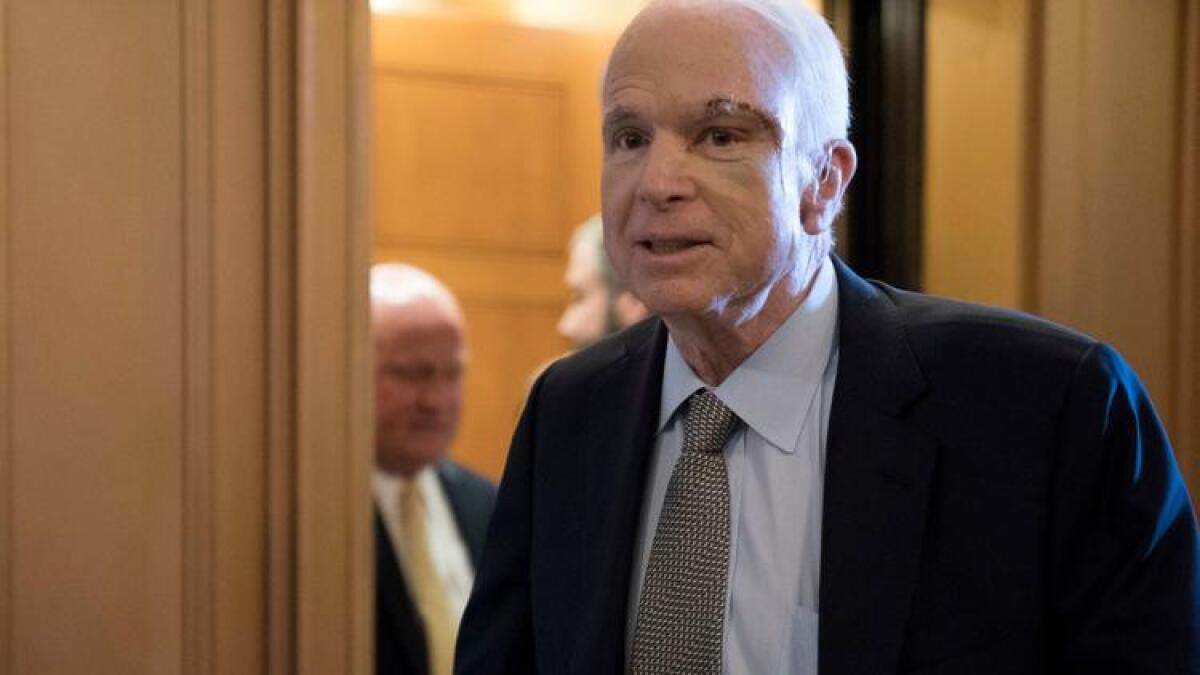
Sen. John McCain is headed home.
Hours after McCain spurned his party and voted in opposition to a GOP measure to repeal the Affordable Care Act, the senator’s office announced Friday he will return to Arizona to undergo chemotherapy and radiation treatments for his recent diagnosis of brain cancer.
McCain, 80, was found this month to have a brain tumor known as a glioblastoma. He is scheduled to return to Washington in September after his initial treatments.
The glioblastoma – an aggressive type of cancer – was discovered when McCain had a blood clot removed from above his left eye. According to the Mayo Clinic, which is overseeing McCain’s treatment, glioblastoma is difficult to treat.
After returning to Washington this week and voting in favor of opening Senate debate on repeal, McCain was among three Republicans early Friday morning to vote in opposition to a so-called skinny bill that would repeal the ACA, known as Obamacare. The move by McCain, who has served in the Senate since 1987, has drawn the ire of members in his own party and some in the right-wing media.
- Share via
McCain’s surprise vote doomed GOP healthcare bill, but did it open the door for Senate bipartisanship?
Sen. John McCain is usually happy to spar with reporters, but he ducked into an elevator ahead of the Senate healthcare vote late Thursday without saying a word about how he would vote.
Senate Minority Leader Charles E. Schumer, though, already knew the answer.
The Democratic leader had been talking with the Arizona Republican all week — four, five times a day — ever since McCain returned to work after being diagnosed with brain cancer.
Earlier in the week, McCain had dramatically salvaged the stalled GOP bill by voting to begin debate, only to go on to deliver a blistering speech against his own party leaders’ partisan, closed-door process in crafting it.
“We’ve been spinning our wheels on too many important issues because we keep trying to find a way to win without help from across the aisle,” he told them. “We’re getting nothing done.”
Schumer and McCain have been longtime colleagues, a kind of frenemies who seem like throwbacks to an earlier era of Congress. They worked together on big legislation, including the 2013 immigration overhaul — grand ideas that seem all but impossible in today’s Congress.
They had plenty to discuss.
“About the Senate, about it working again, about working together, and about how this bill was so poor for the American people,” Schumer said.
“And he knew that, so did half his colleagues, but he had the courage to vote no.”
The moment stunned the Senate when McCain stepped up to cast his vote — a single down-turned finger — dooming the healthcare bill. Audible gasps filled the galleries, which were packed with onlookers.
But his vote — along with “no” votes from Republicans Susan Collins of Maine and Lisa Murkowski of Alaska — did more than shelve the long campaign to repeal the Affordable Care Act.
It cracked open a new divide in the Senate, which seems to be split not so much between Republicans and Democrats, but by those senators who want to work together versus those stuck in hardened partisan tribes.
- Share via
Watch live: Trump speaks on MS-13 gang-related deaths from Long Island
- Share via
U.S. hits Iran with more sanctions in response to satellite launch
The United States is slapping Iran with new sanctions in response to its launch of a satellite-carrying rocket into space this week.
The sanctions target six Iranian subsidiaries of the Shahid Hemmat Industrial Group. The Treasury Department says that group is “central” to Iran’s ballistic missile program.
Treasury Secretary Steven Mnuchin says the sanctions illustrate deep U.S. concerns about Iran’s missile testing and other actions. He says the U.S. will continue countering Iran’s ballistic missile program, including Thursday’s “provocative space launch.”
The U.S. has said that launch flouted a U.N. Security Council resolution because the technology is inherently designed to be able to carry a nuclear payload.
The sanctions come as the Trump administration continues debating its Iran policy and whether to scrap the 2015 multilateral deal that limits the development of Iran’s nuclear capabilities.
- Share via
‘Political betrayal.’ McCain vote against Obamacare repeal draws ire from conservative writers
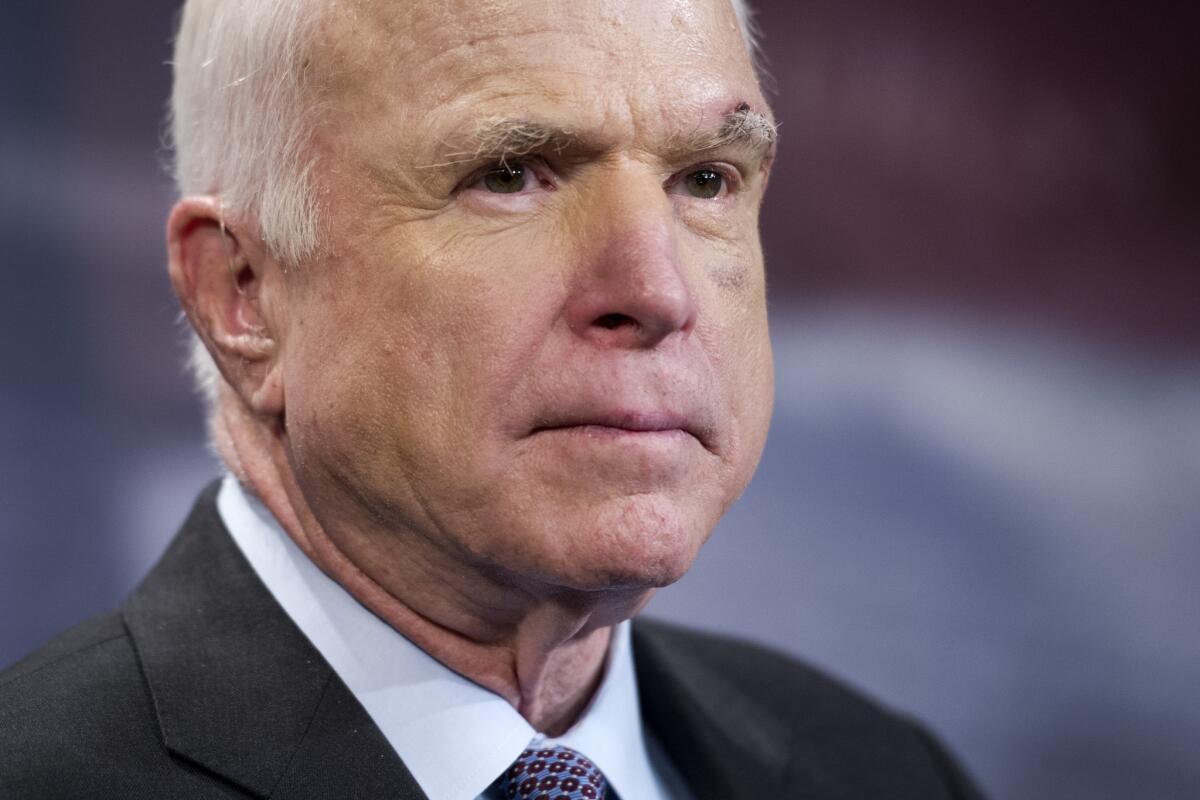
Though John McCain was one of three Republicans who helped Democrats squash the legislation to repeal Obamacare, conservative media is homing in on the Arizona senator for spurning his party in the healthcare vote.
Here are some of today’s headlines:
John McCain: Traitor to the conservative cause (Washington Times)
McCain, who was recently diagnosed with brain cancer, has been a staunch opponent of Obamacare, but in the end he could not support the so-called skinny repeal measure put forward by his colleagues in the Senate.
In this piece, Cheryl K. Chumley, jabs McCain for his vote.
“For American voters expecting their Republican-dominated House, Senate and White House to honor their years of repeal promises and actually, well, repeal Obamacare, McCain’s thumbs-down was a face-slap moment that will be remembered in history as a textbook classic case of political betrayal,” she writes.
McCain’s odd definition of ‘leading the fight to stop Obamacare’ (National Review)
This article is simple – it’s a quick compare-and-contrast of McCain’s recent comments versus his vote on Friday.
Last year, during a tough reelection, McCain’s campaign ran a television ad that boasted the senator is “leading the fight to stop Obamacare.”
But last night his office put out a statement noting the GOP Senate bill did not offer a “replacement to actually reform our health care system and deliver affordable, quality health care to our citizens.”
The author of this piece, Jim Geraghty, concludes: “It’s very difficult to characterize McCain’s decision as ‘leading the fight to stop Obamacare.’ That’s more like leading the fight to keep Obamacare in place while you continue to look for a replacement that you like better.”
John McCain burns Mitch McConnell sides with Democrats (American Spectator)
When McConnell, the majority leader, stood on the Senate floor Friday after the bill’s failure, he was clearly annoyed.
McCain’s “no” vote had led to applause moments earlier from Democrats.
“In a move that’s no surprise to anyone, John McCain voted against the embarrassingly named ‘Skinny Repeal,’ voted against his party (or is it his party?) and voted to keep Obamacare going as is,” writes Melissa Mackenzie.
- Share via
Meet the two female GOP senators who opposed the healthcare bill from the start
Sen. John McCain shocked Republicans and Democrats alike with his vote early Friday morning to kill the latest Republican effort to repeal Obamacare.
But McCain was not the only Republican to play a role in blocking the final version of the overhaul bill.
Two female Republican lawmakers, Sens. Lisa Murkowski of Alaska and Sen. Susan Collins of Maine, also voted against the bill.
Collins has opposed repeal and replace efforts from the beginning, and Murkowski has also been critical of much of what the Senate Republican leadership has proposed.
Collins said it would be a “big mistake” for Republicans to pass legislation without trying seriously to work with Democrats to reach bipartisan solutions. Instead, she called for both parties to work together to improve the healthcare system.
Murkowski and Collins were the first from their party to come out against repealing the ACA without having new, replacement legislation on the table.
In statements posted on Twitter, Collins, who voted against the same proposal in 2015, said she did not think it was “constructive” to repeal the law without a replacement, while Murkowski encouraged senators from both sides of the aisle to work together to address healthcare issues.
The two senators were also the only Republicans to vote against opening debate on repeal of Obamacare earlier this week.
Their opposition to Republican healthcare efforts has drawn a lot of criticism within the party, some of it expressed in vulgar, even violent terms.
Georgia Rep. Buddy Carter said in an interview Wednesday with MSNBC: “Somebody needs to go over there to that Senate and snatch a knot in their ass.”
A Texas congressman said the female senators narrowly avoided an “Aaron Burr-style” showdown with him.
President Trump publicly rebuked Murkowski on Twitter for her vote.
Trump has not criticized Collins by name for her vote, but warned Tuesday at a rally in Ohio that “any senator who votes against repeal and replace is telling America that they are fine with the Obamacare nightmare, and I predict they’ll have a lot of problems.”
- Share via
The current Senate GOP effort to repeal Obamacare is dead. Now what?
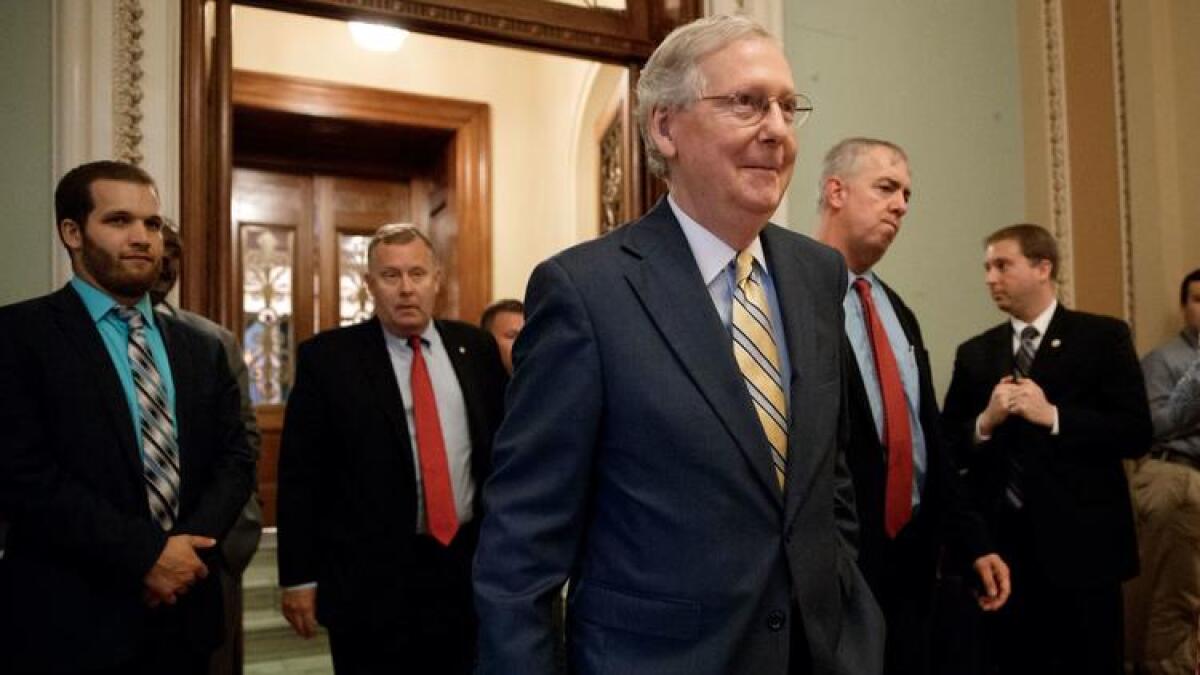
The sudden collapse of the GOP’s Senate campaign to repeal or replace the Affordable Care Act does not mean the issue disappears.
Significant problems and challenges remain, particularly for Obamacare insurance marketplaces.
The defeat increases the odds that Congress will begin to look at a more limited approach to shore up the current law and stabilize markets.
The GOP’s repeal effort may return, but in the meantime here’s a look at what a temporary fix might look like:
- Share via
Paul Ryan responds to the failure of the GOP healthcare bill
House Speaker Paul Ryan said Friday that he’s “disappointed and frustrated” by the failure of Republican healthcare legislation in the Senate.
But Ryan said in a statement that “we should not give up” after promising for years to repeal and replace Obamacare.
“We were sent to Washington to fulfill the pledges we made to our constituents,” the statement said. “While the House delivered a bill to repeal and replace Obamacare, unfortunately the Senate was unable to reach a consensus.”
At the same time, the speaker said that overhauling the tax code is at the top of the House’s list of priorities.
He pledged to pursue “historic tax reform” in the fall.
He issued his statement as the House prepared to leave Washington for its annual August recess.
The House passed legislation repealing and replacing the Affordable Care Act in May. But after a failed vote early Friday in the Senate, it’s not clear if GOP leaders will be able to resuscitate the efforts.
- Share via
Economic growth rebounded to 2.6% annual rate in second quarter

The U.S. economy rebounded this spring after a weak winter, expanding at a solid 2.6% annual rate as consumers picked up their spending pace, the Commerce Department said Friday.
Total economic output, also known as gross domestic product, for the April-through-June period was in line with analyst expectations for a bounce-back based in part on pent-up demand.
The economic growth rate was more than double the 1.2% pace in the first quarter. That figure was revised down Friday from an earlier estimate of 1.4%.
“After the winter blues, the economy has rebounded,” said Sung Won Sohn, an economist at Cal State Channel Islands.
- Share via
Watch: The moment John McCain voted no on the healthcare bill
- Share via
Never mind healthcare. President Trump has made slogans great again

His promise to repeal and replace Obamacare has crashed and burned. Tax reform hasn’t gotten far. The White House is in disarray, and big plans to rebuild the nation’s infrastructure have hit a brick wall.
But there is one unimpeachable triumph President Trump can point to: He’s made “great again” great again.
The “Make America Great Again” 2016 campaign slogan — limned in block letters and emblazoned on countless cherry-red ball caps — has been reimagined, repurposed and cheekily appropriated for countless pitches and commercial products.
Apart from the now-familiar caps, mercantile options include aprons, beanies, beer cozys, coffee mugs, hoodies, leggings, swimsuits, T-shirts, water bottles and, for the special someone, “Donald Trump Make America Great Again Womens Booty Shorts.”
But MAGA, as the president short-hands the phrase in Twitter posts, is also popping up in places having little or nothing to do with politics: on a catwalk at New York’s Fashion Week, high in the sky promoting classical music in Phoenix, on the menu at an Italian restaurant in Atlanta.
- Share via
If Adam Schiff is California’s next U.S. senator, he might want to thank President Trump
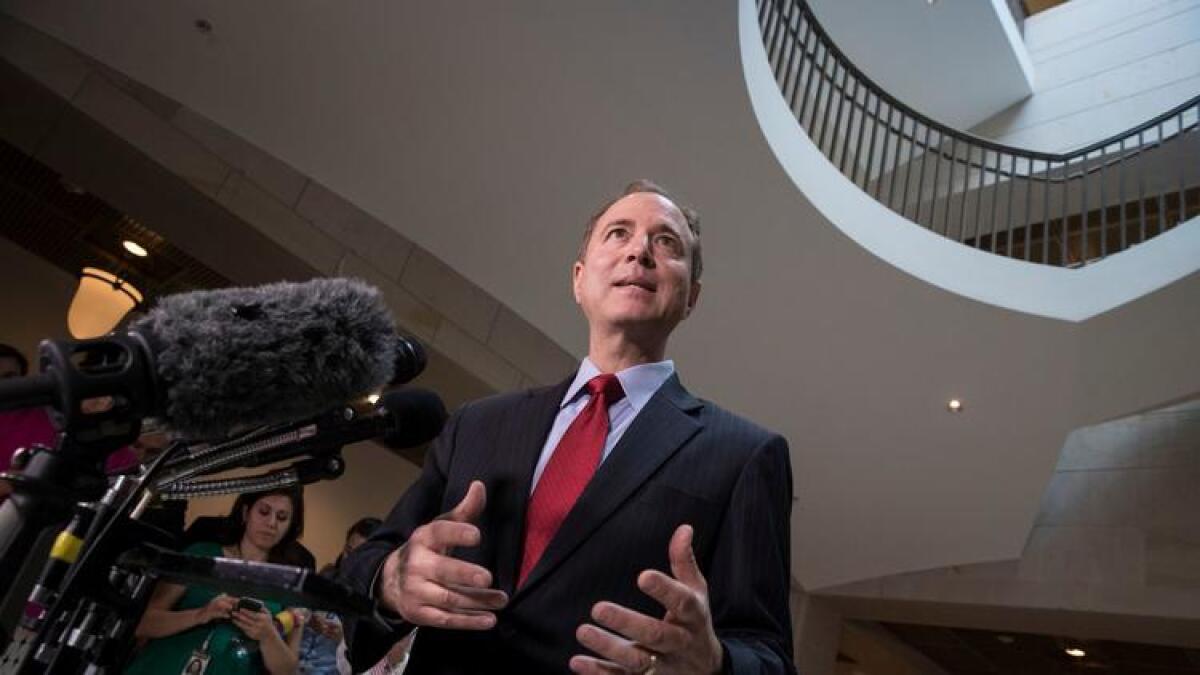
The road to elected office can be long and winding and is not always paved with the best of intentions.
Some politicians — think of the Kennedys or the Bush family — are born to the trade. Others are borne by tragedy.
Former Santa Barbara Rep. Lois Capps succeeded her husband when he died of a heart attack. Former New York Rep. Carolyn McCarthy was spurred to run when her husband was killed and her son gravely wounded in a mass shooting on the Long Island Rail Road.
Typically, though, the ascension is more methodical, one rung after the next, often with a pinch of right-place, right-time fortune thrown in for good measure.
Lately that bit of luck has visited itself on Adam B. Schiff, in the form of Russian meddling and a president who hurls tweets like poison thunderbolts.
- Share via
Senate Republicans’ ‘skinny’ repeal of Obamacare estimated to leave 16 million more people uninsured
Senate Republicans introduced their last-ditch effort to advance the GOP’s Obamacare repeal campaign late Thursday, a “skinny” bill they don’t want to become law but hope to use as a vehicle for further negotiations with the House.
The eight-page Health Care Freedom Act keeps much of the Affordable Care Act in place.
But it changes several features, including eliminating the requirement that Americans have health insurance.
According to the nonpartisan Congressional Budget Office, the new bill would leave 16 million more people uninsured over the next decade and increase insurance premiums by an average of 20% annually over the next decade.
In addition to the insurance mandate, the bill would also suspend a requirement that large employers provide insurance to their employees.
It would delay for three years a tax on medical device makers.
Additionally, the legislation would allow states greater flexibility to waive insurance rules in the current law.
And consumers would be able to sock more money away in health savings accounts to pay for insurance premiums.
The bill would restrict funding to Planned Parenthood by prohibiting federal money from going to clinics that provide abortion services, even for nonabortion-related services such as cancer screenings.
A vote on the measure -- which is fiercely opposed by patient advocates, physicians groups and health insurers -- was scheduled for later Thursday night.
“The Health Care Freedom Act repeals the core killers of Obamacare,” said Senate Majority Leader Mitch McConnell (R-Ky.) in introducing the text.
But insurance industry officials, independent experts and even many GOP senators acknowledge that the bill would dramatically raise insurance premiums and erode coverage.
Four key Republicans, including Sen. John McCain (R-Ariz.) and Sen. Lindsey Graham (R-S.C.), refused initially to vote for it unless they had assurance that the House would never pass it into law.
House Speaker Paul D. Ryan (R-Wis.) issued a statement late Thursday assuring senators that the bill would serve as the intended vehicle for a conference committee that would then continue negotiating a broader overhaul.
8:17 p.m.: This post was updated with the CBO score.
- Share via
Kris Kobach says Trump’s voter fraud panel will keep voter data secure. Some states aren’t buying it
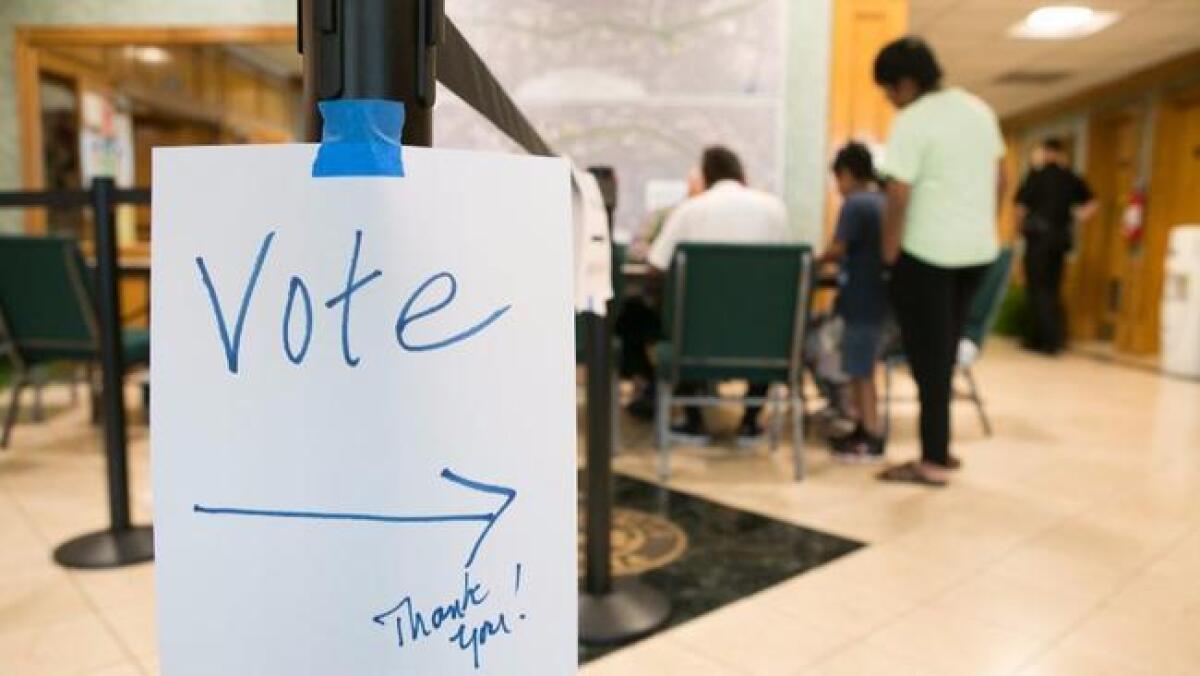
After weeks of legal battles and bipartisan pushback from top election officials nationwide, President Trump’s voter fraud commission has renewed a message for the states: It’s safe to pass along your data about voters.
“Individuals’ voter registration records will be kept confidential and secure throughout the duration of the commission’s existence,” Kris Kobach, vice chairman of the commission, wrote in a letter sent late Wednesday to all 50 secretaries of state.
Even so, by Thursday, much of the criticism that greeted an earlier request from the commission was repeated by election officials and activists, who have expressed concerns about privacy and have called the panel both a sham created by an insecure president and a tool to suppress votes.
Trump — without evidence — has repeatedly alleged that 3 million to 5 million illegal votes were cast in last year’s presidential election. (Trump prevailed in the electoral college, while Democrat Hillary Clinton won the popular vote by about 3 million votes.)
- Share via
President Trump said ‘our guys are rougher’ than the violent gang MS-13. What did he mean?
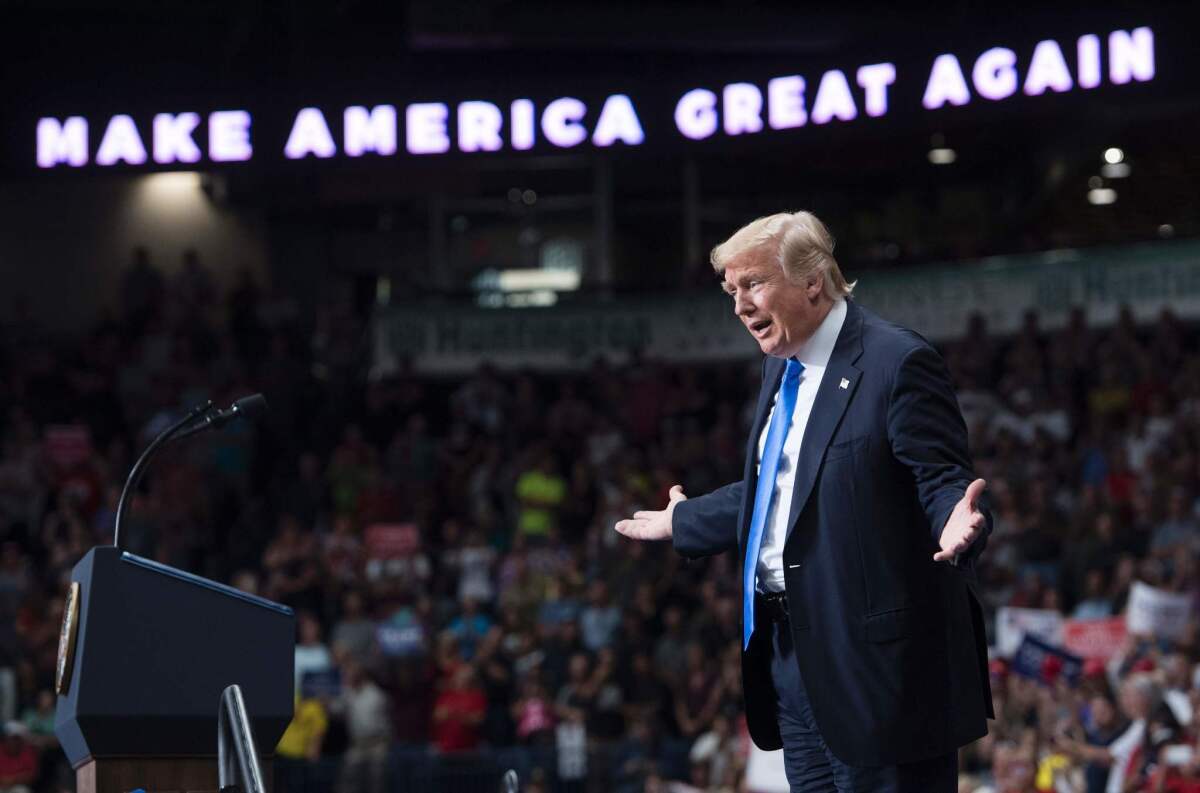
When President Trump said this week his administration is going after “bloodthirsty” criminal gangs like the notoriously violent MS-13, he added a menacing flourish: “Our guys are rougher than their guys.”
The comment raised concerns that Trump was instructing immigration agents to use excessive force when going after suspected gang members.
Not so, Trump’s top spokeswoman said on Thursday.
“I think the president means that our guys are going to do whatever it takes to protect Americans, protect American lives, protect our borders,” White House Press Secretary Sarah Huckabee Sanders said in response to a question about what Trump meant by “rougher.”
Trump “wants people to do their jobs, not go beyond the scope of what they should do,” Sanders said.
Trump’s comment came during a rally in Youngstown, Ohio, on Tuesday night. “We are throwing MS-13 the hell out of here so fast,” he said, boasting that his administration is “liberating” towns and cities from gangs.
“And, well, I will just tell you this, we’re not doing it in a politically correct fashion,” Trump added. “We’re doing it rough. Our guys are rougher than their guys.”
Trump’s comment was meant to “boost morale” among immigration officers looking to arrest and deport gang members, said one senior administration official, who would speak only without being identified to discuss the president’s thinking.
As part of Trump’s crackdown on immigrants in the country illegally, he has instructed the U.S. Immigration and Customs Enforcement agency to target a suspected gang member for deportation before that person has been convicted of a crime, said ICE director Thomas Homan.
Homan joined Sanders at her daily briefing at the White House. The two spoke to preview the president’s Friday trip to Long Island, N.Y., where he will tout his administration’s efforts against MS-13 and other gangs.
For Trump, who grew up in Queens, recent headlines about MS-13 violence in central Long Island have hit close to home. In April, four young men were found hacked to death in a park in Central Islip, N.Y., a senior administration official told reporters Thursday night.
“He is a New Yorker and he knows New York,” the administration official said. “It is absolutely a personal issue. And he knows what’s happening in New York -- and it’s not just Long Island -- is a tragedy and there are communities like that all across America.”
- Share via
Boy Scouts chief apologizes for president’s ‘political rhetoric’ at national Jamboree. Trump won’t
President Trump won’t apologize for a surprisingly political speech this week to Boy Scouts that provoked a backlash for his attacks on his predecessor, his election rival, dissident Republicans and the news media.
White House Press Secretary Sarah Huckabee Sanders delivered that word on Thursday, just after a top executive of the Boy Scouts of America issued an apology on behalf of the organization for allowing the “political rhetoric” to occur during Trump’s address Monday evening at the National Scout Jamboree held in West Virginia.
Michael Surbaugh, the organization’s chief executive, in a statement extended his “sincere apologies to those in our Scouting family who were offended by the political rhetoric that was inserted into the jamboree.”
He noted that the group’s invitation to the president to speak was in keeping with a long-standing tradition since 1937; eight of 11 incumbent presidents have attended.
But, Surbaugh wrote, “we have steadfastly remained non-partisan and refused to comment on political matters. We sincerely regret that politics were inserted into the Scouting program.”
At the White House, however, Sanders indicated that neither she nor Trump saw any reason to apologize, or considered his remarks in any way out of line.
“I was at that event and I saw nothing but roughly 40,000 to 45,000 Boy Scouts cheering the president on throughout his remarks,” Sanders said.
“I think they were pretty excited that he was there and happy to hear him speak to them,” she added.
Sanders said she had not seen the statement from the Boy Scouts chief.
During his rambling 38-minute speech to the Scouts in Glen Jean, W.Va., Trump criticized Hillary Clinton and President Obama and singled out congressional Republicans who were not in lockstep with him on healthcare.
He got much applause and supportive chants from his audience, and even credited the Scouts -- who are too young to vote -- for being among the millions who elected him. But almost immediately, the Boy Scouts organization was inundated with protests from former Scouts, parents and others angered by the president’s partisan words.
- Share via
Trumps’ words ‘kind of hurtful,’ Sessions says, but he has no plans to resign
President Trump’s scathing criticisms have been “kind of hurtful,” Atty. Gen. Jeff Sessions said Thursday, even as he again signaled that he wants to stay on the job.
“He wants all of us to do our job, and that’s what I intend to do,” Sessions said in an interview with Tucker Carlson of Fox News.
Separately, Sessions told the Associated Press that “it hasn’t been my best week … for my relationship with the president.” He made the comment in El Salvador, during a visit to highlight joint efforts to take on the MS-13 gang.
The attorney general said he hadn’t met with Trump but looked forward to talking to him about it.
“If he wants to make a change, he has every right,” Sessions said. “I serve at the pleasure of the president. I’ve understood that from the day I took the job.”
But, he said, “I believe with great confidence that I understand what is needed in the Department of Justice and what President Trump wants. I share his agenda.”
The comments were the first this week on the subject from Sessions, who has been subjected to harshly critical tweets from Trump for three days. The president has called him “weak” and said he wasn’t aggressive enough in going after leakers.
Last week, after Trump criticized Sessions in a New York Times interview, Sessions told reporters he planned to stay on as long as it was “appropriate.”
Sessions has seemed to redouble his attempts this week to win back the president’s favor.
He announced another crackdown on so-called sanctuary cities that don’t cooperate with immigration enforcement and on Friday traveled to El Salvador to highlight arrests of MS-13 gang members, both favorite topics of the president.
The Justice Department also plans to address leaks next week. Sessions said his department was stepping up leak investigations.
“Some people need to go to jail,” he said. “The president has every right to ask the DOJ to be more aggressive on that, and we intend to.”
On Wednesday evening, after Anthony Scaramucci , Trump’s incoming communications director, falsely claimed in a tweet that he’d been the victim of a leak, Sessions’ chief spokeswoman released a statement agreeing that leaks are undermining the government and promising to “aggressively pursue leak cases wherever they may lead.”
Trump has made it clear that he is most angry with Sessions for recusing himself from supervising the ongoing investigation into his administration’s ties with Russia. But Sessions defended that decision.
“I understand his feeling about it because this has been a big distraction for him,” he said on Fox.
“I’m confident I made the right decision, the decision that’s consistent with the rule of law, and an attorney general who doesn’t follow the law is not very effective at leading the Department of Justice,” he said.
In the interview, Sessions reached back to Trump’s campaign slogan to praise the president as a “strong leader.”
“He is determined to move this country in the direction that he believes it needs to go to make it great again,” he said.
Sessions has received considerable support in recent days from conservative Republicans, including many of his former Senate colleagues.
On Thursday, Sen. Ben Sasse (R-Neb.) went to the Senate floor to discourage Trump from moving against Sessions, saying that the Senate would not allow the president to make a recess appointment that would bypass the normal confirmation process.
A recess appointment would allow Trump to appoint a person who could serve without confirmation until the start of 2019. Such appointments can only be made if the Senate formally takes a break, which senators of both parties have said they will avoid in order to prevent Trump from avoiding confirmations.
“If you’re thinking of making a recess appointment to push out the attorney general, forget about it,” Sasse said. “The presidency isn’t a bull, and this country isn’t a china shop.”
1:55 p.m.: This post was updated with additional remarks by Sessions and remarks by Sen. Ben Sasse.
5:50: This post was updated with additional quotes from Sessions’ interview.
- Share via
For Trump White House, cable television becomes the venue for intramural sniping
President Trump and his aides love to complain about leaks from within the White House. But on Thursday, the infighting was out in the open.
The incoming communications director, Anthony Scaramucci, in a morning phone call broadcast on CNN, compared the West Wing to a fish that “stinks from the head down,” implying that White House Chief of Staff Reince Priebus is responsible for at least some of the leaks.
Later, Trump press secretary Sarah Huckabee Sanders declined to come to Priebus’s defense and say whether Trump has full confidence in his chief of staff.
Another Trump advisor, Kellyanne Conway, used a prison analogy for the broader backstabbing among aides, telling Fox News that her West Wing colleagues were using “the press to shiv each other.”
While the knifings might suggest a new level of chaos in a White House known for it, the style is all Trump. As a businessman, he has a history of fostering rivalries among his employees.
“He always did sort of like competition, backstabbing, infighting kind of stuff,” said Barbara Res, who spent nearly two decades as a top executive in Trump’s real estate business. “He set people up to do that.”
Trump led the charge this week, using his Twitter account and an interview with the Wall Street Journal to ridicule his attorney general, Jeff Sessions, one of Trump’s first and most prominent campaign supporters. By Thursday, both Priebus and Secretary of State Rex Tillerson were seeing their fates publicly debated, less than a week after Sean Spicer was forced out as press secretary after months of speculation and presidential slights.
The Priebus intrigue was amplified by Scaramucci on Twitter and in the CNN interview. He blamed Priebus for leaking Scaramucci’s personal financial disclosure forms -- which are publicly available -- and suggested that Trump encouraged Scaramucci’s offensive in a phone conversation the two men had just before the aide dialed into CNN.
When Sanders was asked about the Scaramucci-Priebus dustup, she said that the president likes “healthy competition” on his staff.
“The president likes that kind of competition and encourages it,” Sanders said.
The result is a White House that increasingly suggests the president’s former way of life. As the star of a reality TV show, he fomented internal competition and firings among apprentices; their cable television appearances, meanwhile, recall the “confessionals” familiar to reality show fans, in which characters confide directly to the camera their anger or enmity toward others on the show.
“The primary attribute for a successful tenure in the Trump White House is masochism,” tweeted Rick Wilson, a longtime Republican operative and Trump critic.
The repeated evidence of dysfunction and the high level of insecurity among Trump’s core aides help explain the White House’s inability to focus on its agenda.
Trump’s critics voiced suspicions on Twitter that the public staff blow-up was a deliberate distraction from the struggle in Congress to pass a healthcare bill, as well as from the ongoing investigations into potential collusion between his presidential campaign and Russia and the backlash to Trump’s surprise Twitter announcement on Wednesday that transgender people will be barred from military service.
But those issues also were being heavily covered on cable news. The stories that were overshadowed were those Trump was trying to promote: a deal his administration helped strike with Foxconn to build a production facility in Wisconsin, possibly creating thousands of new jobs, and nascent efforts to craft a tax overhaul plan.
- Share via
Democrats criticize financial industry backgrounds of two Trump bank regulator nominees
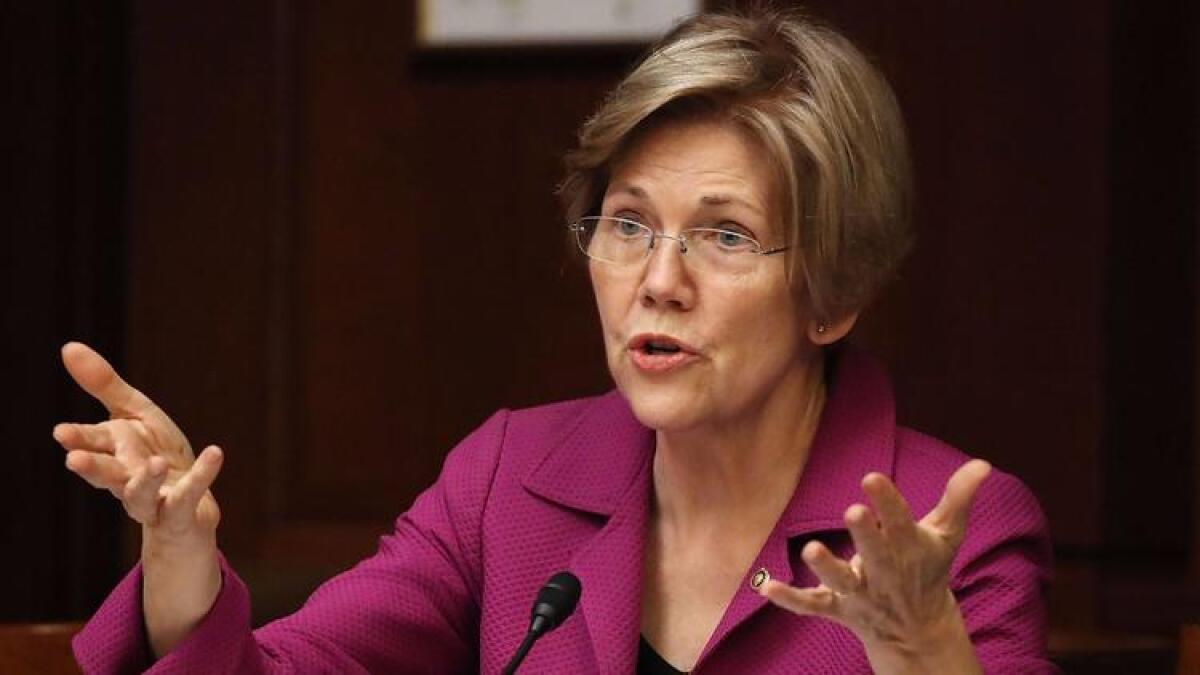
Senate Democrats on Thursday criticized the financial industry backgrounds of President Trump’s nominees for two key banking regulatory positions, arguing they would not protect the interests of average Americans.
Sens. Sherrod Brown (D-Ohio), Elizabeth Warren (D-Mass.) and others sharply questioned Joseph Otting, the former chief executive of Pasadena’s OneWest Bank, and investment fund manager Randal Quarles during a confirmation hearing by the Senate Banking Committee.
Trump nominated Otting to be the comptroller of the currency, a powerful regulator of national banks. Quarles has been tapped to be the Federal Reserve’s vice chairman for supervision, who is in charge of the Fed’s oversight of the nation’s largest bank holding companies and other regulatory efforts.
The two are expected to be friendlier to the banking industry than recent Democratic appointees.
- Share via
Senator warns Trump there will be “holy hell to pay” if he fires Sessions
A prominent Republican Senator issued a blunt warning to President Trump not to interfere with the Russia investigation, saying any effort to get rid of special counsel Robert S. Mueller III could be “the beginning of the end of the Trump presidency.”
Sen. Lindsey Graham, a member of the Senate Judiciary Committee, told reporters Thursday that “there will be holy hell to pay” if Trump fires Atty. Gen. Jeff Sessions, a favorite of conservatives who represented Alabama in the Senate for 20 years.
Graham’s warning was the sternest yet from Senate Republicans to Trump about the potential consequences of firing either Sessions or Mueller.
The chairman of the Senate judiciary committee, Sen. Charles Grassley, (R-Iowa), issued his own warning in a tweet Wednesday night, saying his committee would not take up a nomination of a replacement attorney general this year, which is required before the Senate can vote to confirm.
Starting with an interview in the New York Times last week and continuing with a three-day barrage of critical tweets, Trump has raged at Sessions for his decision to recuse himself from supervising the investigation into the Russian attempts to influence the election, and into whether anybody involved in Trump’s campaign participated in the scheme.
Trump also has bitterly complained about Mueller, whom he has accused of leading a “witch hunt,” and Deputy Atty. Gen. Rod J. Rosenstein, who appointed Mueller and who is now supervising the probe.
Justice Department regulations say that only the attorney general, or in this case Rosenstein acting in his place, can fire the special counsel. If Sessions were gone, Trump could try to appoint a replacement willing to carry out the firing.
Graham said he will introduce a bill next week that would require court review if anyone tried to fire a special counsel who was investigating the president.
“I think I’ll get all the Democrats and I hope to get a good number of Republicans,” he said, adding that the enacting such a law is “not just for Trump but for any future president. We need a check and balance here.”
Graham said Trump’s campaign to “marginalize and humiliate the attorney general is not going over well in the Senate” or among conservatives.
He also said Trump, who has called on Sessions to investigate his former rival Hillary Clinton, has gone “way beyond what is acceptable in a rule of law nation.”
“This is not draining the swamp,” he said. “What he’s interjecting is turning democracy upside down…..taking 200-year-old concepts that we’re a nation of laws and not men and trying to turn it upside down.”
- Share via
Watch live: White House news briefing with Press Secretary Sarah Huckabee Sanders
- Share via
Trump administration threatens to retaliate against Alaska for GOP senator’s Obamacare repeal vote, news site reports
The Trump administration threatened to block federal aid to Alaska in an effort to bully one of the Republican senators opposed to the current Senate GOP push to roll back the Affordable Care Act, according to a report by the Alaska Dispatch News.
The news site reports that Interior Secretary Ryan Zinke on Wednesday called Alaska Sens. Lisa Murkowski and Dan Sullivan with a warning that Murkowski’s vote “had put Alaska’s future with the administration in jeopardy.”
According to the report:
Sullivan said the call from Zinke heralded a “troubling message.”
“I’m not going to go into the details, but I fear that the strong economic growth, pro-energy, pro-mining, pro-jobs and personnel from Alaska who are part of those policies are going to stop,” Sullivan said.
“I tried to push back on behalf of all Alaskans. … We’re facing some difficult times and there’s a lot of enthusiasm for the policies that Secretary Zinke and the president have been talking about with regard to our economy. But the message was pretty clear,” Sullivan said.
The threat followed disparaging comments made by the president about Murkowski, including a Twitter attack Wednesday morning
“Senator @lisamurkowski of the Great State of Alaska really let the Republicans, and our country, down yesterday. Too bad!” Trump wrote.
Murkowski dismissed the president’s attacks in an interview with MSNBC.
“We’re here to govern. We’re here to legislate,” she said. “We’re here to represent the people who sent us here. And so every day shouldn’t be about campaigning. Every day shouldn’t be about winning elections. How about just doing a little bit of governing around here? That’s what I’m here for.”
Murkowski and Maine Sen. Susan Collins were the only Republicans who voted against a procedural motion Tuesday to begin debating legislation rolling back the 2010 healthcare law, often called Obamacare.
Sullivan, also a Republican, voted in favor of advancing the bill.
Murkowski has urged a more open process to develop the legislation, which Senate Majority Leader Mitch McConnell (R-Ky) has put together behind closed doors without committee hearings or input from Democrats.
A spokeswoman for Zinke did not immediately respond to a request for comment.
- Share via
Iran angered by report that Trump wants additional nuclear inspections
Iran responded angrily Thursday to reports that the Trump administration would push for inspections of military facilities to ensure Tehran is complying with the 2015 nuclear deal.
“Iran will not succumb to further pressure,” Hamid Reza Taraghi, a hard-line analyst who is close to Iran’s leadership, told The Times.
Taraghi did not say whether Iran would refuse inspectors access to military facilities but insisted the Islamic Republic was complying with the agreement, which required Iran to shelve its nuclear program in exchange for relief from economic sanctions.
President Trump has said he wants to tear up the deal and doesn’t believe Iran is complying, although his administration certified it was in a report to Congress this month.
The Associated Press reported Thursday that Trump was pushing for inspections of “suspicious Iranian military sites,” either to prove that Iran was violating the deal or force it to refuse, which could cause the agreement to collapse.
Iranian officials have argued in the past that inspections of military sites would be off-limits. But under the agreement it signed with the United States and five other world powers, Iran agreed to the so-called Additional Protocol, which allows U.N. inspectors limited access to any site where illicit nuclear activity is suspected.
Taraghi, a former lawmaker, said the Additional Protocol allowed for snap inspections and that international inspectors had installed closed-circuit cameras in all nuclear-related facilities.
“They have access to everything going on here on the ground,” Taraghi said. “What else do they want to know?”
It was not immediately clear what military sites the Trump administration was seeking to have inspected, or whether it had evidence that Iran was breaching the terms of the deal.
U.N. inspectors monitoring Iran’s compliance had not requested access to military facilities as of July 25, according to a paper published Thursday by Mark Fitzpatrick, executive director of the International Institute for Strategic Studies in Washington.
“If US has good evidence of #Iran violations, then an inspection request is warranted,” Fitzpatrick tweeted. “A request designed to trap Iran into saying no isn’t.”
- Share via
Top U.S. general says Pentagon will not change policy on transgender troops until White House acts
The nation’s senior military officer said Thursday that there will be “no modifications” to Pentagon policies for now despite President Trump social media posts declaring a ban on transgender troops in uniform.
Marine Gen. Joseph Dunford, chairman of the Joint Chiefs of Staff, wrote in a memo to commanders and senior enlisted leaders of the Army, Navy, Air Force and Marines that the military will continue to “treat all of our personnel with respect.”
Dunford said Pentagon policy on transgender troops would not change until the White House has issued Trump’s directive to Secretary of Defense James Mattis through formal channels — not on Twitter — and the secretary’s office issues guidance on implementation to the service chiefs. It’s unclear when that might happen.
The unusual memo appeared intended to calm widespread confusion and concern at the Pentagon, which was blindsided when Trump wrote Wednesday that Pentagon would not “accept or allow” transgender troops to serve “in any capacity.”
The president’s posts appeared to reverse a year-old Pentagon policy that allowed transgender soldiers to openly serve for the first time, and to seek sex reassignment surgery, hormone therapy and other treatments at military hospitals.
Trump’s surprise announcement not only marked a retreat for the Pentagon push to bar gender-based discrimination. It also was an about-face for Trump, who had repeatedly vowed his support for the LGBT community during the campaign last year.
The posts raised questions about the fate of thousands of transgender service members, including some deployed overseas, and whether they would be kicked out of the military under Trump’s directive.
Dunford’s memo appeared to address those fears, at least for the short term.
“There will be no modifications to the current policy until the President’s direction has been received by the Secretary of Defense and the Secretary has issued implementation guidance,” he wrote.
“In the meantime, we will continue to treat all of our personnel with respect,” he added. “As importantly, given the current fight and the challenges we face, we will all remain focused on accomplishing our assigned missions.”
In his tweets, Trump said he had decided to bar transgender troops because the military “cannot be burdened with the tremendous medical costs and disruption that transgender in the military would entail.”
Experts said neither justification was accurate or fair since the expected medical costs were negligible and transgender troops have been openly serving for the past year without disruption.
The sweeping declaration drew rebuke from war veterans and lesbian, gay, bisexual and transgender advocacy groups, who vowed to challenge Trump in federal court if self-identified transgender service members are forced out of the military.
VoteVets, a liberal military veterans advocacy group, said Thursday it had collected more than 20,000 signatures from veterans, military families and other supporters to oppose the ban.
- Share via
Analysis: Trump’s war against elites and expertise

When President Trump campaigned this spring at the Hermitage, the home of Andrew Jackson, one part of his predecessor’s approach got a special endorsement.
“It was during the Revolution that Jackson first confronted and defied an arrogant elite. Does that sound familiar?” Trump asked to laughs from his audience.
When Trump ally and National Rifle Assn. President Wayne LaPierre teed off six weeks later on America’s greatest domestic threats, he cited not homegrown terrorists but what he termed “the three most dangerous voices in America: academic elites, political elites, and media elites.”
The rhetoric against elites came from two men who would seem to be card-carrying members of the club: LaPierre made more than $5 million in 2015, the most recent year for which his compensation was publicly released. Trump lived before his inauguration in a gold-plated home in the sky above New York’s Fifth Avenue, a billionaire’s luxurious domain.
Yet for Trump and his allies, a war on elites has been central to the campaign which put him in the presidency and has maintained the loyalty of his core voters. Trump has taken particular aim at entities that could counter his power, which has helped stoke the ardor of his political backers.
- Share via
Top Trump advisor Kellyanne Conway says colleagues ‘using the press to shiv each other’
White House staffers continued their angry campaign against leaks -- and each other -- as top advisor Kellyanne Conway used vivid language in a Fox interview Thursday to denounce colleagues who are “using the press to shiv each other in the ribs.”
The comments came shortly after Anthony Scaramucci, the new White House communications director, delivered his own attack on leakers -- all but blaming Reince Priebus, the White House chief of staff -- in an interview on CNN.
If the Trump White House at times resembles a reality show, cable television has become the confessional booth where the players vent their anger at each other. That dynamic was on vivid display Thursday morning.
Conway largely backed Scaramucci without explicitly taking sides in his public war against Priebus, whom he publicly suggested leaked Scaramucci’s financial disclosure forms to the press. The forms are public and available through a request.
“We just have to cut down on people thinking it’s cute and it’s popular and it somehow enhances their resume and their portfolio for later on to curry favor with folks who are more interested in covering the style and not the substance here,” Conway said of those who leak to he press.
Asked specifically whether she agrees with Scaramucci that Priebus leaked the financial forms, Conway passed on the opportunity to defend Priebus.
“Leakers are easier to figure out than many think,” she said, perhaps ominously given Scaramucci’s threats to fire suspects. “This West Wing is a very small place.”
- Share via
Warfare in the West Wing breaks into the open as Scaramucci takes aim at Priebus
A knife fight for control of the West Wing broke into the open Thursday morning as President Trump’s new communications director Anthony Scaramucci lashed out at White House Chief of Staff Reince Priebus in a televised interview, accusing Priebus of leaking and standing in the way of Trump’s agenda.
“The fish stinks from the head down, I can tell you two fish that don’t stink, OK, and that’s me and the president,” Scaramucci said, calling in to CNN’s morning show “New Day.”
“I don’t like the activity that’s going in the White House,” he said.
Scaramucci, who had said the day he was named to the White House job that he and Priebus were like brothers, drastically amended that in the interview, comparing the two of them to the brothers who, in the Bible, were the characters in the first murder.
“Some brothers are like Cain and Abel, other brothers can fight with each other and get along. I don’t know if this is reparable or not — that will be up to the president,” he said.
President Trump has a track record of encouraging rivalries among people who work for him. Scaramucci said he had spoken with Trump for 15 minutes to go over what he was going to say before he called CNN, implying his warning to Priebus carried Trump’s backing.
Trump, Scaramucci said, “has given me his full support and his full blessing.”
When Scaramucci was hired, Trump told him he would report directly to the president, bypassing the chief of staff, and setting up the clash that played out Thursday on national television.
“If you want to talk about the chief of staff, we have had odds, we have had differences. When I said we were brothers from the podium, that’s because we’re rough on each other,” Scaramucci said.
The tension between Scaramucci and Priebus flared after Politico published a story Wednesday about Scaramucci’s publicly available financial disclosure form showing he still stands to profit from his stake in an investment firm he founded.
The disclosure form was available to the public because Scaramucci had been nominated earlier this year for a job at the Export-Import Bank of the U.S., and the forms become public 30 days after they are filed.
But Scaramucci, in a tweet Wednesday night, seemed to imply Priebus had leaked the form to make him look bad, or knew who did, and called for an FBI investigation. He later deleted the tweet, apparently after being informed that the form was not leaked.
Over the last five days, Scaramucci said to CNN, he has done “a major amount of work” interviewing assistants to the president and communications staff. He also had dinner with Trump on Wednesday night in addition to his phone conversation with the president Thursday morning.
The two of them want everyone to know “we have a very, very good idea of who the leakers are, who the senior leakers are, in the White House,” he said.
Scaramucci took aim specifically at Priebus for leaking details about internal White House discussions and maneuvers.
“If Reince wants to explain that he’s not a leaker, let him do that,” Scaramucci said.
Scaramucci appears to be giving voice to Trump’s frustration with people in the White House the president believes are slowing down policy efforts, even though Trump has shown a pattern of repeatedly stepping on his own efforts on healthcare, job creation and other initiatives with unplanned tweets on topics such as Russia, transgender troops and unfounded allegations of voter fraud.
“There are people inside this administration who think it’s their job to save America from this president,” Scaramucci said. “It’s not their jobs ... to rein him in or do things to him that slow down his agenda.”
People in the Washington are back-stabbers, Scaramucci said.
“I’m more of a front-stabbing person.”
- Share via
Scaramucci tweets, then deletes, confusing statement that referred to information in Politico report as a ‘leak’
In a now deleted tweet, incoming White House communications director Anthony Scaramucci sent out a confusing statement Wednesday night, addressing information reported earlier by Politico as a “leak.” The article reported on Scaramucci’s financial disclosures. According to Politico, those details had been filed with the Office of Government Ethics, so it’s unclear what – if anything – was leaked information.
Scaramucci’s tweet further confused as it ended with White House Chief of Staff Reince Priebus’ Twitter handle. Just before those characters, he noted that he intended to contact the FBI and the Justice Department. Some speculated that Scaramucci was implying that Priebus was behind the leak.
But in a new tweet roughly two hours after the original, he tweeted what appeared to be a clarification, correcting a headline of news site Axios. “Wrong! Tweet was public notice to leakers that all Sr Adm officials are helping to end illegal leaks,” he tweeted, ending it – once again – with Priebus’ handle.
Five days ago, Scaramucci, responding to a question about reported tensions between him and the chief of staff, said he and Priebus “are a little bit like brothers, where we rough each other up a little, which is totally normal for brothers.”
10:15 p.m. PT: This post was originally published at 8:52 p.m. It was updated with information from Scaramucci’s new tweet.
- Share via
Senate Judiciary chair fires off warning to Trump about Sessions
Sen. Charles E. Grassley (R-Iowa), the chairman of the Senate Judiciary Committee, fired off an unmistakable warning to President Trump on Wednesday evening: Don’t even think about trying to get a new attorney general confirmed this year.
Trump has been publicly tormenting Jeff Sessions, appearing to want to push the attorney general into stepping down from his job. But in a tweet, Grassley made it clear that if Trump pushed Sessions out, he would have to live with an acting attorney general for a long time.
Any nominee for attorney general would have to pass through the Judiciary Committee before getting a confirmation vote, so Grassley’s “no way” would be a formidable barrier.
Grassley has been an administration loyalist on nearly all issues so far, but as a veteran senator, he has a strong independent streak and, as previous administrations have found, he can be implacable if angered.
His message comes as conservative allies rally support for Sessions. Several other Republican senators have spoken out in favor of the attorney general, a former colleague who was well liked during his years as senator from Alabama.
Senate Democrats already have said they would use procedural motions to prevent the Senate from formally going on a recess this summer, blocking Trump from making a recess appointment that would bypass the Senate. Republicans used similar maneuvers to block recess appointments by President Obama.
If Sessions were to step down and not be replaced, Deputy Atty. Gen. Rod Rosenstein would become acting attorney general. Trump has been critical of Rosenstein as well as Sessions, so that option presumably would not appeal to him.
- Share via
Under fire from Trump, Sessions should ‘stay focused’ on his job, White House says
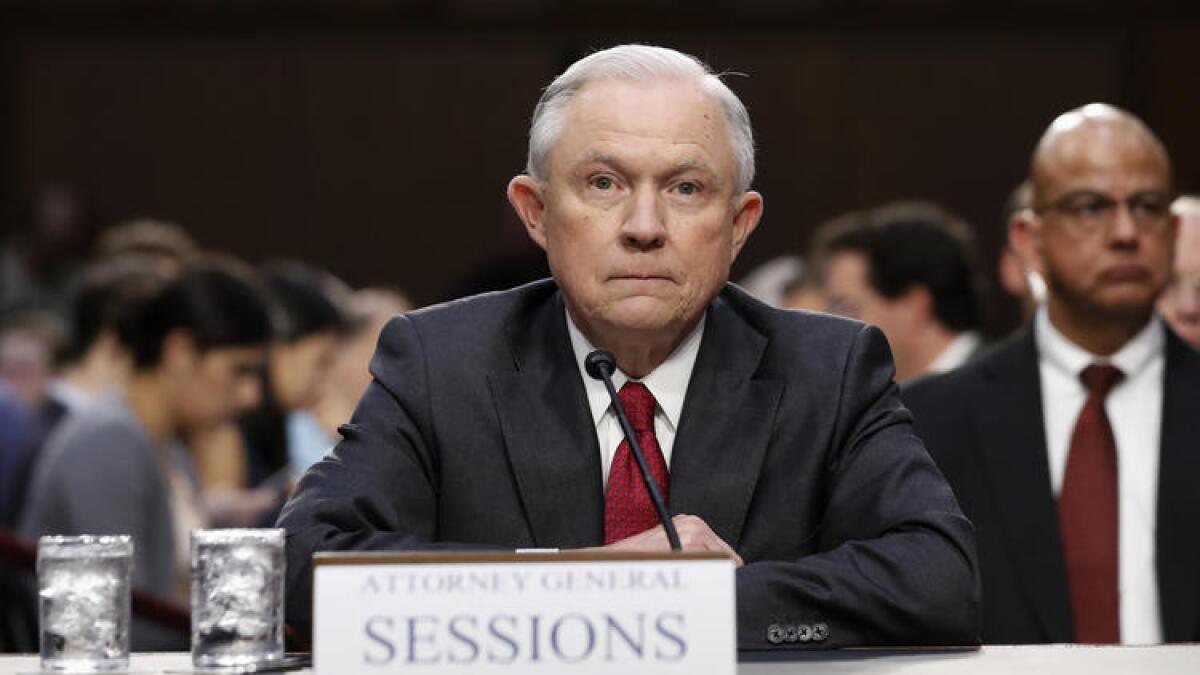
In spite of a daily barrage of Twitter attacks from President Trump, the White House press secretary said Wednesday that Atty. Gen. Jeff Sessions should “stay focused” on performing his duties as the nation’s top law enforcement officer.
“You can be disappointed in someone and still want someone to continue to do their job,” Sarah Huckabee Sanders said Wednesday, hours after Trump criticized Sessions for the third straight day – this time for not replacing acting FBI Director Andrew McCabe.
Sessions was one of Trump’s earliest and most loyal supporters, but the relationship has turned icy as Trump continues to seethe about Sessions’ decision to step aside from supervising the investigation into alleged Russian interference with last year’s election.
Sessions was at the White House for meetings Wednesday, the second time this week he’s visited the West Wing, but once again did not see Trump, Sanders said.
Sanders did not clear up the main question surrounding Trump’s strategy of publicly battering the attorney general: If the president is so unhappy, why doesn’t he simply fire Sessions?
Sen. Lindsey Graham (R-S.C.) said Wednesday that Trump’s apparent attempt to humiliate Sessions into quitting was “a sign of weakness.”
“To me, weakness is when you play around the edges, and you don’t use the power you have,” Graham said in an interview on CNN.
Sanders said that Trump wants Sessions to continue to “lead the Department of Justice.”
“He wants him to focus on things like immigration, leaks and a number of other issues,” she said. One of Trump’s public complaints has been that Sessions hasn’t been aggressive enough in pursuing leakers of classified information.
In fact, the Justice Department is expected to announce next week some leak prosecutions.
On Tuesday, Sessions also announced new measures to cut off some federal funds to so-called sanctuary cities that don’t cooperate with immigration enforcement, another favorite issue for the president.
But Sanders added that, at this point, a leak investigation would not salvage Sessions’ standing with Trump.
“I don’t think that’s the nature of the relationship,” she said.
In two tweets Wednesday morning, Trump criticized Sessions for not replacing McCabe, whose wife ran for office as a Democrat in Virginia in 2015. He suggested that McCabe had a conflict of interest in his duties as deputy director of the FBI during the investigation of Hillary Clinton’s handling of classified emails as secretary of State, although McCabe did not move into that job until months after his wife’s campaign was over.
McCabe took over the bureau as acting director when Trump fired James B. Comey in May.
Sanders also declined to answer a question on why Trump did not fire McCabe himself, saying only that Trump looked forward to seeing his nominee as FBI director, Christopher Wray, be confirmed by the Senate soon.
- Share via
Trump, on Twitter, announced a ban on transgender service members. Now the military has to figure out what he means
President Trump surprised even the Pentagon on Wednesday morning by his unexpected announcement, via Twitter, of a ban on transgender service members.
The military has not had a chance to decide how to put such a ban into effect, acknowledged Trump’s top spokeswoman, Sarah Huckabee Sanders, as she fielded numerous questions on the topic later from White House reporters.
Secretary of Defense James Mattis, who was on vacation, wasn’t informed until Tuesday that Trump had decided to bar transgender service members from serving in any way.
“Sometimes you have to make a decision and once he made a decision, he didn’t feel it was necessary to hold that decision,” Sanders said.
The president concluded, based on consultations with his national security team, that allowing transgender individuals to serve “erodes military readiness and unit cohesion,” she said.
White House and Pentagon officials had been discussing details of medical coverage for transgender service members on active duty. But Trump went far beyond that with his series of tweets that the military will “not accept or allow” transgender individuals to serve “in any capacity” in the military.
It will be up to the Defense Department to determine the specifics of the policy, including whether active-duty transgender service members will be kicked out of the military, Sanders said. Estimates of the number of current service members who are transgender range from 1,300 to about 16,000.
“The implementation policy is going to be something that the White House and Department of Defense will have to work together to lawfully determine,” Sanders said. “I would imagine the Department of Defense will be the lead on that,” she added.
Trump’s tweets overshadowed other announcements he had planned to make Wednesday about adding manufacturing jobs to the economy and donating $100,000 of his second-quarter paycheck to the Department of Education to support science and math education.
“The president has expressed concerns since this Obama policy came into effect,” Sanders said. She added that the president considered allowing transgender people in the ranks is “a very expensive and disruptive policy.”
At one point, an exasperated Sanders said she would end the briefing if she continued to get questions on the issue.
Trump refused to answer a question about the transgender policy after he spoke in the afternoon to youths from the American Legion’s Boys Nation and Auxiliary Girls Nation at the White House. “She’s very rude,” Trump said of the reporter who shouted the question.
- Share via
Decision on transgender people in military has a ‘cart before horse feel,’ Times analyst says
L.A. Times political analyst Cathleen Decker sees President Trump’s announcement about transgender people in the military as an example of his administration’s need to play defense. She says on Twitter that the decision is a play to Trump’s base and that a jobs announcement would have resonance with more voters.
Here’s some more analysis of White House spokeswoman Sarah Huckabee Sanders’ responses to reporters’ questions about the announcement.
Sanders also said this about Trump’s continued disparagement of Atty. Gen. Jeff Sessions.
- Share via
Senate Republicans reject a straight repeal of Obamacare, leaving few options for overhaul
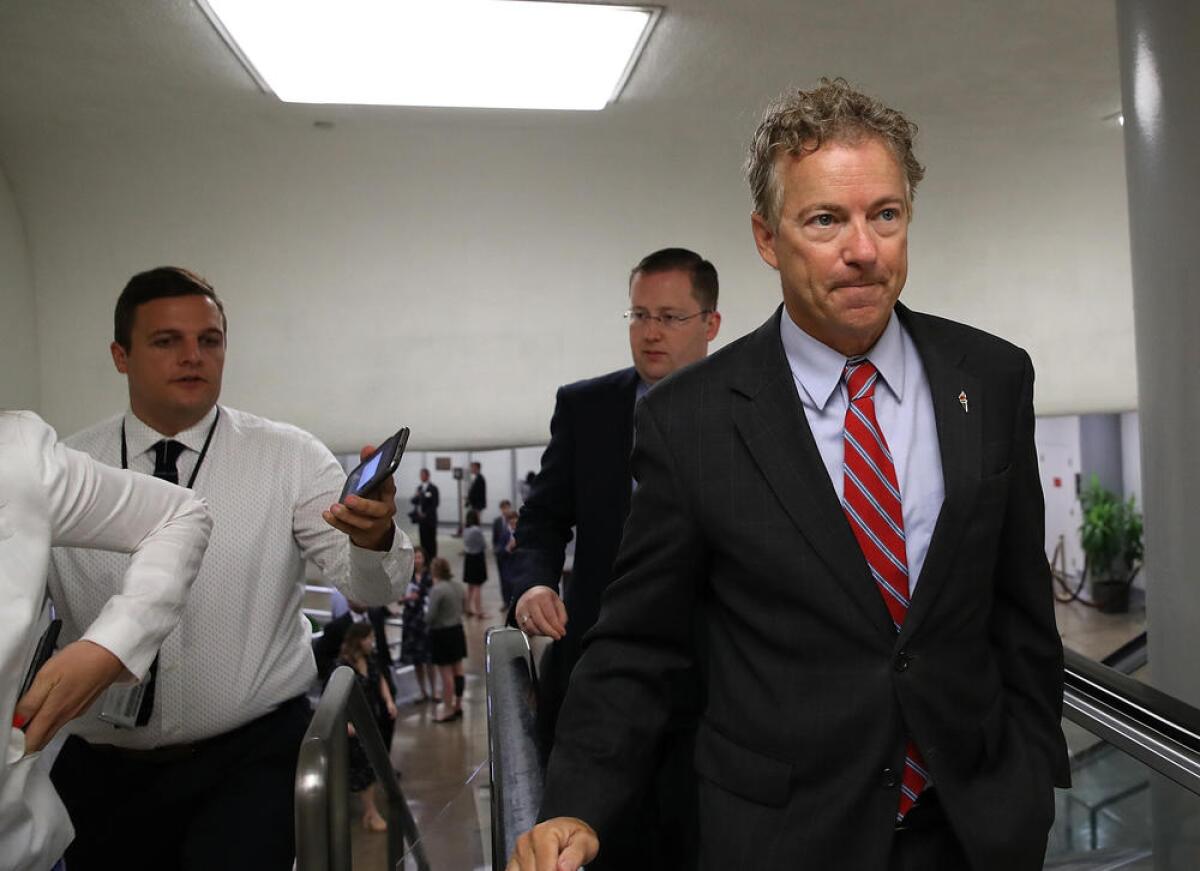
After already voting down one of their leaders’ plans to replace the Affordable Care Act, Senate Republicans on Wednesday rejected another one, this time a proposal to simply repeal most of Obamacare.
That left GOP senators with few remaining options to fulfill their campaign promise to gut the 2010 law.
The amendment from Sen. Rand Paul (R-Ky.) mirrored an earlier 2015 bill from conservatives to repeal the Affordable Care Act by 2020.
President Trump at various times has pushed the repeal-only idea, which was seen as the most straightforward approach to take amid disagreement within the party over how to reform the law.
But Paul’s proposal failed to reach the 50 votes needed for passage, despite the Republican 52-seat Senate majority and the fact that a similar measure passed in 2015. Seven Republicans joined all Democrats in the 45-55 vote.
The Senate reached a pivotal moment this week when Vice President Mike Pence cast a tie-breaking vote to open debate on a House-passed healthcare overhaul.
But after that victory, the next steps are proving much more difficult for the GOP.
Late Tuesday, nine Republican senators broke with the party to reject their most comprehensive proposal, the Better Care Reconciliation Act, even after sweeteners were added to attract support from conservatives who want full repeal and centrists who worry about cuts to Medicaid.
The chamber is engaged in a prolonged process over the next two days to vote on various amendments and proposals, but few, if any, are expected to gain traction.
Leaders best hope may come later in the week with the so-called “skinny repeal” that would simply end the Affordable Care Act’s mandate that all Americans carry insurance and that employers of bigger companies provide coverage to their workers. That plan would also repeal some of the taxes imposed by Obamacare on medical firms to pay for expanded coverage.
- Share via
One military that has no problem with transgender soldiers: Israel’s

Retired Gen. Elazar Stern was stupefied when a reporter from Israel Army Radio called Wednesday to ask for his reaction to President Trump’s series of tweets about banning the service of transgender military personnel.
“What?” Stern asked. “Why?”
“It makes us strong that we don’t waste time on questions like this,” said Stern, the former commander of the Israel Defense Forces Manpower Command. “It’s something to be proud of.”
Speaking with The Times, Stern, now a member of Israel’s parliament for the centrist Yesh Atid party, said that throughout his 34-year career in the army, “in every post, at every level, always, I knew there were homosexual individuals serving with me. No transgendered people that I knew of, but maybe. We would never ask, honestly, and we’re not supposed to know. The army’s task is to support its soldiers no matter what their needs, not meddle about in their lives.”
News of Trump’s tweets was greeted with widespread derision in Israel. The popular political blogger Tal Schneider was quick to respond on Twitter.
The Israel Defense Forces have knowingly included transgender soldiers since 1998. In 2014, the Israeli military said it had at least five transgender members and would support future such conscripts. As of last year, it was among 19 countries, including the United States, that allowed transgender people to serve in the military.
Israel’s national healthcare plan provides stipends to citizens who are transitioning.
Stern said he believes politicians bring up military matters “only because they feel there’s a public for it. In many countries, you see politicians getting votes using superficial, simplistic messages.”
“It’s always more about who I hate than who I love,” he added.
- Share via
Trump administration hits Venezuela with more sanctions, targeting civilian and military officials

The Trump administration hit Venezuela with a new round of economic sanctions Wednesday in a bid to discourage President Nicolas Maduro from rewriting his nation’s constitution, which U.S. officials said could doom Venezuela’s democracy.
The sanctions target 13 current and former civilian and military officials, including the heads of several police agencies and the electoral board.
They represent the third round of sanctions for Venezuela in the six months of the Trump presidency in what one administration official called the “steady drumbeat” of efforts to put pressure on Maduro.
The Venezuelan president has scheduled a Sunday meeting of the constituent assembly, a body stacked with his supporters, that would be in charge of rewriting the constitution. Opponents of Maduro say the project is a thinly veiled attempt by the leftist president to hold on to power indefinitely.
“It could be the end of democracy in Venezuela,” a senior administration official said. The official and two others briefed reporters on condition of anonymity in keeping with White House practices.
Trump has said he would take additional “strong and swift” actions if Maduro goes ahead with the assembly. The administration officials would not say what those actions might be, only that all options are on the table.
One option might include imposing restrictions on the oil that the U.S. imports from Venezuela. Before the current crisis, oil-rich Venezuela was a top supplier of crude to the United States.
After months of mismanagement, corruption and falling oil prices, once-prosperous Venezuela has plunged into social and economic disaster. It suffers triple-digit inflation, massive shortages of basic consumer goods and one of the highest rates of murder and violence in the hemisphere.
Near-daily protests against the Maduro government have grown increasingly desperate. More than 100 people have been killed and 4,000 arrested.
Millions of government opponents voted July 16 in a symbolic referendum against holding the constituent assembly. The action was praised by the Trump administration.
But it seems likely Maduro will proceed with the assembly.
“The United States will have a strong and swift response,” one administration official said. “The president will keep his word.”
Previously, the administration has sanctioned numerous Venezuelan officials, including executive Vice President Tareck El Aissami, who is accused of drug trafficking and has amassed a fortune in the “hundreds of millions of dollars” despite being a career public servant, an official said.
It remains unclear why Trump, who has shown little interest in human rights or democracy-building elsewhere in the world, has focused so much attention on Venezuela. The country does have close ties to Cuba and Iran, two countries that Trump often condemns, as well as an abundant supply of oil that could be fully available to the United States once more if the government in Caracas were acceptable.
- Share via
Moscow reacts with anger and frustration over new sanctions bill

Russian officials expressed anger and frustration Wednesday at the new sanctions bill passed Tuesday in the House of Representatives, calling the proposal a devastating step in already fragile Russia-U.S. relations.
“The situation is highly worrisome,” said Konstantin Kosachev, a Russian senator in the upper house of parliament and the chair of that body’s Foreign Affairs Committee.
“We will have to get used to the new situation when we don’t have any major reasons left to build relations with the U.S.,” he said at a press conference in Moscow.
Russian Deputy Foreign Minister Sergei Ryabkov criticized the sanctions, saying that by adopting them, Washington was “closing off the prospect for normalizing ties.”
“This is sad news for Russian-U.S. relations and for international law, relations and trade and economy,” Kremlin spokesman Dmitry Peskov told reporters in a conference call Wednesday.
Many blamed the move on Russophobic “hysteria” infecting Washington politics. The bill has yet to be signed into law by President Trump, but the assumption in Moscow is that the White House has been backed into a corner and the president has no choice.
“The law about new sanctions is adopted. Trump will sign it confirming that he is a hostage of the Congress and of the anti-Russian hysteria. It’s a new level of confrontation,” wrote Alexey Pushkov, an outspoken Russian senator, on Twitter.
“There can’t be any illusions: The goal of new sanctions is to increase pressure on Russia. Trump is forced to conduct Obama’s politics, turning him into H.Clinton,” he said in another tweet.
For many Russian officials, the sanctions bill seemed to end any speculation that Trump’s election would mean a restart on improving U.S.-Russia relations. A meeting between the two leaders in Hamburg, Germany, seemed to give many in Moscow hope that things might improve. Indeed, Putin’s performance at the July G20 summit in Germany was hailed as a success back home.
But the sanctions bill suggested to some in Moscow that Trump’s struggles on the U.S. political stage were a wider challenge than previously understood.
Kosachev posted on Facebook [link in Russian] urging Russia to retaliate in a way that would be painful to America. In a press conference later in the day, he said that although the law had not yet been signed by Trump, engaging in a retaliation game would not serve either country’s best interests.
“We should look for counter measures that won’t harm our national interests, but will be painful for the Americans. It should not be just symbolic,” he said at a news conference in Moscow.
- Share via
Six weeks after Alexandria shooting, Rep. Steve Scalise is discharged from the hospital
House Majority Whip Steve Scalise (R-La.) was discharged from the hospital Tuesday, six weeks after he was shot at a congressional baseball team practice in Alexandria, Va.
Scalise and four other people were injured when a gunman opened fire at the practice. U.S. Capitol Police and other officers returned fire and killed the gunman.
“Congressman Steve Scalise has made excellent progress in his recovery from a life-threatening gunshot wound six weeks ago,” according to a statement from MedStar Washington Hospital Center released by Scalise’s office.
Scalise will begin an “intensive” inpatient rehabilitation, the statement said. “He is in good spirits and is looking forward to his return to work once he completes rehabilitation.”
- Share via
U.S. Energy Secretary Rick Perry pranked by Russia’s ‘Jerky Boys’
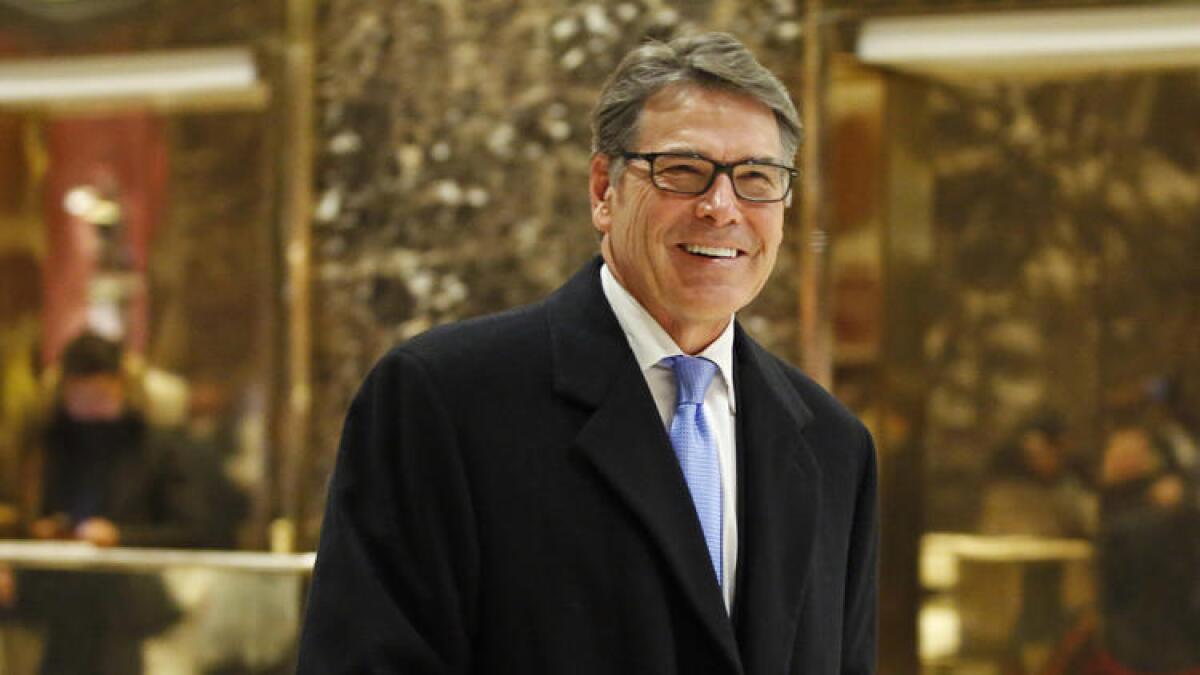
Sometimes jokes do cross cultural boundaries.
U.S. Energy Secretary Rick Perry was the butt of a practical joke this month after two Russian comedians engaged him in a 22-minute phone call in which Perry was led to believe that he was speaking to Ukrainian Prime Minister Volodymyr Groysman.
During the conversation, Perry discussed supplying coal to Ukraine, whose own supplies have been cut because of the conflict in its eastern regions, where Russia-backed rebels control large swaths of coal-rich territory.
The jokers also inquired about whether Ukraine could get a bargain on U.S. coal exports.
“Giving Ukraine more options with some of our technology is, I think, in everyone’s best interest, with the exception of the Russians, but that’s OK,” he said during the call, which was posted on a Russian news site on July 25.
Perry also said during the call that the Trump administration opposed Nord Stream 2, a Russian project to bring natural gas to Europe across the Baltic Sea.
The release of the call came on the same day that the U.S. Congress passed new sanctions against Russia.
The call with Perry isn’t the first time the Russian pranksters, Alexei “Lexus” Stolyarov and Vladimir “Vovan” Krasnov, have caught celebrities and politicians off guard with their phony phone calls. The duo is known as Russia’s version of the “Jerky Boys” and once fooled Elton John into thinking he was speaking by phone with Russian President Vladimir Putin and his spokesman, Dmitry Peskov. Another prank tricked Ukrainian President Petro Poroshenko into believing he had his counterpart in Kyrgyzstan, Almazbek Atambayev, on the other line.
Interestingly, the pranksters chose to speak to Perry in Russian and not in Ukrainian, using a translator. Ukrainian is Groysman’s primary language and the language in which all official government business is conducted in Ukraine.
- Share via
Trump pressures Sessions to replace the acting FBI director
President Trump ratcheted up pressure on Atty. Gen. Jeff Sessions to fire the acting FBI director, who has been a periodic target of conservative attacks.
In two tweets Wednesday morning, Trump criticized Sessions for not replacing Acting FBI Director Andrew McCabe, whose wife ran for office in Virginia as a Democrat in 2015 and received contributions from the state Democratic Party.
“Why didn’t A.G. Sessions replace Acting FBI Director Andrew McCabe,” Trump wrote.
Trump called McCabe, a 31-year veteran of the FBI, a “Comey friend who was in charge of the Clinton investigation.” McCabe was James B. Comey’s deputy before Trump fired Comey in June. At that point, McCabe took over running the bureau, but he hasn’t been running the Russia investigation, which is directed by special counsel Robert S. Mueller III.
Trump’s tweets are based on several false claims.
McCabe’s wife Jill McCabe, a pediatrician, ran for a seat in the Virginia State Senate in 2015 and lost to the Republican incumbent.
At the time, McCabe had no role in the Clinton investigation. When Jill McCabe entered the race, her husband was not working at FBI headquarters, but was a senior official in the Washington field office, working primarily on counter-terrorism investigations.
By the time Andrew McCabe did become FBI deputy director in February 2016, which would have given him some role in overseeing the Russia investigation, his wife’s campaign had been over for three months.
Jill McCabe, like most Democratic candidates in Virginia, did receive money from Gov. Terry McAuliffe, a Democrat, and from the state Democratic Party. McAuliffe is a longtime political ally of the Clintons, but there is no evidence that Hillary Clinton was involved in the donations.
In recent days Trump has taken aim at Sessions, calling him “beleaguered” and criticizing Sessions for stepping aside from oversight of the investigation into Russian efforts to sway the 2016 election.
The FBI decided last year to not bring charges against Clinton over her mishandling of State Department emails. Trump supporters often chanted “lock her up” at campaign rallies.
Trump’s criticism of Sessions has sparked speculation that Trump wants Sessions to resign and open the door for another attorney general who would fire Mueller.
In an interview with the Wall Street Journal on Tuesday, Trump said he was “disappointed” Sessions had not done more to investigate intelligence leaks and had not restarted the FBI’s investigation into Clinton.
Trump added: “So many people say to me: Why are they going after you on nothing and they leave Hillary Clinton alone on, you know, really major things?”
Trump’s nominee to become FBI Director, Christopher Wray, is awaiting Senate confirmation. Once he is confirmed, which is expected, McCabe will no longer be acting director.
- Share via
Trump bars transgender people from serving ‘in any capacity’ in the U.S. military
President Trump messaged Wednesday that he has decided to bar transgender individuals from serving “in any capacity” in the U.S. armed forces, a policy that could affect thousands of Americans now in uniform and others hoping to serve.
In a decision he disclosed on Twitter, Trump said the military would not “allow or accept” transgender service members, reversing a policy begun by the Obama administration last year.
It wasn’t immediately clear what would happen to transgender service members now in the Army, Navy, Air Force and Marines. Estimates vary widely, from about 1,300 to 16,000 members of the armed services who are transgender.
A Pentagon spokesman described Trump’s Twitter post as “new guidance” rather than an order from the commander-in-chief, and said the Pentagon would issue “revised guidance” to the military “in the near future.”
LGBT groups vowed to challenge Trump in court, and Sen. John McCain (R-Ariz), chairman of the Senate Armed Services Committee, all but urged the Pentagon to ignore the tweet, saying there is “no reason” to change current policy.
In a series of tweets, the president said he had consulted with “my Generals and military experts” in deciding to reverse the current policy.
“Our military must be focused on decisive and overwhelming victory and cannot be burdened with the tremendous medical costs and disruption that transgender in the military would entail,” he wrote.
A study commissioned by the Pentagon last year found the expected medical costs to be negligible.
It wasn’t immediately clear when Trump’s decision might be implemented by the Pentagon.
Secretary of Defense James Mattis is out of Washington on vacation this week and the Pentagon appeared caught off guard by the president’s tweet. Military officials referred all questions to the White House.
“We will continue to work closely with the White House to address the new guidance provided by the Commander-in-Chief on transgender individuals serving the military,” Pentagon spokesman Capt. Jeff Davis said in a statement. “We will provide revised guidance to the Department in the near future.”
Democrats in Congress, as well as several senior Republicans, offered strong support for transgender individuals serving honorably, and condemned Trump’s tweet.
“Any American who meets current medical and readiness standards should be allowed to continue serving,” McCain said in a statement. “There is no reason to force service members who are able to fight, train, and deploy to leave the military - regardless of their gender identity.”
He said the Defense department is conducting a study on the medical obligations, impact on military readiness and other questions regarding transgender individuals who want to join the military.
“I do not believe that ay new policy decision is appropriate until that study is complete and thoroughly reviewed by the Secretary of Defense, our military leadership and the Congress,” McCain added.
Sen. Orrin Hatch, (R-Utah) also announced his opposition.
“I don’t think we should be discriminating against anyone,” he said. “Transgender people are people and deserve the best we can do for them.”
The LGBT community vowed to go to federal court to challenge Trump’s decision on transgender people in uniform. .
“We are going to fight for them as hard as they are fighting for the country,” the OutServe-Servicemembers Legal Defense Network, a Washington-based group that seeks LGBT equality in the military, said in a statement.
The legal group estimates about 16,000 transgender individuals currently serve in the military.
Last July, the Pentagon lifted a long-standing ban against transgender men and women serving openly in the military, removing one of its last discriminatory hurdles and placing protection of gender rights on par with race, religion, color, sex and sexual orientation.
The policy part of the Obama administration’s Force of the Future initiative, which aimed to make the strait-laced, male-dominated U.S. military more inclusive.
In 2015, the administration opened all combat positions to women and in 2016 appointed the first openly gay Secretary of the Army, Eric K. Fanning.
The Obama policy allowed transgender service members currently on duty to immediately serve openly. Armed services had to come up with medical and training plans and until July 1, 2017, for full implementation. The Trump administration initially pushed that date back, and now has reversed the policy.
The Pentagon says it does not know how many transgender people serve in uniform because until last year, they faced discharge if they revealed their identities.
A 2016 study by Rand Corp., the Santa Monica-based think tank, estimated 6,630 transgender individuals were in active military service. The total force is about 1.3 million.
The Rand study, commissioned by the Pentagon, estimated that between 30 and 140 new hormone treatments a year could be initiated by transgender service members under the Obama-era opening. It also predicted 25 to 130 gender transition-related surgeries a year among active service members.
As a result, it said, military healthcare costs could increase by $2.4 million to $8.4 million a year -- a 0.13% increase in current medical spending.
Gender reassignment surgery and other treatment deemed medically necessary by a physician was to be covered under the policy.
Prior to the Obama rule, the Pentagon banned transgender troops from openly serving. If they revealed their transgender identity, they could be kicked out or denied reenlistment.
In the most famous case, former Army Pvt. Chelsea E. Manning had treatment while in a military prison after a court martial convicted her in 2013 of leaking classified material to Wikileaks while serving in Iraq. Obama pardoned her just before he left office and she was released from prison in May.
Manning mocked Trump’s decision in her own tweets Wednesday.
“so, biggest baddest most $$ military on earth cries about a few trans people but funds the F-35? sounds like cowardice ,” she wrote.
UPDATES:
9:33 a.m.: This post was updated with statements from the Pentagon, Sen. John McCain, Chelsea Manning and other details.
6:56 a.m.: This post was updated with staff reporting.
6:28 a.m.: This post was updated with material from the Associated Press.
This post was originally published at 6:14 a.m.
- Share via
Senate committee withdraws subpoena for Paul Manafort
President Trump’s former campaign chairman will not be testifying Wednesday before the Senate Judiciary Committee, as originally scheduled, after the committee rescinded its subpoena.
The committee withdrew its subpoena for Paul Manafort late Tuesday after Manafort agreed to turn over documents and to continue negotiating about setting up an interview with the panel, according to Taylor Foy, a spokesman for Sen. Charles E. Grassley, the Judiciary Committee chairman. The committee also removed Donald Trump Jr. from the list of witnesses scheduled for Wednesday’s public hearing.
The panel has sought to talk with Manafort about a June 2016 Trump Tower meeting in New York with Russian lawyer Natalia Veselnitskaya, among other issues including his foreign political work on behalf of Ukrainian interests.
On Tuesday, Manafort met with Senate Intelligence Committee staff, providing his recollection of the Veselnitskaya meeting and agreeing to turn over contemporaneous notes of the gathering last year, according to people familiar with the closed-door interview. Manafort “answered their questions fully,” said his spokesman, Jason Maloni.
Trump’s son-in-law and advisor Jared Kushner was also on Capitol Hill on Tuesday for a second day of private meetings, this time for a conversation with lawmakers on the House Intelligence Committee.
Both Manafort and Kushner have been cooperating with the committees which, along with Special Counsel Robert Mueller, are probing Russia’s interference in the 2016 presidential election and possible collusion with Trump associates.
The two men have faced particular scrutiny about attending the Trump Tower meeting because it was flatly described in emails to Donald Trump Jr. as being part of a Russian government effort to aid Trump’s presidential campaign.
Manafort’s discussion with committee staff was limited to his recollection of the June 2016 meeting, according to two people familiar with the interview. Both demanded anonymity to discuss details because the interview occurred behind closed doors. Manafort had previously disclosed the meeting in documents he turned over to the committee. He has now provided the committee with notes he took at the time, one of the people said.
The other person said Manafort has also said he will participate in additional interviews with the Senate Intelligence Committee staff on other topics if necessary. Those meetings haven’t yet been scheduled.
Kushner spent about three hours behind closed doors Tuesday with the House intelligence panel. Republican Rep. Mike Conaway of Texas, who is leading the committee’s Russia probe, said he found Kushner to be “straightforward, forthcoming, wanted to answer every question we had.” He said Kushner was willing to follow up with the committee if it has additional questions.
The committee’s ranking Democrat, Rep. Adam B. Schiff of Burbank, said the questions touched on “a range of issues the committee had been concerned about.”
“We appreciate his voluntary willingness to come and testify today,” Schiff added.
On Monday, Kushner answered questions from staff on the Senate’s Intelligence Committee, acknowledging four meetings with Russians during and after Trump’s victorious White House bid and insisting he had “nothing to hide.”
Emails released this month show that Trump Jr., the president’s eldest son, accepted a June 2016 meeting with Veselnitskaya with the understanding that he would receive damaging information on Democrat Hillary Clinton as part of a Russian government effort to help Trump’s campaign. But, in his statement for the two intelligence committees, Kushner said he hadn’t read those emails until being recently shown them by his lawyers.
Kushner’s statement was the first detailed defense from a campaign insider responding to the controversy that has all but consumed the first six months of Trump’s presidency.
Kushner called the meeting with Veselnitskaya such a “waste of time” that he asked his assistant to call him out of the gathering.
“No part of the meeting I attended included anything about the campaign; there was no follow-up to the meeting that I am aware of; I do not recall how many people were there (or their names), and I have no knowledge of any documents being offered or accepted,” he said.
Kushner on Monday confirmed earlier media reports that he had suggested using Russian diplomatic facilities to set up secure communications between Trump advisor Michael Flynn, who would become national security advisor, and Russian officials. But he disputed that it was an effort to establish a “secret back channel.”
His statement describes a December meeting with Flynn and Russian Ambassador Sergey Kislyak in which Kushner and Kislyak discussed establishing a secure line for the Trump transition team and Moscow to communicate about policy in Syria.
- Share via
As debate opens on Obamacare bill, Senate quickly rejects the first Republican amendment
After Senate Republicans agreed to open debate Tuesday to overhaul the Affordable Care Act, they quickly shot down what was once their leading proposal for repealing and replacing Obamacare.
Republicans rejected their revised bill, the Better Care Reconciliation Act, despite having added a provision from Sen. Ted Cruz (R-Texas) favored by conservatives and another from Sen. Rob Portman (R-Ohio) to court centrists worried about Medicaid cuts.
It failed 43 to 57, not reaching the 60-vote threshold needed to advance. Nine Republicans voted against it.
President Trump warned Republicans during a rally in Youngstown, Ohio, late Tuesday that they needed to act after having promised for seven years to repeal and replace the healthcare law.
“Now they must keep their promise,” Trump said. “Any senator who votes against repeal-and-replace is telling America that they are fine with the Obamacare nightmare, and I predict they will have a lot of problems.”
But dispatching with the bill that was once considered to be the GOP’s best chances at fulfilling their campaign promise to end the law now leaves Republicans with few options.
Senate Majority Leader Mitch McConnell (R-Ky.) promised senators a robust debate if they agreed earlier Tuesday to vote on the motion to open the legislative process.
Typically, that means round-the-clock voting, with senators able to offer unlimited amendments as part of the special budget process Republicans are using for the healthcare debate. More votes are set for Wednesday.
But with Democrats preferring to fix the healthcare law rather than end it, Republicans are largely left on their own. Even though most votes will require only 51 votes for passage, the 52-seat Republican majority is split on key healthcare issues, making various GOP proposals unable to win support.
Instead, Republicans may settle on an idea leaders floated this week -- what’s being called “skinny repeal” -- a measure that would end just a few key parts of Obamacare. It would repeal the law’s mandate that all Americans carry insurance and that bigger employers must provide it to their workers, or pay fines. The skinny repeal could also end some taxes, including one on medical device makers.
Passage of the skinny repeal would be far from the Republican promise to repeal Obamacare completely and replace it with another healthcare program. It would also need approval by the House, where Republicans have passed a more sweeping repeal and replacement bill.
- Share via
No, Goldwater Rule has not been overturned. Psychiatrists are still prohibited from commenting on mental state of Trump
Shortly after Barry Goldwater was named the Republican presidential nominee in 1964, Fact magazine published an article headlined, “1,189 Psychiatrists say Goldwater is Psychologically Unfit to be President!”
Goldwater sued the magazine for libel, and in 1973 the American Psychiatric Assn. implemented an ethics rule that prohibits psychiatrists from publicly commenting on the mental state of public figures they have not examined in person and from whom they have not obtained consent to discuss.
The so-called Goldwater Rule has gained renewed attention in the age of President Trump, as his speeches and tweets have prompted some psychiatrists to argue that they have a responsibility to the public to speak up about his mental state. Confusion over the rule grew Tuesday after an article on health site Stat News reported that the American Psychoanalytic Assn. – not to be confused with the much larger American Psychiatric Assn. – told its members that the long-standing rule should not restrict them from publicly commenting on Trump or any other public figure.
“The American Psychiatric Association’s ethical stance on the Goldwater Rule applies to its members only. APsaA does not consider political commentary by its individual members an ethical matter. APsaA’s ethical code concerns clinical practice, not public commentary,” the group said in an email to its 3,500 members.
Soon after, the group tweeted that the original article was misleading.
In a statement to NPR, the group’s director of public affairs, Wylie Tene, said members “have always been free to comment on public figures, but have been cautioned against diagnosing.”
The American Psychiatric Assn. also tweeted, clarifying that its policy has never changed and that the Goldwater Rule remains in effect for its 37,000 members.
Much of the confusion seems to have stemmed from people wrongly using “psychiatry” and “psychoanalysis” interchangeably.
According to the American Psychiatric Assn., psychiatry “is the branch of medicine focused on the diagnosis, treatment and prevention of mental, emotional and behavioral disorders.”
The American Psychoanalytic Assn. describes psychoanalysis as a method that “teaches us about the unconscious psychological forces within us outside of everyday awareness,” pulling from people’s “stories, fantasies and dreams.”
- Share via
Sen. Dean Heller votes to debate Obamacare repeal bill, and Nevadans give him an earful
Nevada Sen. Dean Heller, considered to be a vulnerable Republican in next year’s midterm election, voted Tuesday to allow debate to go forward on a bill that would attempt to repeal and replace Obamacare.
On Twitter, this did not go unnoticed.
His statement attached to his tweet about why he chose to “vote to move forward and give us the chance to address the unworkable aspects of Obamacare” generated more than 5,300 replies within three hours of posting it.
Heller received some positive replies, like one from Duane Maddy, who praised his vote as wise.
But the vast majority of replies expressed anger, or eagerness to donate to his opponent.
For context, Heller’s next most replied-to Twitter message this month was on July 13, when he received 472 responses to his tweet about having a meeting with Treasury Secretary Steven T. Mnunchin.
Of Hellers’ 33 tweets in July, 22 generated fewer than 100 replies — with most in the 20-to-30 range, which seems low for someone with 57,000 followers.
But Heller’s position on repealing Obamacare has been one of constant speculation as he’s been cast as a deciding vote on whether the GOP scraps the Affordable Care Act. He’s been under pressure by both sides of the political aisle on the issue.
He’s also in a bind given that Nevada Gov. Brian Sandoval, a moderate Republican, appointed him to his Senate seat in the wake of John Ensign’s resignation in 2011 and was the first GOP governor to sign onto Obamacare’s Medicaid expansion.
Sandoval has been a critic of the repeal-and-replace legislation being sought by congressional Republicans, and he has Heller’s ear.
But Heller’s statement suggested that he was simply voting for debate and that “if the final product isn’t improved for the state of Nevada, then I will not vote for it; if it is improved, I will support it.”
In case he needed a reminder, the response to his tweeted statement showed how much anger there is at the attempt to repeal Obamacare in a state that went for Hillary Clinton and has been trending blue for a few years. There were links in the replies for likely challengers for his seat, including Jacky Rosen, a Democratic Nevada congresswoman.
- Share via
Trump administration toughens policy against sanctuary cities

The Trump administration on Tuesday strengthened its crackdown on so-called sanctuary cities, announcing a new policy that says local governments will lose some federal grants if they do not give federal officials advance notice when immigrants who are in the country illegally are about to be released from custody and allow immigration agents access to local jails.
The new policy, announced by the Department of Justice, will apply to all cities that get grants from the so-called Byrne Justice Assistance grant program, for which the administration has requested just over $380 million for the coming year.
Under the policy, cities will have to meet three conditions if they want the grants: honoring requests to give 48-hour notice when detainees are about to be released; allowing agents access to local and state jails, in order to pick up undocumented people who are being released; and compliance with a law that prohibits any jurisdictions from stopping the exchange of information about an individual’s immigration status.
The policy, announced as Atty. Gen. Jeff Sessions comes under extraordinary criticism from President Trump, seems guaranteed to garner strong opposition from cities and the courts. In some states, courts have held that state and local authorities cannot detain people who are not charged with a crime simply because of a federal detainer request.
3:40 p.m.: This post was corrected. Under the new policy, cities will have to honor requests to give 48 hour notice when a detainee is about to be released. The policy does not require cities to hold detainees at federal request.
- Share via
Trump speech to Boy Scout Jamboree elicits widespread criticism for its partisanship, and profanity
President Trump earned no merit badge for his address to the Boy Scouts of America on Monday evening.
The president got plenty of applause from the more than 30,000 Scouts, troop leaders and parents during his 38-minute speech at the National Scout Jamboree in Glen Jean, W.Va., along with chants of “USA” and “Trump” and hearty boos at his references to former rival Hillary Clinton and his predecessor, President Obama.
To many, that was the problem.
Almost immediately, the 107-year-old organization was forced to respond to a barrage of complaints from former Scouts, other parents and the general public that Trump’s speech, which was carried live at least in part on cable television networks, violated Scout values by its partisanship and, at his start, profanity.
In a statement to news organizations late Monday, the Boy Scouts said its invitation to the president to speak was “a longstanding tradition and is in no way an endorsement of any political party or specific policies.”
Yet the protests kept coming Tuesday. On the Facebook page of the Boy Scouts of America, one woman wrote, “Since when does this organization get involved in politics? In fact, isn’t it NOT allowed? Who let this happen? I can’t believe the Boy Scouts booed a living American President.”
“What kind of message does this send to scouts?” one critic asked. And a number of respondents echoed a man who posted, “My son and I, along with others I am sure, will be dropping out of Scouts due to supporting behavior that is contrary” to the Scouts’ Mission Statement.
The organization did not respond to requests for additional comment.
The president began his remarks — falsely, it would turn out — by telling the enthusiastic throng of youths that he would leave “the policy fights” and “the fake news” aside for the moment.
Yet even in making that pledge, he went off-script: “I said, who the hell wants to speak about politics when I’m in front of the Boy Scouts?”
Trump repeatedly departed from his prepared remarks on Scouts’ honor and American values, either to take a shot at some political foe and the media or to relive the glory of his election victory, or both at once.
He took swipes not only at Clinton and Obama, but also at his fellow Republicans in Congress and, pointing toward reporters at the event, “these dishonest people.”
Instead of a paean to public service typical of such events, the president told the teenagers that Washington, where his party controls both the White House and Congress, is “not a good place.”
It’s worse than a swamp — his usual metaphor — and actually is “a cesspool” or even “a sewer,” he added.
The president recalled the “beautiful date” of Nov. 8, when he won the election — “Do we remember that date?” he asked, to applause. The television network maps were “so red” — for Republican state wins — “it was unbelievable,” Trump added.
He recounted his against-the-odds electoral college tally of swing states, and castigated Clinton because she “didn’t work hard.”
Though much of his audience was too young to vote, Trump gave the Scouts come credit for his triumph, calling his election “an unbelievable tribute to you and all of the other millions and millions of people that came out and voted for ‘Make America Great Again.’ ”
Trump introduced his secretary of Health and Human Services, Tom Price, and then threatened — jokingly, it seemed — to fire Price if he didn’t wangle the votes to kill “this horrible thing known as Obamacare.” He singled out West Virginia’s Republican Sen. Shelley Moore Capito, who has criticized previous versions of the healthcare bill, alluding to the Scout Law tenet to be loyal.
“We could use some more loyalty, I will tell you that,” he said.
After some Scouts broke into a chant of “We love Trump,” he digressed to ask them, “By the way, just a question: Did President Obama ever come to a jamboree?” Many yelled “No!” and he concurred, “The answer is no.”
Obama, who, unlike Trump, was a Scout as a boy, sent a video greeting to the National Jamboree in 2010, the 100th anniversary of the Boy Scouts of America. For much of his presidency, the organization was the subject of controversy for not allowing gay people to be Scouts, troop leaders or employees. It opened the door to gay Scouts in 2013, and to gay adults in 2015.
According to the organization, Trump was the eighth of 11 presidents in its history to join the annual Jamboree, starting with Franklin D. Roosevelt in 1937 to, most recently, George W. Bush in 2005. While Ronald Reagan never attended, his wife, Nancy Reagan, did.
A history of those past appearances and Obama’s video remarks on the Scouts’ website suggest Trump’s address likely was unique for its political tinge. Others’ speeches focused on the Scout Law, which commands that Scouts be “trustworthy, loyal, helpful, friendly, courteous, kind, obedient, cheerful, thrifty, brave, clean, and reverent.”
In a long, confusing and suggestive digression, Trump spoke of a meeting years ago at a cocktail party with an aged William Levitt, the real estate pioneer of American suburbia who later went bankrupt. He told how Levitt had lived a fast life, with “a big yacht,” adding, “I won’t go any more than that because you’re Boy Scouts, so I’m not going to tell you what he did.”
He laughed, and many Scouts booed good-naturedly that the president wouldn’t tell them more. Trump added of the washed-up Levitt, “It was very sad because the hottest people in New York were at this party.”
By their chants, the Scouts, too, may have skirted close to violating the group’s norms. Ahead of Trump’s visit, organizers circulated word to troop leaders that “chants of certain phrases heard during the campaign (e.g. ‘Build the wall,’ ‘Lock her up’) are considered divisive by many members of our audience, and may cause unnecessary friction between individuals and units.”
Trump signaled most of his off-script asides by saying, “By the way,” and his final such departure near the end of his speech seemed a bit out of sync with the steamy July day.
“And by the way,” he told them, “under the Trump administration, you’ll be saying, ‘Merry Christmas’ again when you go shopping. Believe me. Merry Christmas.”
- Share via
Sen. John McCain saves GOP healthcare bill in partisan vote, then calls for more bipartisanship
After casting a critical vote that allowed Republicans to move forward in their efforts to repeal and replace the Affordable Care Act — a move that narrowly passed along partisan lines — Sen. John McCain called on the Senate to focus more on bipartisan debate than on “winning.”
McCain, who was diagnosed with brain cancer last week, made a dramatic, sooner-than-expected return to the Senate floor in time to vote for the motion to proceed on a GOP healthcare bill. The motion was opposed by every Democrat and two Republican senators, with Vice President Mike Pence casting the tie-breaker vote.
Immediately following the vote, McCain scolded senators for “not producing much for the American people” because of partisan, trivial debates.
“Let’s trust each other. Let’s return to regular order. We’ve been spinning our wheels on too many important issues,” McCain said. “We’re getting nothing done, my friends. We’re getting nothing done.”
McCain previously had criticized the Republican’s secretive process for the healthcare bill and encouraged senators to start over with a bipartisan process. That left some unclear whether McCain would support Tuesday’s procedural vote.
Although he voted on the motion to proceed, McCain said he would not vote on the bill as it currently stands.
“Our healthcare system is a mess; we all know it,” he said. “Something has to be done. ... All we’ve managed to do is make more popular a policy that wasn’t very popular when we started trying to get rid of it.”
The senator has received an outpouring of support since his diagnosis with brain cancer, but many opponents of repealing the current healthcare system criticized his vote Tuesday as hypocritical, particularly in light of his subsequent comments.
Trump also voiced support for McCain, tweeting Tuesday morning that the senator was a “brave American hero.” During the presidential campaign, Trump had questioned whether McCain, a Vietnam War veteran who spent years as a prisoner, was a hero because he was captured.
McCain announced late Monday night he would be returning to the Senate to vote on healthcare, sanctions against Russia and the budget for the Department of Defense.
The senator also reiterated Tuesday he would not be stepping down from his seat, despite his illness.
- Share via
President Trump on Jeff Sessions’ fate: ‘Time will tell’
President Trump offered Atty. Gen. Jeff Sessions something between a lifeline and an expiration date during a brief news conference Tuesday, after spending days undermining and criticizing the former close ally.
“I’m very disappointed with the attorney general, but we’ll see what happens,” Trump said at a Rose Garden appearance with Lebanese Prime Minister Saad Hariri. “Time will tell. Time will tell.”
Trump, asked twice whether Sessions’ job is safe and what he can do to preserve it, declined to call on the attorney general to resign.
“I want the attorney general to be much tougher on the leaks from intelligence agencies, which are leaking like rarely have they ever leaked before,” Trump said.
Trump, responding to another reporter’s question, also denied he was letting Sessions twist in the wind.
“I don’t think I am doing that,” Trump said. “But I am disappointed in the attorney general.”
Why? He reiterated comments he made in an interview with the New York Times last week in which he complained that Sessions had recused himself from the investigation into Russian meddling in the 2016 election and potential collusion with his campaign.
“He should not have recused himself,” Trump said.
“If he was going to recuse himself, he should have told me prior to taking office and I would have quite simply picked somebody else. … I think it’s unfair to the presidency.”
- Share via
GOP senator says ‘I’m worried’ about Donald Trump, calls Republican congressman ‘so unattractive’
Sen. Susan Collins is not a big fan of President Trump, but it’s doubtful the Maine Republican would have said “I’m worried” about his administration if she had known the comments would be broadcast to the world.
That’s what happened Tuesday when she and Sen. Jack Reed, a Rhode Island Democrat, were caught in a candid conversation on a hot microphone, after an appropriations subcommittee session.
The two were overheard expressing concern with Trump’s grasp of reality and policy while Collins was heard disparaging the appearance of a Republican House member who had publicly chastised her and other “female senators from the Northeast” who opposed Republican efforts to repeal Obamacare.
The comments were first reported by the Washington Post.
“I think he’s crazy. I mean, I don’t say that lightly and as a kind of a goofy guy,” Reed says at one point, apparently referring to Trump. The remark came after Collins expressed concern that the White House had drafted a budget that has “no thinking” and is “incredibly irresponsible.”
“I’m worried,” Collins replied.
The comments from sitting senators from each party are not only embarrassing to Trump, but could also make life difficult for Collins, who is already facing heat for bucking the Republican Party on healthcare.
She’s been the most consistent critic of the party’s plans to repeal or rewrite Obamacare -- one of two Republicans who voted Tuesday against the motion to begin debate on the healthcare bill.
While many Republican lawmakers express private frustration with Trump, polls show large majorities of Republican voters still approve of his performance in office.
Later Tuesday, Collins’ office sent a statement from communications director Annie Clark saying that Collins was “worried” about Trump’s budget.
“Senator Collins is worried about the elimination of transportation and housing programs in the President’s budget request that are critically important to local communities across our country,” she said, pointing out specific grant programs that Trump has proposed eliminating.
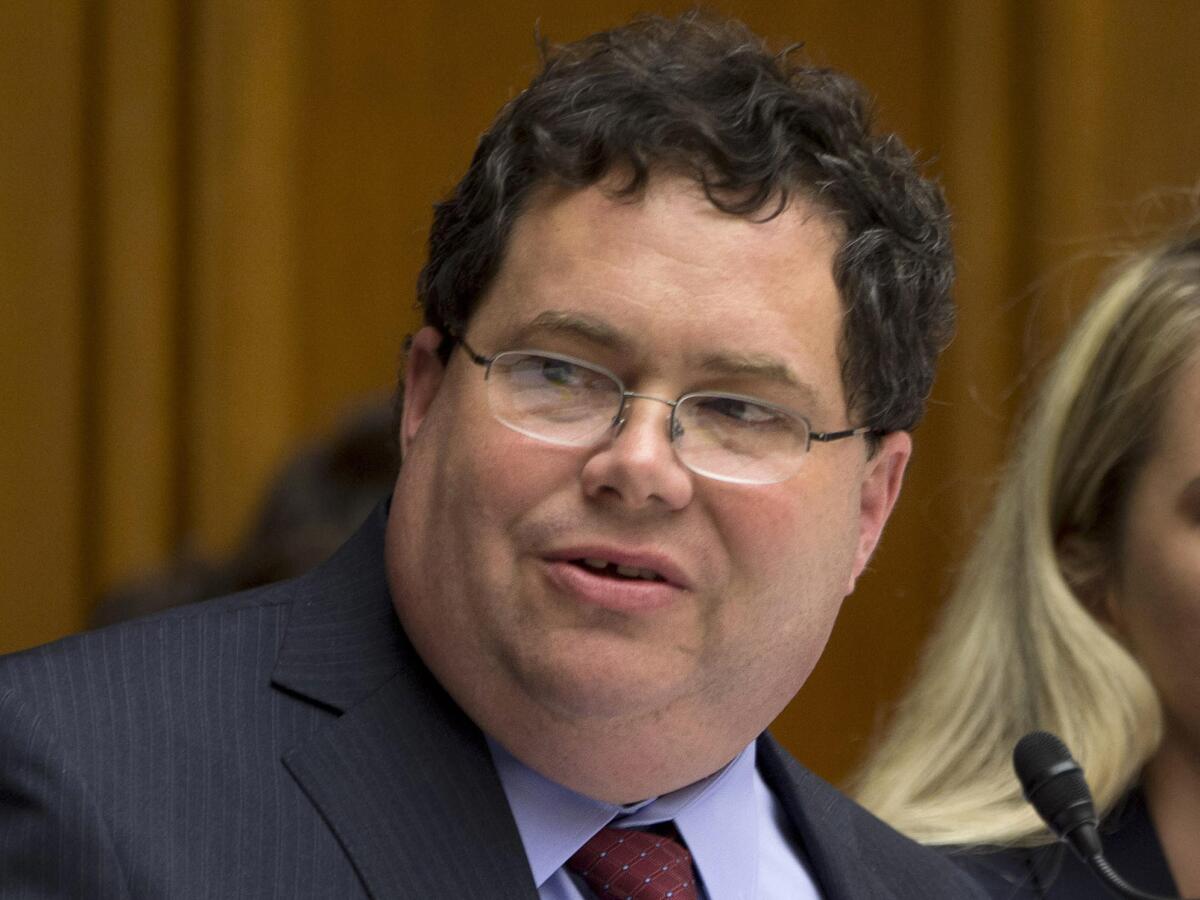
In addition to agreeing with Reed that Trump lacks understanding of the budget process, Collins engages in banter with him about Texas GOP Rep. Blake Farenthold. Last week, Farenthold told a radio host that he would love to challenge Collins and other female Republicans who opposed the GOP health bill to a duel.
“If it was a guy from South Texas, I might ask him to step outside and settle this Aaron Burr-style,” he said.
On Tuesday, Collins referred to the incident with a laugh.
“Do you know why he challenged you to a duel? ‘Cause you could beat the [expletive] out of him,” said Reed.
“He’s huge,” Collins replies. “...I don’t mean to be unkind, but he’s so unattractive it’s unbelievable.”
In the same email that clarified her “worried” comments, Collins’ office tried to make peace with Farenthold, with a statement from Collins.
“Neither weapons nor inappropriate words are the right way to resolve legislative disputes,” she said. “I received a handwritten apology from Rep. Farenthold late this morning. I accept his apology, and I offer him mine.”
- Share via
With Sessions’ job security uncertain, some conservatives question Trump’s criticism

He was among President Trump’s earliest supporters, but now it appears U.S. Atty. Gen. Jeff Sessions is headed for the exit.
In recent days, Trump has criticized Sessions on Twitter and during interviews for recusing himself from any investigation into possible collusion last year between Trump’s presidential campaign and Russia.
While Trump throws jabs at Sessions, not everyone in conservative media is on board. Here are some story lines:
Is Trump eyeing Rudy to replace “beleaguered AG” Sessions? (Rush Limbaugh)
Sessions, then a U.S. senator from Alabama, was the first in the chamber to endorse Trump during the 2016 campaign.
Right-wing radio host Rush Limbaugh homes in on this loyalty and expresses some reservations about Trump’s anger with Sessions.
“Sessions is a by-the-book attorney general, a by-the-book legal mind. That’s, I think, one of the bones of contention here, because it is arguable that he didn’t need to recuse himself,” Limbaugh said on his radio show.
Limbaugh added it’s “a little bit discomforting, unseemly for Trump to go after such a loyal supporter this way.”
Some reports, which Limbaugh notes, have pegged former New York Mayor Rudolph W. Giuliani as a possible successor to Sessions.
Trump has himself, not Sessions, to blame for the limitless special prosecutor investigation (National Review)
In this piece, Andrew C. McCarthy writes that Trump must blame himself for his woes with the Russia investigation — not Sessions.
“President Trump accomplished only one thing by railing at Atty. Gen. Sessions: He added to the growing disinclination of quality people to work in his administration,” he writes. “No one with self-respect wants to work in a place where the boss not only won’t back you up when the going gets tough, but will turn on you with a vengeance — especially when there’s a need to divert attention from his own shortcomings.”
Jeff Sessions is indeed on the way out (American Spectator)
The public criticism from Trump has baffled many conservatives.
Arnold Steinberg writes that Sessions deserves more respect.
“I myself have had occasion to relieve people of their responsibilities, that is, to fire them. But I would treat those people with respect and courtesy and surely not criticize them in semi-public or, worse, in a public situation,” Steinberg writes.
He adds: “The fact that Jeff Sessions was the first major political figure to endorse Donald Trump early in the primary season entitled (and entitles) him, at the least, to respectful consideration and professional courtesy by the administration.”
- Share via
Watch live: Senate to vote on first step toward Obamacare repeal
- Share via
Senate healthcare vote presents critical test for GOP and Trump
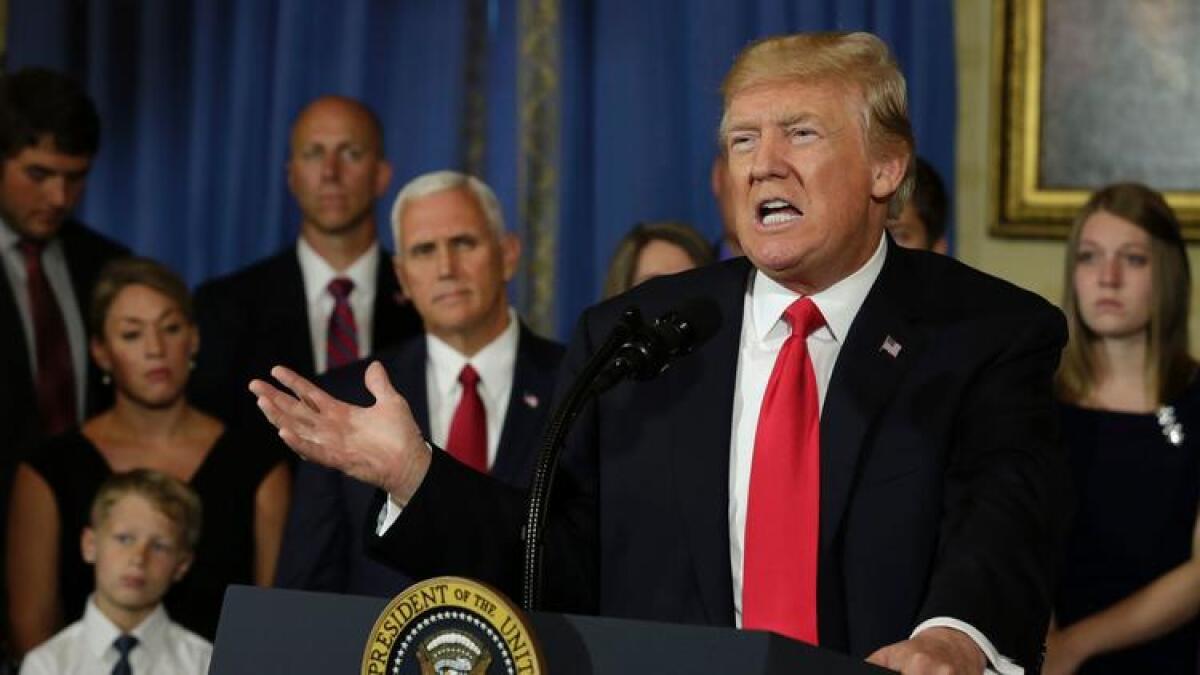
With a strong, last-minute push from President Trump, Senate Republicans face a pivotal vote Tuesday in their long bid to repeal or replace the Affordable Care Act.
But the outcome remained in doubt, largely because senators have not even been told which of the various GOP plans will be considered.
Many GOP senators remain reluctant to begin formal debate on legislation without knowing where the process will end.
Trump warned senators Monday that Tuesday’s planned “motion to proceed” — the first legislative hurdle to passing a Senate bill — could be Republicans’ “last chance” to undo the Affordable Care Act, also known as Obamacare.
He warned in a tweet that “the repercussions will be far greater than any of them understand!” — hinting of political fallout for senators who vote against the measure.
“For Senate Republicans this is their chance to keep their promise. Over and over again they said ‘repeal and replace, repeal and replace,’ ” he said. “There’s been enough talk and no action. Now is the time for action.”
For Trump, a failure Tuesday could expose the limits of his ability to implement his agenda, even with a GOP-controlled Congress.
“Any senator who votes against starting debate is telling America that you are fine with the Obamacare nightmare,” Trump said during an event at the White House.
- Share via
Senate Committee issues subpoena for Paul Manafort to testify
The Senate Judiciary Committee has subpoenaed Paul Manafort, the former Trump campaign manager, saying that negotiations for him to testify voluntarily had broken down.
Manafort, whose testimony has also been requested by the House and Senate Intelligence Committees, “through his attorney, said that he would be willing to provide only a single transcribed interview to Congress, which would not be available to the Judiciary Committee members or staff,” the Judiciary Committee chair, Sen. Chuck Grassley (R-Iowa) and its senior Democrat, Sen. Dianne Feinstein of California, said in a statement Tuesday morning.
The committee could not agree to that plan, the senators said.
The subpoena, issued Monday night, seeks to compel Manafort to appear at a hearing on Wednesday, although the statement left open the possibility that his testimony could be postponed to a later date.
Manafort could refuse to comply with the subpoena, in which case the committee could seek to hold him in contempt.
The Judiciary Committee has wanted Manafort to testify about how the government enforces the law that requires people who represent foreign governments and their agencies to register. The firm Manafort heads retroactively registered in June under the Foreign Agents Registration Act admitting that it had received some $17 million to represent the pro-Russian party that dominated Ukraine’s government until it was overthrown in 2014.
- Share via
The Kremlin did not order the meeting between a Russian banker and Kushner, says Putin spokesman
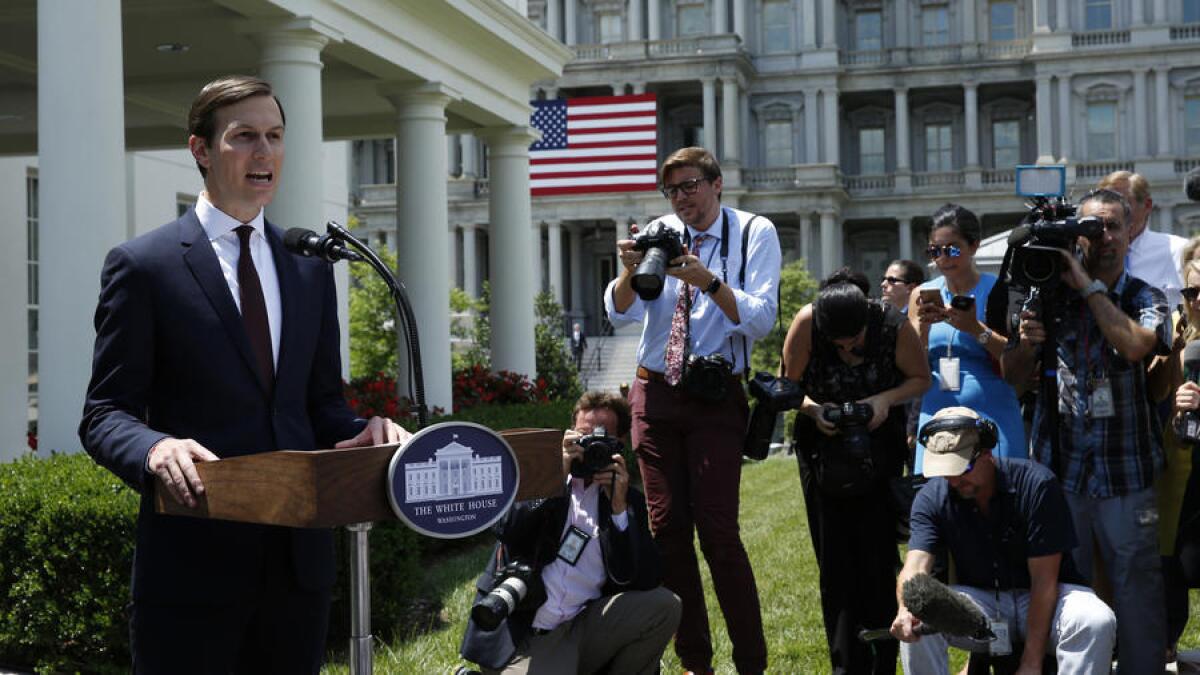
The Russian bank chairman with whom Jared Kushner said he met in December in the lead-up to President Trump’s inauguration did not do so under Kremlin orders, a spokesman for Russian President Vladimir Putin told reporters Tuesday.
Kushner, Trump’s son-in-law and senior advisor, disclosed during a Senate hearing Monday that he had met with Sergei Gorkov, the head of Russian state-owned Vnesheconombank, on Dec. 13. Kushner’s comments came as part of an ongoing congressional investigation into possible Kremlin meddling in the 2016 presidential election. The Kremlin has denied such interference.
Kushner said in his statement Monday the meeting was arranged at the suggestion of Sergei Kislyak, the outgoing Russian ambassador in Washington.
Vnesheconombank is a Russian development bank, and Gorkov was in the U.S. at the time of the meeting with Kushner for a routine roadshow. It’s “normal practice” for a senior banker to hold meetings with U.S. representatives, Peskov said during a conference call with reporters.
“These contacts do not require any authorization from the Kremlin, and they were not carried out on behalf of the Kremlin,” Peskov said.
- Share via
Trump accuses Jeff Sessions of taking a ‘very weak’ position on ‘Hillary Clinton crimes’
President Trump is keeping up pressure on Atty. Gen. Jeff Sessions, taking to Twitter at daybreak Tuesday to accuse the former senator and campaign ally and advisor of taking a “VERY weak” position at the Justice Department on “Hillary Clinton crimes.”
In a post shortly after 6 a.m. EDT, the president also said: “Ukrainian efforts to sabotage Trump campaign — quietly working to boost Clinton. So where is the investigation A.G.” He also tweeted: “Attorney General Jeff Sessions has taken a VERY weak position on Hillary Clinton crimes (where are E-mails & DNC server) & Intel leakers!”
The social network flares sent out from the White House followed a pattern that intensified earlier this month with Trump’s harsh criticism of Sessions in an interview with the New York Times. Earlier, Trump referred to the attorney general in a tweet as “beleaguered.” Trump has been angry that Sessions chose to recuse himself from the government’s investigation of Russian meddling in last year’s U.S. election.
- Share via
McCain says he’ll return to Senate for healthcare vote
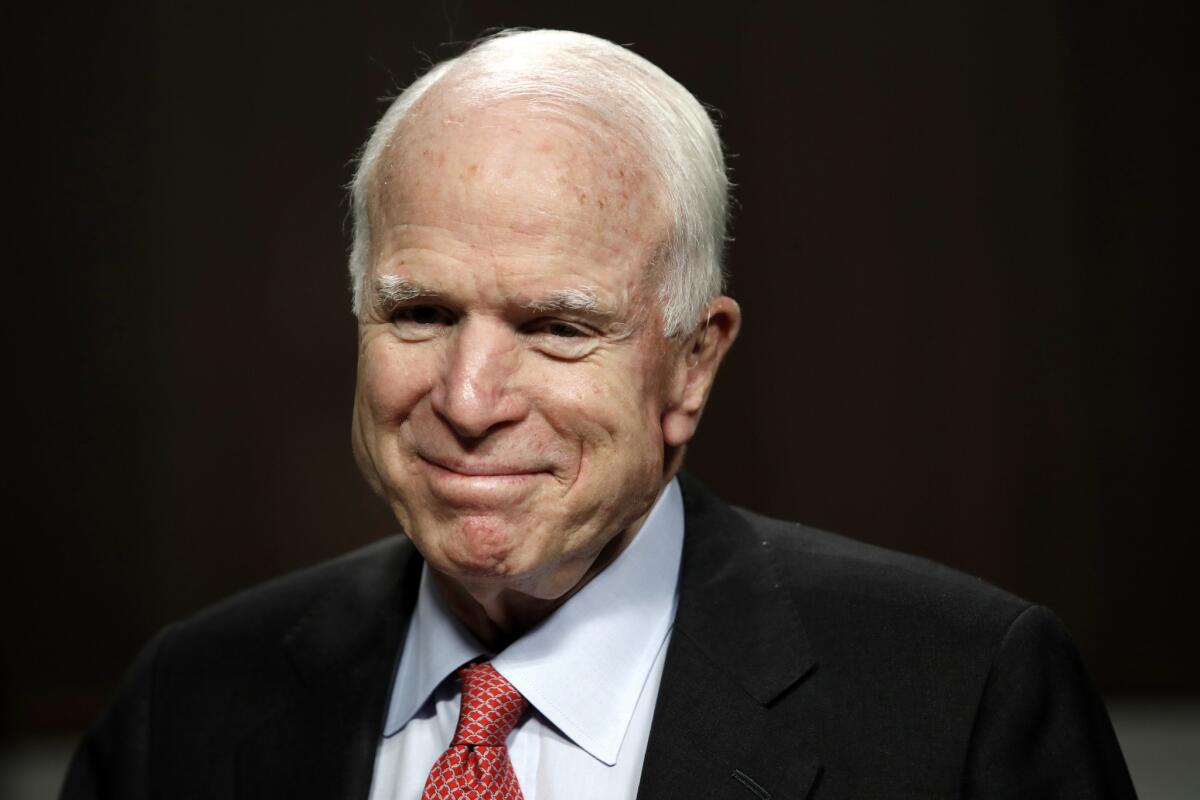
Sen. John McCain (R-Ariz.) is returning to the Senate on Tuesday to vote on GOP healthcare legislation just days after being diagnosed with a brain tumor.
McCain’s office made the dramatic announcement late Monday in a brief statement.
Senator McCain looks forward to returning to the United States Senate tomorrow to continue working on important legislation, including health care reform, the National Defense Authorization Act, and new sanctions on Russia, Iran and North Korea.
— Statement released by McCain’s office
Republicans are holding a high-stakes vote on Tuesday to open debate on legislation to repeal and replace the Affordable Care Act, also known as Obamacare.
They have almost no margin for error, making the presence of the 80-year-old McCain crucial if the vote is to succeed.
- Share via
Trump slams GOP senators, ‘dishonest’ press, Obama and Clinton in a rambling speech to national Boy Scouts Jamboree
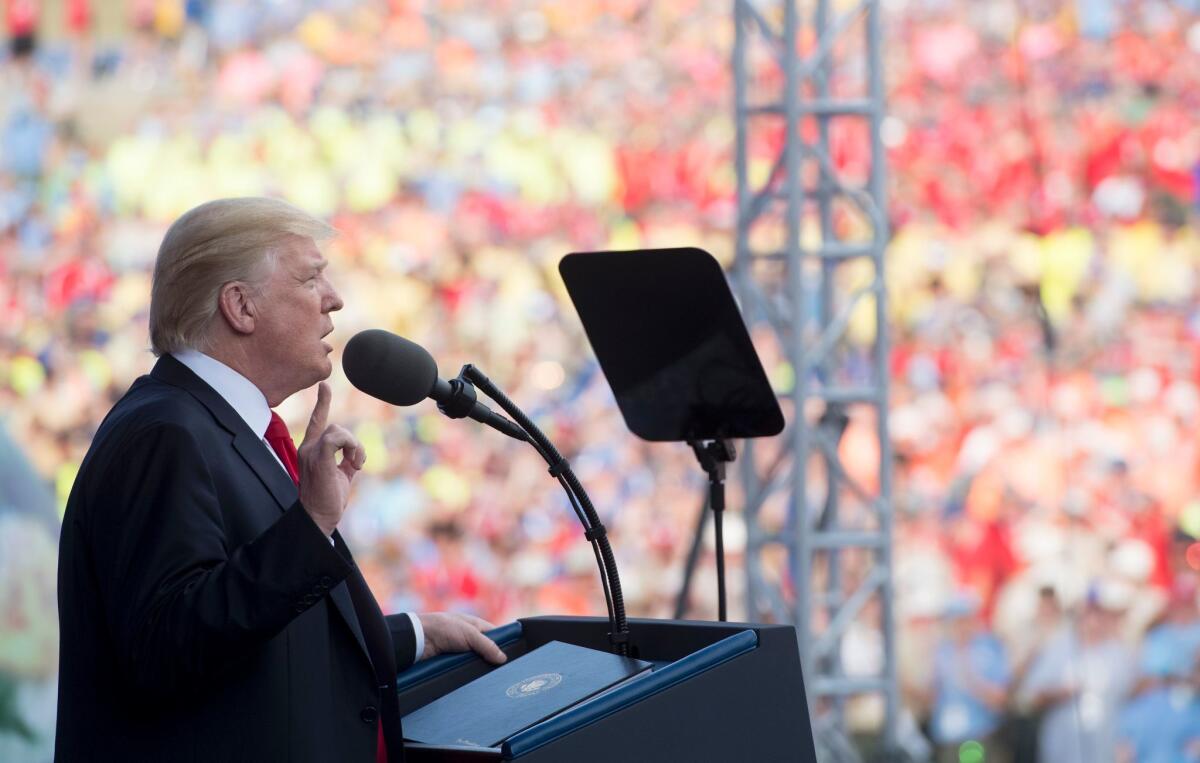
President Trump took jabs at Republican senators, “dishonest” reporters, his predecessor and his 2016 election rival in a rambling and surprisingly partisan speech before about 30,000 Boy Scouts and their troop leaders Monday evening in West Virginia.
In one aside during remarks to the National Scout Jamboree in Glen Jean, W.V., the president asked, “Who the hell wants to speak about politics when I’m in front of the Boy Scouts?” Yet he launched into an extended a critique of Washington politics.
That included jibes at senators in his own party -- including by name the home state senator, Shelley Moore Capito -- who have balked at ending the Affordable Care Act and replacing it with a still uncertain plan that would cut hundreds of billions of dollars from Medicaid.
“I go to Washington and I see all these politicians, and I see the swamp. In fact it’s not a good place -- we should change it from the swamp to the cesspool or perhaps use the word sewer,” he said.
Trump introduced several of his Cabinet members who had been Boy Scouts, including Interior Secretary Ryan Zinke, there in Scout uniform; Energy Secretary Rick Perry’ and Health and Human Services Secretary Tom Price.
Price, the president said, “is going to start our path toward killing this horrible thing known as Obamacare that’s really hurting us.”
“You going to get the votes?” Trump asked Price. “He better get them,” Trump told the enthusiastic youths. “Otherwise, I’m going to say, ‘Tom, you’re fired!’”
He added, “You’d better get Sen. Capito to vote for it.”
The Trump administration and Republican Senate leaders are pressing party colleagues to vote on Tuesday to allow debate on the House-passed healthcare measure so that they can then amend it with a different Senate version. They need at least 50 of the 52 Republican senators to consider the bill, a hurdle made more difficult with Sen. John McCain (R-Ariz.) undergoing treatment for a brain tumor.
Trump praised the Scouts for their pledges to be trustworthy and loyal, and encouraged them to “never quit” and to “do something you love.” But repeatedly he went off script to make political points.
“We could use some more loyalty, I could tell you that,” Trump said of Republicans in Congress. Within the first minute he attacked the press -- “fake news” -- twice and came back to the subject of “these dishonest people” later.
Of his predecessor, Trump interjected, “By the way, did President Obama ever come to a jamboree? The answer’s no.” When he vowed to kill Obamacare, the crowd chanted, “USA! USA!”
Trump criticized Democratic election opponent Hillary Clinton and recalled at length the surprise of his victory on Nov. 8, boasting of how red he’d made the TV networks’ maps of the states.
In one extended tangent that surely confused many Scouts, Trump described a long-ago cocktail party conversation with pioneering real estate developer William Levitt. Levitt was “a very successful man,” Trump told the Scouts, but sold his business and “lost his momentum.” Although Levitt is considered the architect of postwar American suburbia, he was also known for ensuring that properties were sold only to whites and non-Jews.
- Share via
Doubts on Atty. Gen. Sessions’ tenure deepen amid Trump tweets and White House comments
Atty. Gen. Jeff Sessions faced increasing questions about his future on Monday, a day that began with a fresh public slap from his boss, President Trump, and continued with new calls to testify about his conversations with the Russian ambassador last year.
Sessions, the first senator to endorse Trump and a strong influence during last year’s campaign, raised the president’s ire earlier this year with his decision to step aside from overseeing the investigation into Russian interference in the 2016 election and any possible cooperation by people associated with the Trump campaign.
Sessions acted on advice from the department’s ethics lawyers, who said he should not play a role in an investigation involving a campaign on which he worked. But in a startling interview with the New York Times last week, Trump said Sessions’ decision to recuse was unfair to him, and he made it clear that he blamed Sessions for the fact that he is now facing a widening special counsel investigation.
Since then, things have gotten worse for the attorney general.
On Monday morning, Trump tweeted that Sessions was “beleaguered” and questioned why the Justice Department wasn’t doing more to investigate Hillary Clinton’s dealings with Russia.
Later in the day, Trump’s new communications director, Anthony Scaramucci, did nothing to allay doubts about Sessions’ future, refusing to say in an interview whether Trump wants him to resign.
“They need to sit down face to face and have a reconciliation and a discussion of the future,” he said in an interview with CNN. “They need to speak and determine what the future of the relationship looks like.”
Sessions visited the White House on Monday, sparking a quick flurry of speculation that he was about to resign or be fired.
But Justice Department spokesperson Sarah Isgur Flores said Sessions was there for a standing Monday lunch meeting with White House Counsel Donald McGahn. The attorney general had a discussion with McGahn and Tom Price, the Health and Human Services secretary, she said.
Sessions did not see Trump, she said, and no meeting with the president has been scheduled.
Sessions said last week that he has no plans to step down, saying he loved his job and would stay as long as it was “appropriate.” Flores said Monday that hasn’t changed. She had no comment on Scaramucci’s interview or on Trump’s “beleaguered” comment.
- Share via
Trump takes aim at Senate Republicans on healthcare
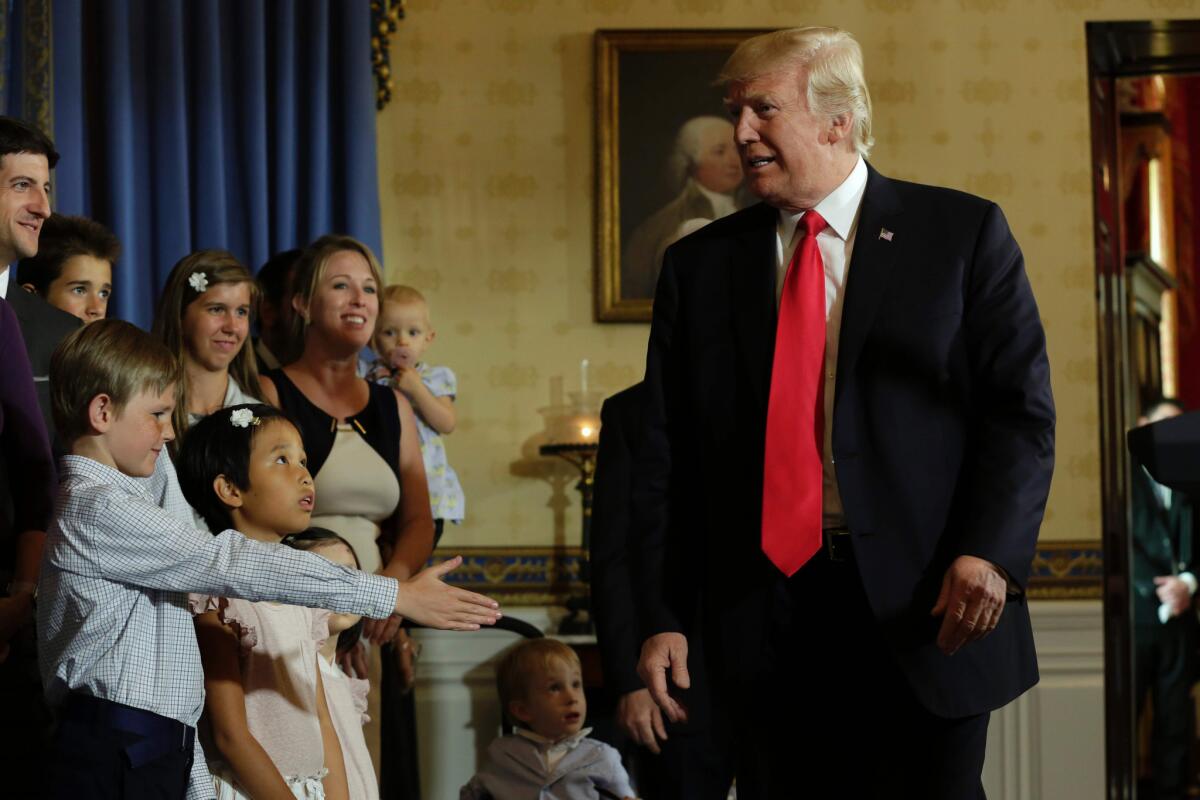
President Trump made a late-hour attempt to pressure Republican senators to act this week to repeal and replace the Affordable Care Act, commonly known as Obamacare.
“For Senate Republicans, this is the time to keep their promise. So many times they said, ‘repeal and replace,’” Trump said at a White House event carried live on cable television news channels, with people he said were “victims of Obamacare” arrayed behind him.
It was an unusual pitch, as a sitting president used the presidential bully pulpit to take his own party to task, at one point in mocking tones.
Republican Senate leaders are pressing party colleagues to vote on Tuesday to allow debate on the House-passed healthcare measure, so they can then amend it with a different Senate version. They need at least 50 of the 52 Republican senators to consider the bill, a hurdle made more difficult with Sen. John McCain (R-Ariz.) undergoing treatment for a brain tumor.
“Any senator that votes against starting debate is saying they are fine with the Obamacare nightmare, which is what it is,” Trump said.
The president stood in front of families he said had been hurt by increased premiums under the Affordable Care Act and by insurance companies withdrawing from state healthcare exchanges, and he condemned the existing program at length. But he made little affirmative case for a Republican alternative.
Trump said Democrats have provided “zero help” to come up with a solution to problems in the exchanges.
He called Democrats “obstructionists” but also focused his fire on Republicans. “There’s been more than enough talk and no action. Now is the time for action,” he said.
- Share via
‘I had no improper contacts,’ Kushner says after speaking to senators about Russia and election meddling
President Trump’s son-in-law and senior advisor Jared Kushner said Monday he “did not collude” with Russia and doesn’t know of “anyone else in the campaign” who did.
Kushner, in a rare appearance before reporters at the White House, spoke within an hour of being interviewed behind closed doors on Capitol Hill by staff investigators of the Senate Intelligence Committee, which is looking into Russia’s meddling in the election and possible Trump campaign collusion.
“Let me be very clear: I did not collude with Russia, nor do I know of anyone else in the campaign who did so,” Kushner said, reading from a prepared statement.
“I had no improper contacts. I have not relied on Russian funds for my businesses and I have been fully transparent in providing all requested information,” he added.
Kushner is to meet with both members and staff of the House Intelligence Committee on Tuesday. His brief comments about his Senate session mostly repeated what he wrote in an 11-page statement he publicly released in advance of Monday’s questioning.
That statement was Kushner’s account of his contacts with Russians during the campaign and Trump’s post-election transition. He described four meetings with Russian nationals. Two of those were with Russia’s ambassador to the U.S. at the time, Sergey Kislyak.
Kushner initially did not disclose the meetings as required on forms he submitted to get a government security clearance for his White House job. He has since revised those forms several times.
In his comments outside the West Wing, Kushner added a political note, echoing his father-in-law in insisting that Trump won the election because of his appeal to voters, not because of help from any foreign government.
“Donald Trump has a better message and ran a better campaign and that is why he won,” Kushner said. “Suggesting otherwise ridicules those who voted for him.”
Officials frequently speak to reporters on camera from just outside the West Wing doors, but the White House provided an unusual bit of stagecraft for the presidential son-in-law. Kushner spoke at a lectern that had been set up with a White House seal affixed.
After reading his prepared remarks, Kushner turned stiffly and walked back into the West Wing. He did not respond to questions shouted by reporters behind him.
Since the first questions were raised in March, I have been consistent in saying that I was eager to share any information I have with the investigating bodies and I have done so today. The record and documents I have voluntarily provided will show that all of my actions were proper and occurred in the normal course of events of a unique campaign. Let me be very clear: I did not collude with Russia, nor do I know of anyone else in the campaign who did so. I had no improper contacts. I have not relied on Russian funds for my businesses and I have been fully transparent in providing all requested information.
— Jared Kushner, senior advisor and son-in-law to Trump
- Share via
Watch live: Jared Kushner to give a statement following hearing on Russia
Jared Kushner, Trump’s son-in-law and senior advisor, will give a statement at 10:15 a.m. following a closed session hearing with investigators and Senate Intelligence Committee members over Russian meddling in the election.
Early Monday, ahead of the hearing, Kushner’s representatives released an 11-page statement in which he described four meetings he had with Russians, including two with Ambassador Sergei Kislyak. He confirmed a report first published in the Washington Post that at a meeting in December, he had inquired about using a secure communications line at the Russian embassy to conduct talks with Russian officials.
Kushner did not initially disclose any meetings with Russians on forms he submitted to get a government security clearance. He has since revised those forms several times.
- Share via
Democrats unveil ‘Better Deal’ agenda as party tries to retake Trump’s mantle on jobs, economy
Congressional Democrats launched a progressive-leaning economic agenda Monday as they try to wrestle the populist mantle from President Trump ahead of the 2018 midterm election.
Leaders of the House and Senate -- along with top lawmakers, including Sen. Elizabeth Warren (D-Mass.) -- believe their “Better Deal” platform of higher wages, child care support and job training will appeal to working families and those who abandoned the party last year to elect Trump.
“In the last two elections, Democrats, including in the Senate, failed to articulate a strong, bold economic program for the middle class and those working hard to get there,” wrote Senate Minority Leader Charles E. Schumer (D-N.Y.) in an op-ed in the New York Times.
“We also failed to communicate our values to show that we were on the side of working people, not the special interests. We will not repeat the same mistake. This is the start of a new vision for the party.”
House Minority Leader Nancy Pelosi pointed her criticism at Trump and Republicans, who control both the House and Senate, for spending their first six months of GOP control “trying to raise Americans’ health costs to fund tax breaks for billionaires.”
“Democrats have a better approach,” she wrote in the Washington Post.
Democrats headed to rural Berryville, Va., which is just the kind of outside-the-Beltway swing district, now held by Republican Rep. Barbara Comstock, that Democrats hope to flip in the 2018 midterm.
Democrats need to pick up 24 seats to control the House, which some analysts believe is possible because the party in the White House tends to lose as many seats in midterm elections.
The “Better Deal” agenda is filled with the kind of populist rhetoric championed by Trump -- and progressive favorites Warren and Sen. Bernie Sanders (I-Vt.) -- as it promises policies that aim to appeal to voter unrest over corporate “monopolies” and the “rigged” economy. It promises a government “on the sides of all Americans, not just those at the top.”
As the minority party, the plan is merely a blueprint for future governing, rather than a legislative to-do list.
Republicans, under Speaker Paul D. Ryan, presented a similar document last year -- “A Better Way” -- that was an aspirational check list of legislative goals to accomplish if in power.
Passing bills is a heavier political lift, but both parties use such documents as calling cards in the run up to the campaigns ahead.
“The feeling is that this is what we should be talking about,” said Rep. Cheri Bustos (D-Ill.), part of the team that helped draft the document.
Bustos is that rare Democrat, among 12 in the House, who represents a district where voters elected Trump but also gave the Democrat another term in Congress.
“They feel like folks in Washington see this whole thing as a game -- winners and losers -- at the expense of people back home,” she said in an interview. “People have the feeling that things are stacked against them.”
She added: “It’s our message to build an America where working people know we have their back.”
- Share via
‘I did not collude’ with foreign officials, Jared Kushner says in advance of testimony

“I did not collude” and “had no improper contacts” with Russia or any other foreign government, Jared Kushner, the president’s son-in-law and senior advisor, declared Monday.
Kushner’s representatives released the statement early Monday morning. Later in the day, he met with investigators and members of the Senate Intelligence Committee.
In the statement, Kushner described four meetings he had with Russians, including two with Ambassador Sergei Kislyak. He confirmed a report first published in the Washington Post that at a meeting in December, he had inquired about using a secure communications line at the Russian embassy to conduct talks with Russian officials.
Kushner did not initially disclose any meetings with Russians on forms he submitted to get a government security clearance. He has since revised those forms several times.
According to Kushner, the topic of secure communications came up after Kislyak asked if there was a secure line in the Trump transition office for a discussion about Syria between Trump transition officials and Russian generals.
Kushner said he suggested using a communications channel at the Russian embassy, but he denied the suggestion that he was trying to set up a secret back channel for communications between Trump advisors and the Kremlin.
Kushner did not say why he would not have used U.S. government secure communications for the discussion Kislyak wanted to have.
After Kislyak said using embassy facilities was not possible, they agreed to follow up after the inauguration, Kushner said.
“Nothing else occurred. I did not suggest a ‘secret back channel.’ I did not suggest an ongoing secret form of communication for then or for when the administration took office,” Kushner said.
He did not discuss lifting U.S. sanctions on Russia with Kislyak, Kushner added.
“I did not raise the possibility of using the embassy or any other Russian facility for any purpose other than this one possible conversation in the transition period. We did not discuss sanctions.”
Kushner said he also did not discuss sanctions at a Dec. 13 meeting with Sergey Gorkov, the head of Russian state-owned Vnesheconombank. He had the meeting at Kislyak’s urging because Gorkov had a “direct relationship” with Russian President Vladimir Putin, he said.
“I did not know or have any contact with Mr. Gorkov before that meeting, and I have had no reason to connect with him since,” Kushner wrote.
Kushner also said he had not “relied on Russian funds” to finance his real estate business.
“I had no improper contacts. I have not relied on Russian funds to finance my business activities in the private sector,” he said.
Later this week, Kushner is scheduled to meet with the House Intelligence Committee. Both panels are investigating Russian actions to sway the 2016 election in Donald Trump’s favor and whether any people associated with the Trump campaign cooperated in that effort.
The Senate panel plans two days of closed-door questioning of Kushner as part of its investigation.
Separately, Donald Trump Jr. and Paul Manafort are expected to be interviewed by investigators for the Senate Judiciary Committee, which is conducting its own probe. Those meetings will be behind closed doors, but the two are expected to testify publicly at some point, Judiciary Chairman Sen. Chuck Grassley of Iowa said last week.
Kushner also described a June 9, 2016, meeting with a Russian lawyer who claimed to have information damaging to Hillary Clinton.
The session was a “waste of our time,” he said. No information about Clinton or the Democrats was discussed during the part of the meeting he attended, Kushner said, although he said he arrived late and left early.
Kushner said he knew nothing about the purpose of the meeting to which he had been invited by Trump Jr., his brother-in-law.
He said he did not read the lengthy email chain that Trump Jr. forwarded to him before the meeting. In those emails, the friend of Trump Jr.’s who set up the meeting said a Russian lawyer would deliver derogatory information about Clinton as part of Russia’s efforts to help Trump.
Once he arrived at the meeting and determined it was a poor use of his time, he sent a message to an assistant asking that someone call him on his cell phone to give him an excuse to leave, Kushner said.
He only became aware of the emails in recent weeks when his lawyers found them while going through his records, he said.
“No part of the meeting I attended included anything about the campaign, there was no follow up to the meeting that I am aware of, I do not recall how many people were there (or their names), and I have no knowledge of any documents being offered or accepted,” he wrote.
In addition to that meeting and the two in December, Kushner, who is married to Trump’s daughter, Ivanka, said he had only one other meeting with a Russian during the campaign or transition. That was a brief encounter with Kislyakat a reception in the spring of 2016.
The meeting was so unmemorable, he said, that after the election, when Trump received a congratulatory message from Russian President Vladimir Putin, and Kushner was asked to authenticate it, he had to ask someone to remind him of the ambassador’s name.
He disputed a report by the Reuters news agency that he had two telephone calls with Kislyak, saying he had no recollection of that, and his lawyers had found no record of such calls.
Kushner also offered an explanation for having initially submitted a federal form for a security clearance that did not report his meetings with Russians or other foreigners, something the form specifically asks for.
He said his assistant had misunderstood a message from other staff members and had believed the form was complete when it was still just a draft. The assistant submitted the form, known as an SF-86, erroneously, he said, adding that his office had submitted updated information detailing his foreign contacts before that became the subject of news reports.
9:25 a.m.: This post was updated with Kushner’s arrival to meet with senators and with additional information.
- Share via
Trump still harbors doubts about Russian hacking, new White House communications director says
President Trump still isn’t convinced that Russia meddled in last year’s presidential election, his new communications director says, despite the conclusions of the FBI and U.S. intelligence agencies.
Anthony Scaramucci said on CNN’s “State of the Union” that an unidentified person had recently told him that if the Kremlin had in fact interfered, the United States would not have been able to detect the activity.
Pressed as to the identity of the person holding that opinion, Scaramucci said it was Trump.
“He called me from Air Force One,” said Scaramucci. “And he basically said to me, ‘Hey, you know, this is — maybe they did it. Maybe they didn’t do it.’”
The U.S. intelligence community stated definitively in January that Russia was behind attempts to hack Democratic Party emails and influence the election in Trump’s favor.
Whether his campaign aides colluded in that effort is the subject of a widening criminal investigation by the special counsel, Robert S. Mueller III, as well as multiple inquiries in Congress.
Scaramucci, a former Wall Street hedge fund magnate who was named to Trump’s staff on Friday, said he has not yet obtained a security clearance to see classified information.
He said if he sees information in the future that convinced him that Russia had meddled in the election, he would not hesitate to tell the president.
In a series of Sunday talk show appearances, Scaramucci was also asked if Trump might pardon himself and family members and other associates if they were suspected of or found to have taken part in illegal activities. The president raised the issue Saturday in a statement on Twitter that he had an absolute right to issue pardons.
Asked on CNN if Trump was thinking of pardoning himself, Scaramucci called that a “another one of those stupid hypotheticals.”
“He’s not going to have to pardon himself because he’s done absolutely nothing wrong,” he said.
A senior member of Trump’s personal legal team, Jay Sekulow, made a similar assertion.
Sekulow, interviewed on ABC’s “This Week,” said the issue of a presidential self-pardon has “never been adjudicated” in court because no president has ever issued one.
But he said that was irrelevant.
“Pardons are not on the table … there’s nothing to pardon from,” he said.
- Share via
Russia, Iran sanctions deal is said to clear way for House vote
Republican and Democratic leaders in the House appear to have reached a deal on a bill that would sharply limit President Trump’s ability to suspend or terminate sanctions on Russia.
If the bill ultimately passes, Trump would face a difficult choice — whether to veto a bill and fuel concerns that he is aiding Russian President Vladimir Putin while the FBI is investigating allegations of collusion with Moscow, or sign legislation that his administration strongly opposes.
The agreement to fix procedural concerns, add sanctions against North Korea and modify restrictions on the participation of U.S. energy companies in some international projects, clears the way for a House vote next week.
A version of the bill released by House Republican leaders follows passage of a Senate bill in June that would prohibit U.S. businesses from working on or supporting energy projects that include any participation by Russian companies, even outside Russia’s borders.
The House version would set a threshold for Russian involvement, applying that restriction to projects where sanctioned Russian entities have at least a 33% interest.
Sen. Ben Cardin of Maryland, the top Democrat on the Senate Foreign Relations Committee, said the revised legislation was “the product of intense negotiations.”
With the changes, “a nearly united Congress is poised to send [Russian] President Putin a clear message on behalf of the American people and our allies, and we need President Trump to help us deliver that message,” Cardin said in a statement.
The legislation follows U.S. intelligence agencies’ assessments that Russia sought to influence the U.S. presidential election last year and tilt it toward Trump.
A special counsel and several congressional committees are investigating whether there was any collusion with Trump’s campaign.
The measure gained urgency as evidence emerged in recent weeks that members of Trump’s family and several top aides were in contact with Russians during the campaign last year.
White House officials asked lawmakers this month to reconsider the Russia provisions that the Senate added to an Iran sanctions bill that passed 98-2.
The new version also will include sanctions against North Korea, modeled after language that passed the House 419-1 in May and hasn’t been taken up by the Senate.
If the House passes the modified sanctions package, the Senate will have to hold another vote on the legislation that would now punish North Korea, Iran and Russia.
- Share via
Could Trump pardon himself? No president ever has, and legal opinions are mixed
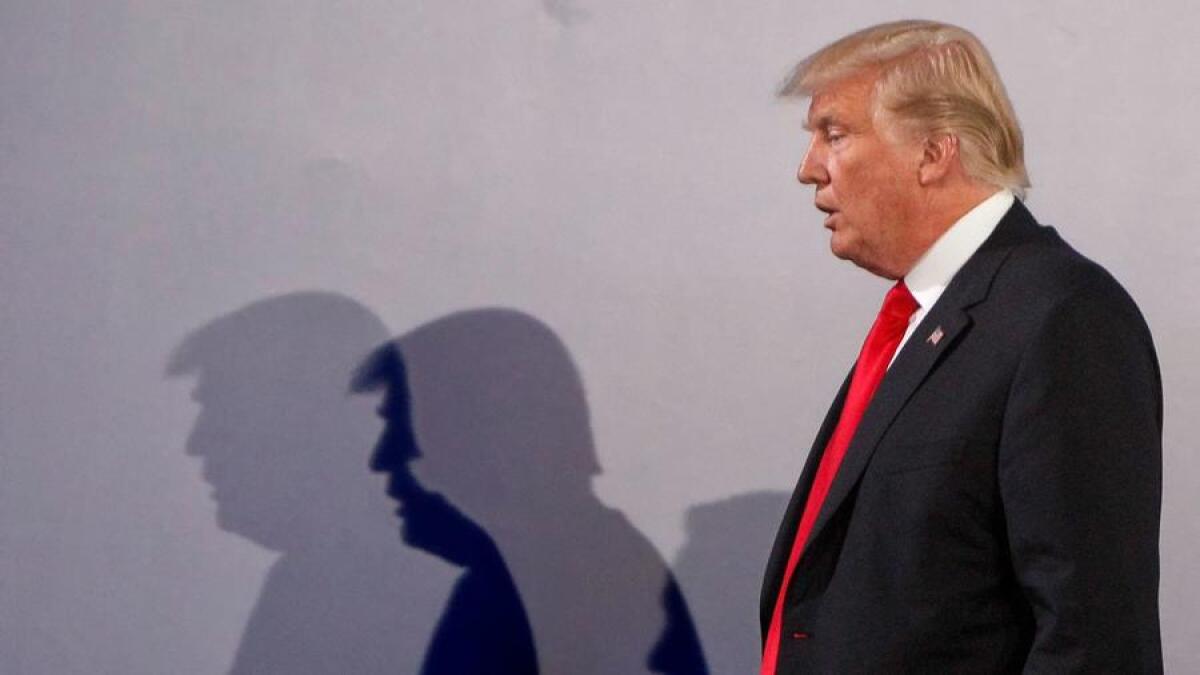
It’s not rare for presidents to dole out pardons. They’ve pardoned friends and felons, political donors and even a former president.
But can a president pardon himself? Well, we’ve now reached that question, six months into President Trump’s administration.
As a special counsel’s investigation into possible collusion between Trump’s presidential campaign and Russia continues, reports have surfaced in recent days that the president has inquired about pardoning family members and even whether he can give himself a pardon. Trump, in a report first published by the Washington Post, has questioned aides about the scope of his pardoning powers.
But could this happen? Here are some answers:
- Share via
Trump tweets that the president ‘has complete power to pardon’
President Trump, in one of a long string of Saturday morning tweets venting various frustrations, confirmed that he is pondering presidential pardons related to the probe into his campaign’s potential collusion with Russia.
In the tweet, Trump said a president “has complete power to pardon,” suggesting he believes he can pardon himself, or is at least not ruling it out.
There are mixed opinions as to whether the law would allow him to pardon himself.
But, he added, “why think of that when only crime so far is LEAKS against us,” using all caps a second time to complain about “FAKE NEWS.”
In claiming not to be thinking about pardons, Trump revealed that he does indeed have them on his mind. The Washington Post reported Thursday that Trump has discussed pardons of close associates, and even himself, with staff in recent days.
Trump’s tweets underscored his growing concern about the Russia investigation and frustration with the media that is reporting it.
Trump also complained that Atty. Gen. Jeff Sessions and Robert Mueller, the special counsel looking into Russian election meddling, are not investigating Hillary Clinton and James Comey, whom Trump fired as FBI director, and lambasted the Washington Post and New York Times.
It’s likely that the tweets were not vetted by his staff or attorneys. He misspelled counsel as “council.”
- Share via
No public testimony next week for Trump Jr. and Manafort
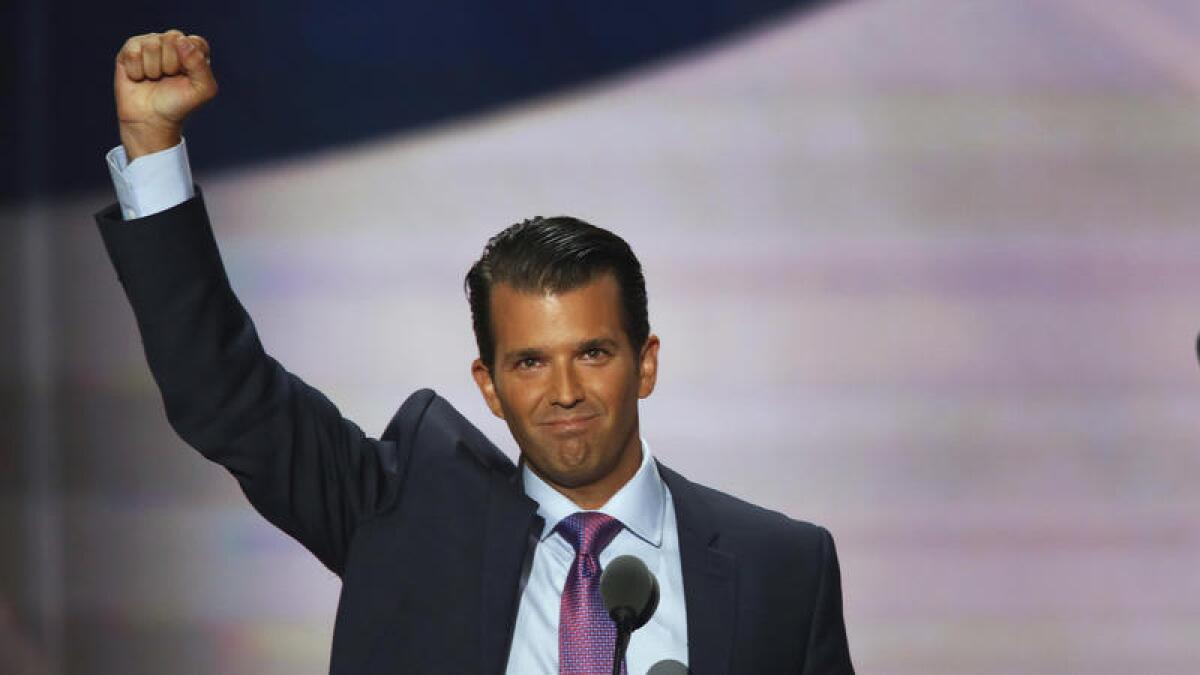
Donald Trump Jr. and Paul Manafort, the former Trump campaign manager, will not testify publicly next week under a deal worked out Friday with the Senate Judiciary Committee.
The two will meet with committee members and staff privately, the committee chairman, Sen. Chuck Grassley (R-Iowa), announced. Grassley said they were still expected to give public testimony later.
Grassley said that another witness, Glenn Simpson, the head of Fusion GPS, an investigative firm based in Washington, would be subpoenaed after declining to testify.
Simpson’s firm hired a former British spy, Christopher Steele, to look into reports that Russian intelligence held compromising information about Trump. Steele produced a lengthy dossier of reported kompromat, which became public shortly before Trump’s inauguration.
Trump has denied the accusations in the dossier.
Simpson’s attorney has said he would resist the subpoena, arguing that the committee’s questions would violate his client’s 1st Amendment rights as well as his 5th Amendment rights against self-incrimination.
- Share via
Pentagon holds back $50 million from Pakistan for not pursuing Taliban network
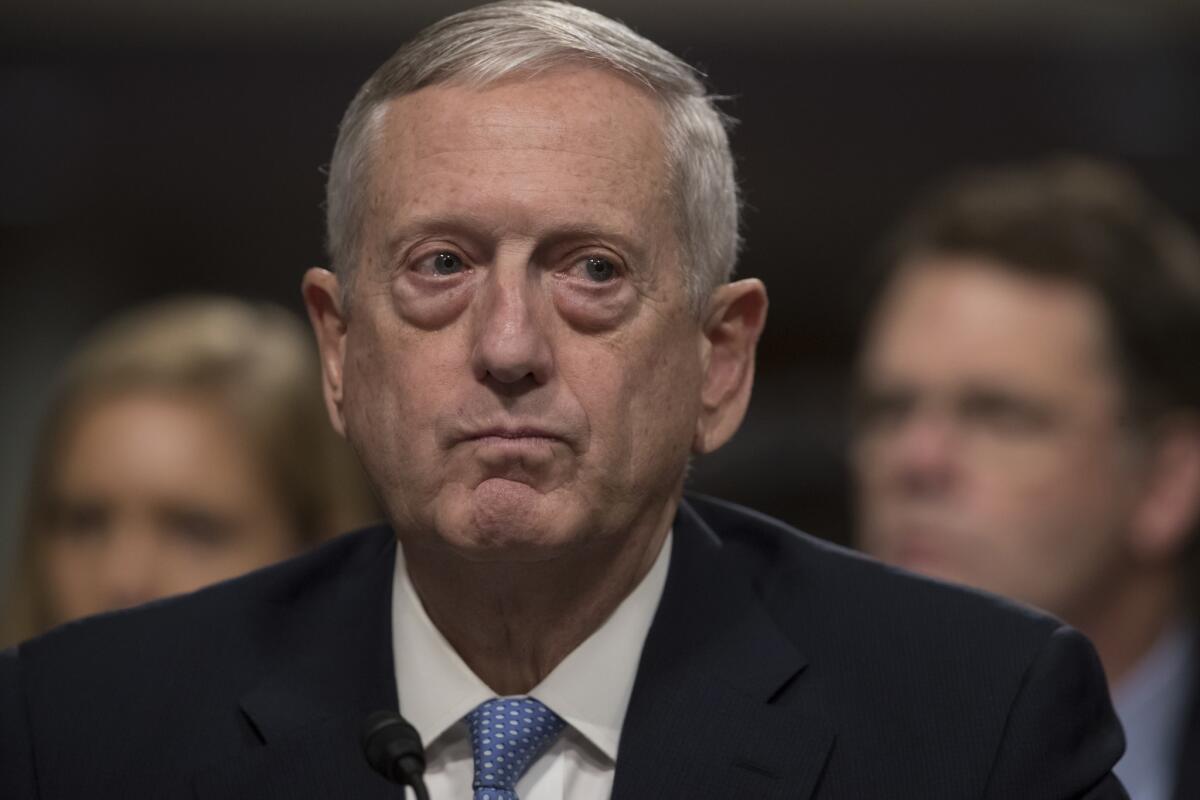
The Pentagon will withhold $50 million in reimbursements to Pakistan because it was unable to verify that Islamabad conducted adequate counter-terrorism operations against the Haqqani network, a hard-line branch of the Taliban, officials said Friday.
The decision comes as the Trump administration considers a tougher stance against Pakistan, an ostensible ally, as part of a new military strategy for the nearly 16-year-old war in neighboring Afghanistan.
Despite the $50-million cut, Pakistan received $550 million in U.S. aid in the last fiscal year for operations against militants in the Federally Administered Tribal Areas, or FATA, a rugged northwest region where the central government has limited control.
“This is simply an assessment on the current state of play,” Defense Secretary James Mattis told a Pentagon news conference. “We’re just defining the reality.”
Washington has urged Pakistan to step up counter-terrorism operations against the Haqqani network for more than a decade with limited success.
The militants use Pakistan’s rugged tribal regions as sanctuary to launch assaults on U.S. and allied troops battling Taliban fighters across the border in Afghanistan.
Under U.S. law, the secretary of Defense is required to certify that Pakistan has taken aggressive action against the Haqqani network. Last year, the Pentagon held back $300 million in funds for not pursuing the group.
The United States reimburses foreign governments for the cost of military operations against certain militant groups under a program called the Coalition Support Fund.
Pakistan has been the largest beneficiary, taking in more than $14 billion since 2002.
“Pakistan’s efforts have reduced the ability of some militant groups to use North Waziristan and the FATA as a safe haven for terrorism,” Pentagon spokesman Adam Stump said. “However, the Taliban and the Haqqani network continue to operate in other locations in Pakistan.”
Aizaz Ahmad Chaudhry, Pakistan’s ambassador in Washington, said in a statement that it “is a well-known fact that Pakistan’s counter-terrorism efforts have resulted in a significant decline in terrorists attacks.”
Without naming the Haqqani network, he pointed to Pakistan’s recent counter-terror operations aimed at routing militant groups from the tribal areas.
“Pakistan has been a victim of terrorism and has paid a staggering human and financial cost over the past decade,” he said.
U.S. relations with Pakistan have been fraught for years, and nose-dived after U.S. Navy Seals secretly flew into the country in 2011 and killed Al Qaeda founder Osama bin Laden at a compound in Abbottabad, a garrison town for the Pakistani military.
The Haqqanis have been a potent fighting force for years and U.S. officials believe they played a role in the Taliban’s recent resurgence in Afghanistan.
The Taliban holds more ground in Afghanistan today than at any point since the U.S.-led invasion in late 2001, according to recent U.N. estimates.
The Haqqani network dates back to the 1980s when Jalaluddin Haqqani organized fighters against Soviet troops that then occupied Afghanistan. He had links with Pakistani intelligence and the CIA, which both supported anti-Soviet militias.
Haqqani reportedly died in 2014, though it’s never been confirmed. His son Sirajuddin now leads the group.
The CIA launched thousands of drone strikes along the Afghan border in northwest Pakistan in the years after the 2001 terrorist attacks on New York and Washington.
U.S. officials believe those attacks killed numerous Haqqani leaders and forced its operatives into hiding, hampering the group’s ability to carry out attacks.
The CIA drone strikes, which were widely unpopular in Pakistan, largely stopped by late last year. They have resumed under President Trump as Afghanistan has suffered an alarming increase in terrorist attacks, especially in Kabul, the capital.
U.S. officials believe the Haqqanis were behind a massive bombing in Kabul that killed nearly 100 people in May. The group has not claimed responsibility, however.
- Share via
New White House communications chief thanks Sean Spicer, who quit over the appointment
I want to thank personally Sean Spicer, not only on behalf of myself, the president, the administration, but Sean is a true American patriot. He is a military serviceman. He’s got a great family, and he’s done an amazing job. This is obviously a difficult situation to be in, and I applaud his efforts here, and I love the guy and I wish him well. And I hope he goes on to make a tremendous amount of money.
— Anthony Scaramucci, Trump’s new communications director, whose appointment Sean Spicer reportedly resigned over
- Share via
Trump keeps focus on ‘fake’ news
- Share via
President Trump’s statement on Sean Spicer’s resignation
I am grateful for Sean’s work on behalf of my administration and the American people. I wish him continued success as he moves on to pursue new opportunities. Just look at his great television ratings. Sean will continue to serve the administration through August.
— Donald Trump
- Share via
The Sean Spicer show comes to an end
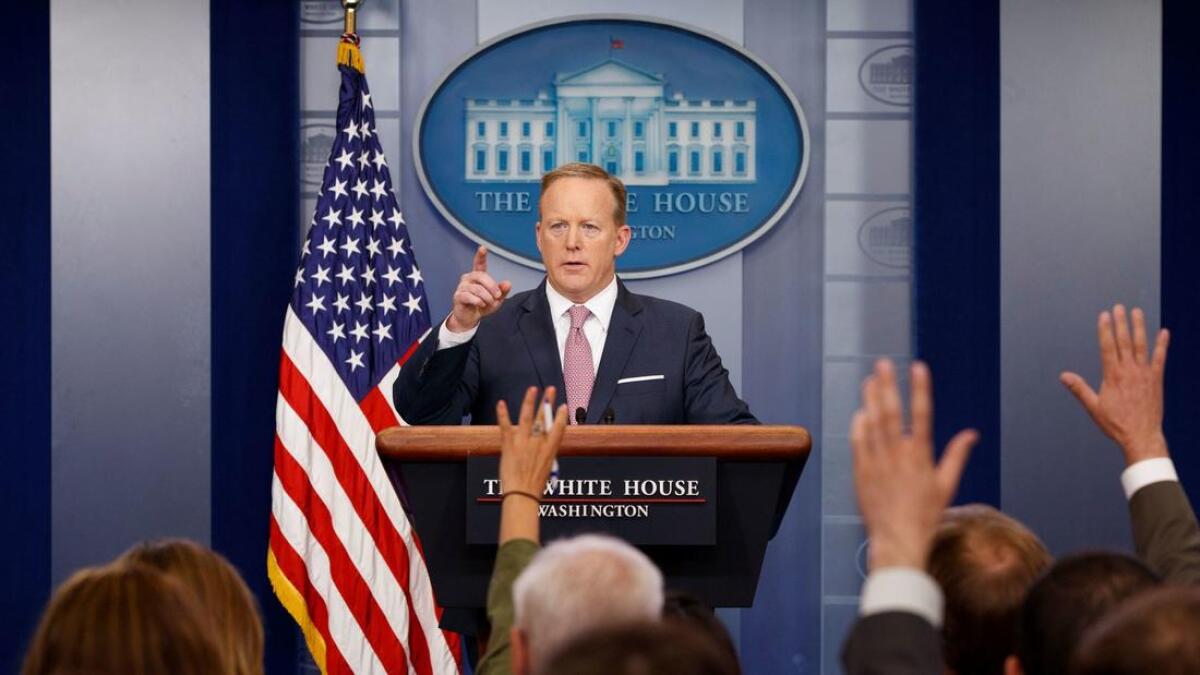
With White House press secretary Sean Spicer saying farewell, here’s a look back at his greatest hits (and misses).
- Share via
Sean Spicer out as White House press secretary
White House Press Secretary Sean Spicer has resigned, it was announced Friday.
The decision came after President Trump hired Anthony Scaramucci, a New York financier, as communications director.
In a Twitter statement, Spicer said he will leave the White House in August.
For months, Spicer’s daily news briefings were must-see television although he took on a more behind-the-scenes role in recent weeks. Deputy Press Secretary Sarah Huckabee Sanders has largely taken over the briefings, with most of them taking place off-camera.
Spicer hasn’t given a news briefing since June 23.
Trump has grown increasingly frustrated with his administration’s agenda being overshadowed by the FBI’s investigation into Russian meddling in the presidential election and what he sees as the inability of the White House communications team to counter the steady drip of damaging headlines linking his campaign to the Russian government.
In recent weeks, Spicer has born the brunt of the president’s ire. Trump has told close advisors that Spicer had been beaten into submission by the press, according to a person close to Trump, and was no longer able to punch back forcefully enough.
Those concerns came to a head this week, as Spicer continued to be absent from the podium, and Scaramucci’s name was floated as someone who could jab and parry more effectively with the media.
Spicer was an ally of White House Chief of Staff Reince Priebus for whom he worked when Priebus headed the Republican National Committee.
Trump has admired Scaramucci’s defense of him on television. But Preibus and White House strategist Steve Bannon were reported to have opposed Scaramucci’s appointment.
Spicer’s out. At least we have the memories
UPDATE
9:47 a.m.: This post was updated throughout with additional details and background.
- Share via
Watch live: Atty. Gen. Jeff Sessions discusses sanctuary city laws